- Meet the Team
- Work with Us
- Czech Republic
- Netherlands
- Switzerland
- Scandinavia
- Philippines
- South Korea
- New Zealand
- South Africa
- Budget Travel
- Work & Travel
- The Broke Backpacker Manifesto
- Travel Resources
- How to Travel on $10/day
Home » Oceania » New Zealand » Everything You Need to Know about Working Holidays in New Zealand | 2024

Everything You Need to Know about Working Holidays in New Zealand | 2024
Going on a working holiday is a special kind of experience. If you’re looking to escape the stale rat race of your regular job, and embark on long term travels, then you should totally consider a working holiday !
In my opinion, one of the best countries to explore through a work and travel arrangement is New Zealand! This absolute gem of a country is the perfect shake up that your life needs. Not only will you learn about the Kiwi’s wonderful work/life balance, but you will get to explore some of the world’s most stunning landscapes during your time off.
Do you want to explore Hobbiton one weekend and bungee jump over a lake the next? In New Zealand, that’s pretty standard, bro! There are also incredible multi-day treks you can take through some of the juiciest mountains known to Earth. And not to mention, Kiwis are some of the friendliest and most down to earth people you’ll ever meet – win, win!
You may ask – how do I plan for a working holiday in New Zealand? What visa do I get? Where in the country do I go? And who will look after my dog?!
Ok, I can’t tell you who will look after your dog.. but I can give you insights on all the other logistics! In this post I’m going to tell you all my tips and tricks for organising a DIY working holiday adventure – and also about the necessary visas and such!
I will also gently yell at you to get a working holiday visa for New Zealand ! A lifetime worth of memories awaits.

Unlock Our GREATEST Travel Secrets!
Sign up for our newsletter and get the best travel tips delivered right to your inbox.
Taking a Working Holiday in New Zealand
Top 5 tips for a working holiday in new zealand, new zealand working holiday visas , insurance for a working holiday in new zealand , working holiday in new zealand budget, earning money on a working holiday visa, pre-planned working holidays with global work and travel, diy working holiday in new zealand, final thoughts on a working holiday in new zealand.
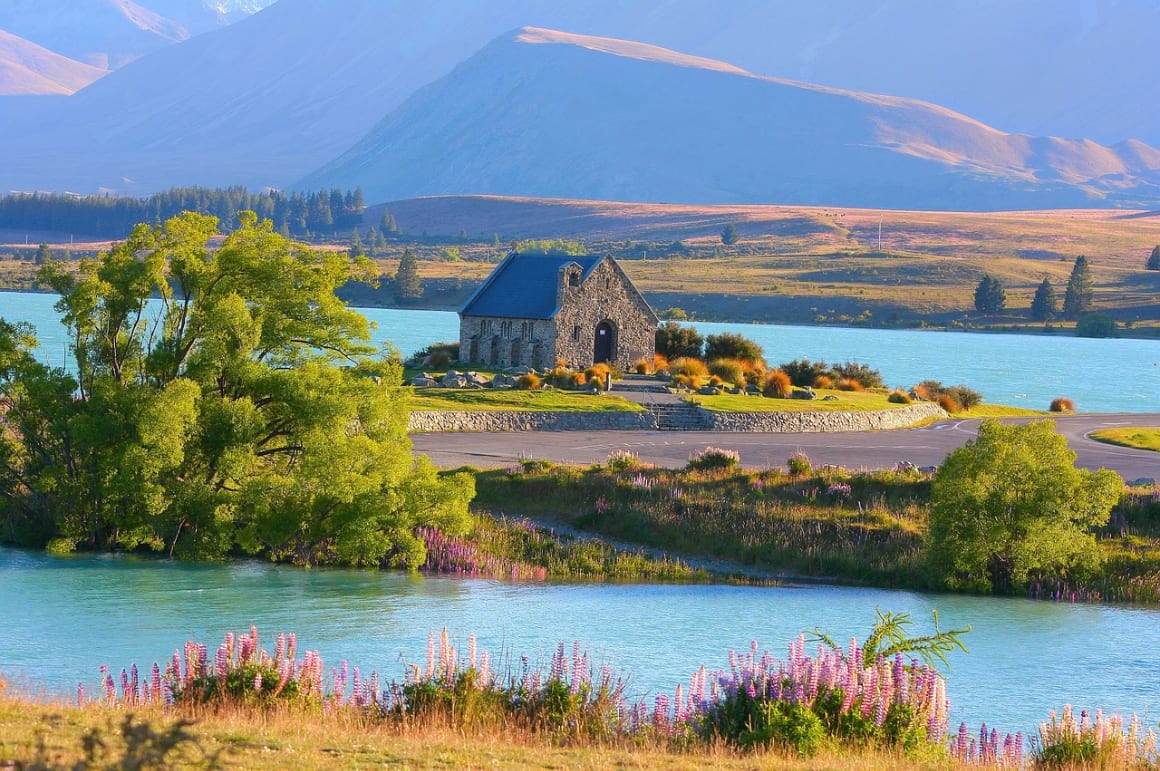
The Broke Backpacker is supported by you . Clicking through our links may earn us a small affiliate commission, and that's what allows us to keep producing free content 🙂 Learn more .
Anyone who is looking to take a career break, go on a grown-up gap year , or wanting to travel without a dime to their name should consider going on a working holiday.
New Zealand is the land of working hard and playing harder . However you stack your cash while traveling, it’s the life that happens around work that you will remember for years to come. This magnificent country has SO MUCH to explore and adventure, the moments of working will only make up a small percentage of your time. And you can always consider backpacking New Zealand once your employment is up to see even more of it!
When the workday is done there is no more vegging out and watching Netflix. Instead, there are whole new cities to discover, and fresh surfing trips to plan! With a working holiday in New Zealand, you get to try on a whole other way of living, and who knows? Maybe you’ll even fall in love with it…
Not to mention, the added bonus of working while on holiday is that you won’t have an awkward gap in your CV. You’ll have a sexy year abroad with invaluable experience gained!
Since there are so many work and volunteering options, it might get a bit overwhelming to choose what to do. But don’t worry, we’ve got your back! Check out these two options…
Go with Worldpackers
Worldpackers is an online company that connects travelers with foreign volunteer hosts who then work in exchange for housing . That being said, Worldpackers does do more than just connect volunteers to hosts. It offers a plethora of additional resources, a great support network, a blogging platform for collaboration, and a whole lot more.
Sounds pretty rad, right? But wait, there’s more!
According to their mission statement, Worldpackers is “ a community based on collaboration and honest relationships that make travel more accessible to those seeking a profound cultural experience. ” They value environmentalism , authenticity , growth and working together above all else and make a great effort to provide the best experience possible.
And even better – Broke Backpacker readers get a special discount of $10 ! When you use our special hookup, it makes even more sense to pay. Just use this Worldpackers discount code BROKEBACKPACKER and membership is discounted from $49 a year to $39.

Worldpackers: connecting travellers with meaningful travel experiences.
Go with Global Work and Travel
With companies like Global Work and Travel handling all the small details, you really don’t have any excuse not to give it a go!
It’s got a bit of a different approach than Worldpackers, but it offers JUST as many amazing opportunities for travellers.
It provides working holidays, teaching abroad, volunteering, au pair and student internship packages . On top of that, the agency plans, sorts and assists with visa requirements, connections to local businesses, accommodation search and job interviews.
Most products even come with flights and basic medical insurance, a 24/7 Emergency line and payment plans.
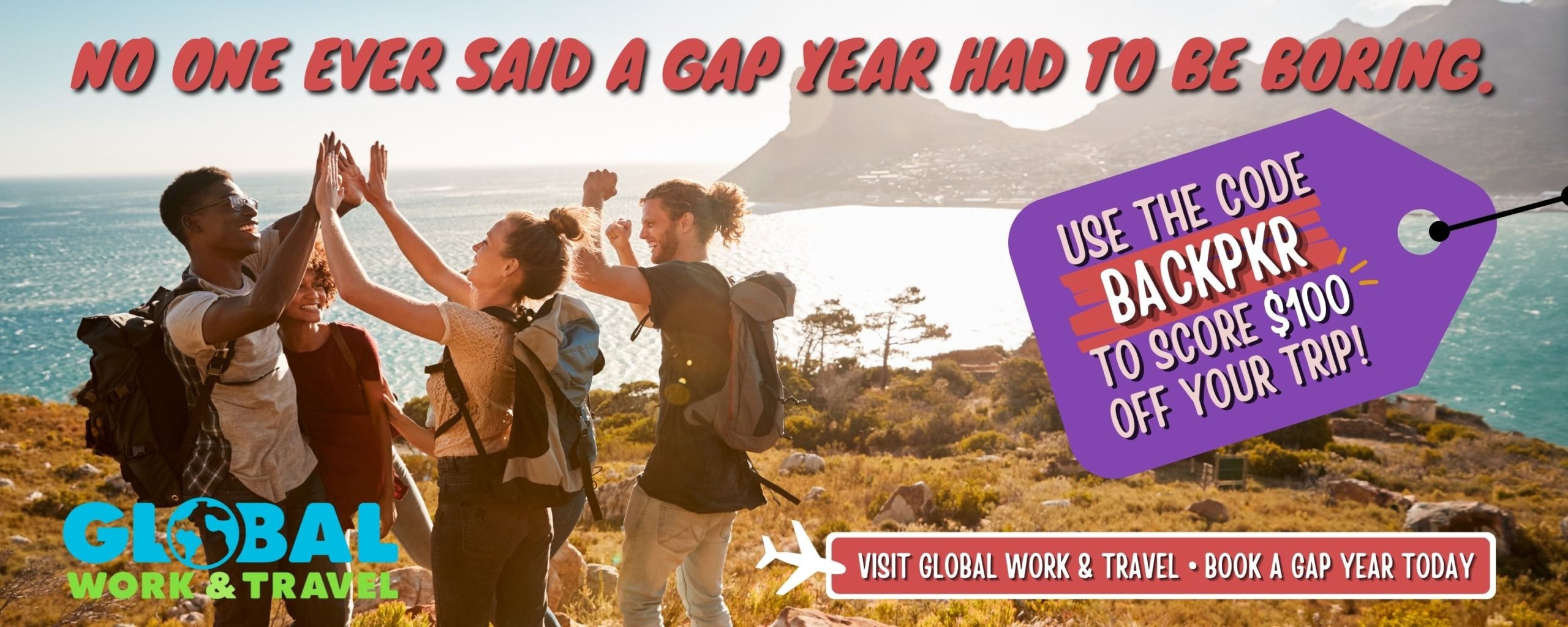
Rightio, what do you REALLY need to know about cashing checks and hiking mountains in New Zealand?
I found that planning a working holiday can get over complicated, when really it can be simple! I mean sure, it’s an epic adventure that breeds crazy stories for years to come, but you’ve got to K.I.S.S (keep it simple, stupid).
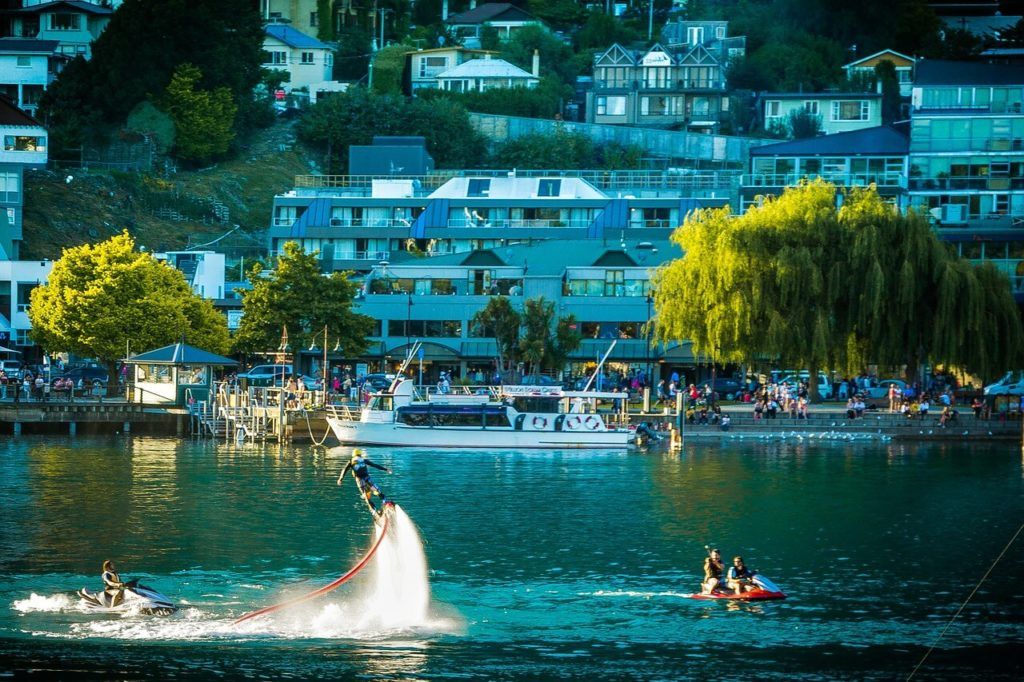
If you’re planning a working holiday, here are the top easy tips for New Zealand :
- Work out the best visa for you. If you’re 18 – 30/35, then chances are the designated working holiday visa fits the bill. This visa allows you to travel the whole of New Zealand while finding work along the way. It also covers things like internships and volunteering, or WWOOFing !
- Know the length of your stay. The longer that you want to stay, the more a working holiday visa makes sense. Although, if you only have time for a quick visit to New Zealand to help out at a volunteer project, then a working holiday programme may not be for you.
- Make a budget. I mean, all work and no play makes this just a dull, regular job. It’s a working HOLIDAY, after all. Find out how much you want to spend each month on fun activities (like bungee jumping!), and how much you’ll need to be earning from your travel job !
- Find accommodation and transport. New Zealand’s only fault might be that their housing is pretty expensive! Keep a lookout for something both comfortable and affordable – and be clear about your budget from the get-go. I’d recommend getting your own vehicle if you’re going to be in New Zealand for more than three months. Even though the country is small, it’s cheaper and logistically easier to have your own transport! Plus, you can usually sell your car or van for almost what you paid for it when you leave the country.
- Find the right job. Remember that if you don’t like this job, you can always find another. Especially when on your working holiday adventure, don’t settle for a job that makes you miserable! And take the opportunity to try out different fields. Maybe hospo, or farm work, or even a call centre job will turn out to be more enjoyable than you think. I’d also encourage you to tap into the WWOOFing and volunteering networks in New Zealand because they are full of some truly unique experiences.
- BONUS! Make sure to smell the daisies. This is a sneaky bonus tip, but in all your planning and working hard, don’t forget to enjoy your time in New Zealand. It’s truly a one in a million place that will have you in awe.

A new country, a new contract, a new piece of plastic – booooring. Instead, buy an eSIM!
An eSIM works just like an app: you buy it, you download it, and BOOM! You’re connected the minute you land. It’s that easy.
Is your phone eSIM ready? Read about how e-Sims work or click below to see one of the top eSIM providers on the market and ditch the plastic .
The working holiday visa requirements and availability varies depending on the nationality of your passport. The best way to stay up to date with the changeable visa information is to visit the New Zealand Immigration website .
Typically though, those between ages 18 and 30 can apply to stay for 12 months in New Zealand. You’re able to work and travel, as well as leave and return to the country in this time period. Generally, you need to have $4200 in your bank account and return tickets out of New Zealand to be considered eligible.
The visa typically costs around $245 – again, this depends on the nationality of your passport. For example, those from the US are lucky and only have to pay the administrative cost of $24 for their visa!
For Canadians and UK folks, you can apply to stay for up to 23 months on a working holiday visa, but you will be required to submit chest x-rays and other medical records. You’ll also need to have $350 NZD for each month you intend to stay in your bank account.
As I mentioned earlier, the New Zealand working holiday visa covers internships and volunteering, so if you’re on a gap year in New Zealand – regardless of what you intend to do – this is probably the best visa for you.
Most of the time, you’ll need to have some kind of insurance to cover your stay, as well as a ticket out of the country. But you don’t need to have a job lined up before you arrive. It’s such a flexible way to get your foot in the door of a country, and start an epic experience.
If you don’t qualify for a working holiday visa, it’s well worth checking out the jobs and skills shortage lists for New Zealand. While other work visas are not as straightforward to obtain, they can lead to residency. If you’re truly looking to change the direction of your life, and you have skills that are in demand in New Zealand, you could consider this option.
Applying for a Working Holiday Visa
It is relatively easy to organise a working holiday visa to New Zealand yourself. You just need to fill in the correct forms through Immigration New Zealand, and tick all the boxes.
Except, as with all things bureaucracy, it’s not that simple! I’ve been caught up in the whirlwind of visa paperwork, and at times wished I’d just bit the bullet and get some help from an agency.
With Global Work and Travel , the initial set-up and coordination of visas and flights are made easier with their help. They also provide an orientation, ongoing support, and throw in bonus activities for you to enjoy!
They’ll help you set up interviews and provide a 24/7 emergency line in case things get hairy. Basically, it’s nice to know someone’s got your back and can help you with the logistics so you can spend more time travelling and less time stressing.
If you are wanting to take a more relaxed working holiday, and not planning to book an organised program, you can still get help with your visa application with Visa First . They will handle the nitty gritty while you sit back and look forward to your trip.
We always recommend having insurance no matter what kind of trip you are planning. World Nomads has been the Broke Backpacker’s go-to insurance provider for years. They’re a reliable company with good coverage and an easy to use website.
You can read our full review here, or click the doobly-doop below to get signed up today!
ALWAYS sort out your backpacker insurance before your trip. There’s plenty to choose from in that department, but a good place to start is Safety Wing .
They offer month-to-month payments, no lock-in contracts, and require absolutely no itineraries: that’s the exact kind of insurance long-term travellers and digital nomads need.

SafetyWing is cheap, easy, and admin-free: just sign up lickety-split so you can get back to it!
Click the button below to learn more about SafetyWing’s setup or read our insider review for the full tasty scoop.
Ok, now we’ve gotta talk money. Obviously, you’ve got to have enough money for a plane ticket to New Zealand, as well as the minimum $4200 or so in savings.
At some point you are going to be off to work, so you won’t blow through all of that in a week. But, you do need to think about your budget because it’ll be hugely variable depending on where you choose to stay in New Zealand , as well as your taste for eating out.
It will also vary greatly depending on which city you spend the most time in. For example, a monthly budget for staying in Wellington or Auckland will be more expensive than one in Nelson or Westport (smaller regional towns).
Tourist hotspots like Queenstown tend to have more expensive living costs as well (but they are fun to live in!). Including rent, food, transport, and activities, a rough monthly budget for New Zealand in Wellington, Auckland, or other city centres is $800 USD and in regional areas: about $650 USD . If you find work that includes accommodation, or if you eat out more than you cook for yourself, or any number of other factors, then this budget will vary.
Even working a minimum wage job, you should be able to save a little money while working in New Zealand to spend on awesome once in a lifetime experiences!
If New Zealand is just one stop on a longer trip, consider how much money you need to travel for a year !
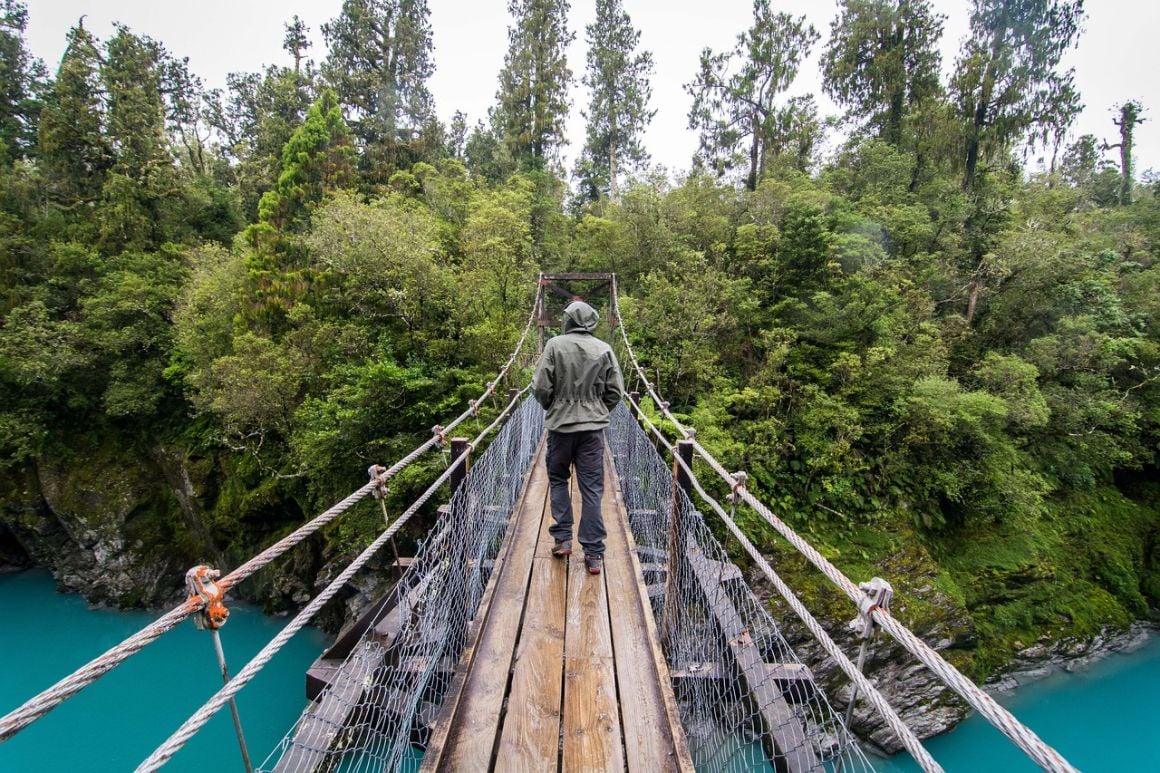
Before you get any kind of job in New Zealand, you will need to get an IRD number . This allows you to be legit and square your taxes away while travelling.
Be sure to double-check your visa conditions, as citizens from certain countries are only allowed to stay with one employer for a maximum of three months, or may not be allowed to accept permanent work.
Some of the most popular backpacker jobs in New Zealand include farm and orchid work, bartending and waitressing, au pair and babysitting, and sales. However, these are certainly not the only jobs on offer – there’s always something a little offbeat to try out like working as a fishing crew, or if you have the relevant skills and experience, settling into a marketing career in one of the cities.
I worked on fishing boats and in restaurants while I was travelling in New Zealand, and I can guarantee you will gain some crazy stories to bring home from both industries! Other people had a blast working at some of New Zealands vineyards .
The best thing about working in New Zealand is undoubtedly the people. Your co-workers and customers are all absolute characters that are excited to have a new face amongst them. I always felt at home in New Zealand, literally from the moment I landed in the small town of Motueka.
Backpackers and working holidaymakers can easily open a bank account in New Zealand, which will make paying taxes more straightforward.
For all matters of finance and accounting on the road, The Broke Backpacker strongly recommends Wise – The Artist Formerly Known as Transferwise! It is our favourite online platform for holding funds, transferring money, and even paying for goods. Wise is a 100% FREE platform with considerably lower fees than Paypal or traditional banks. But the real question is… is it better than Western Union?
Yes, it most certainly is.
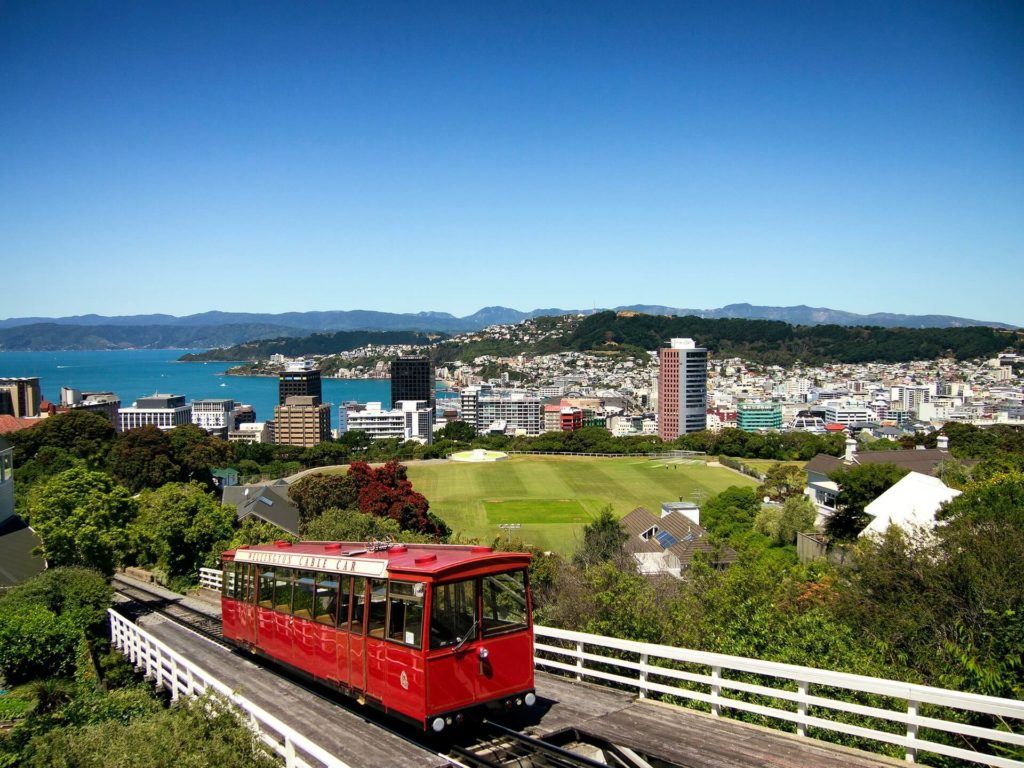
While you can totally organise your own working holiday adventure, it’s not a complete write off to have some help! The logistics of getting settled into a foreign country can be tricky at the best of times – let alone when you’re also trying to find work.
The visa itself is usually straightforward enough (although take it from someone who has had to fight New Zealand Immigration all too often: sometimes you should take professional help ) work placements can be a little trickier.
Well, hospitality and farm work is pretty easy to find, but more specialised jobs like au pairing, or any kind of internship require more local contacts. That’s where it can be super useful linking up with an agency like Global Work and Travel. They have extensive networks on the ground and can help you with the more headache-inducing paperwork side of things.
That way you’re free to touch down and explore the best that New Zealand has to offer!
Au Pair in New Zealand
Being an au pair normally involves living in with a family and providing childcare. You might also do a little bit of cooking and cleaning, but primarily you’ll be looking after kids. I think that this is one of the most amazing opportunities you can have when you’re travelling as it provides a lot of room for personal growth.
You are bound to develop a super close bond with the kids, and it can be hard to say goodbye! You’re also living with a family and having a fully immersive cultural experience.
You can sort out your own au pair job by looking at noticeboards and job boards for backpackers. As it’s one of the most common backpacker jobs, it’s usually pretty easy to find. However, it’s worth vetting the people and getting to them at least a little bit before you move in and start working.
As you’ll be living, sometimes in close quarters, with your host family so it’s important that you’re a good fit. It’s not just about you working hard enough or them not being accommodating, sometimes you just aren’t going to mesh.
This is where an agency like Global Work and Travel can come in handy. They’re able to place you in a safe and welcoming placement with a pre-approved family. The agency also provides additional support like setting up a New Zealand bank account and sim card.
Included in the au pair package for Global Work and Travel is first aid training, sightseeing tours, plus 2 weeks of paid vacation every six months. You can expect to work 20 – 40 hours a week and walk away with $200 – $365 per week, with a $1040 bonus at the end of a successful placement.
So while it’s more than possible to organise your own placements, it does help to have an agency batting in your corner!
Interning in New Zealand
Honestly, unless you have contacts on the ground it’ll be pretty hard to secure yourself an internship in New Zealand. Interning differs from volunteering as it’s a more structured environment that actively helps you move forward with your career.
There are certainly interning opportunities in New Zealand, but it doesn’t have the same internship culture as the USA, for example. This is where you’d need to rely on Global Work and Travel to help you find a placement.
Your visa would remain the same (a working holiday) but you can utilise Global Work and Travel’s network of internship placements across a huge variety of career fields. All the usual perks like help with logistics and a bonus sightseeing tour are thrown in for good measure too!
For recent graduates, interning can be an amazing way to feel like you aren’t wasting your time on your working holiday. You truly get the best of both worlds when you get to travel the world and gain amazing insights into your future career.
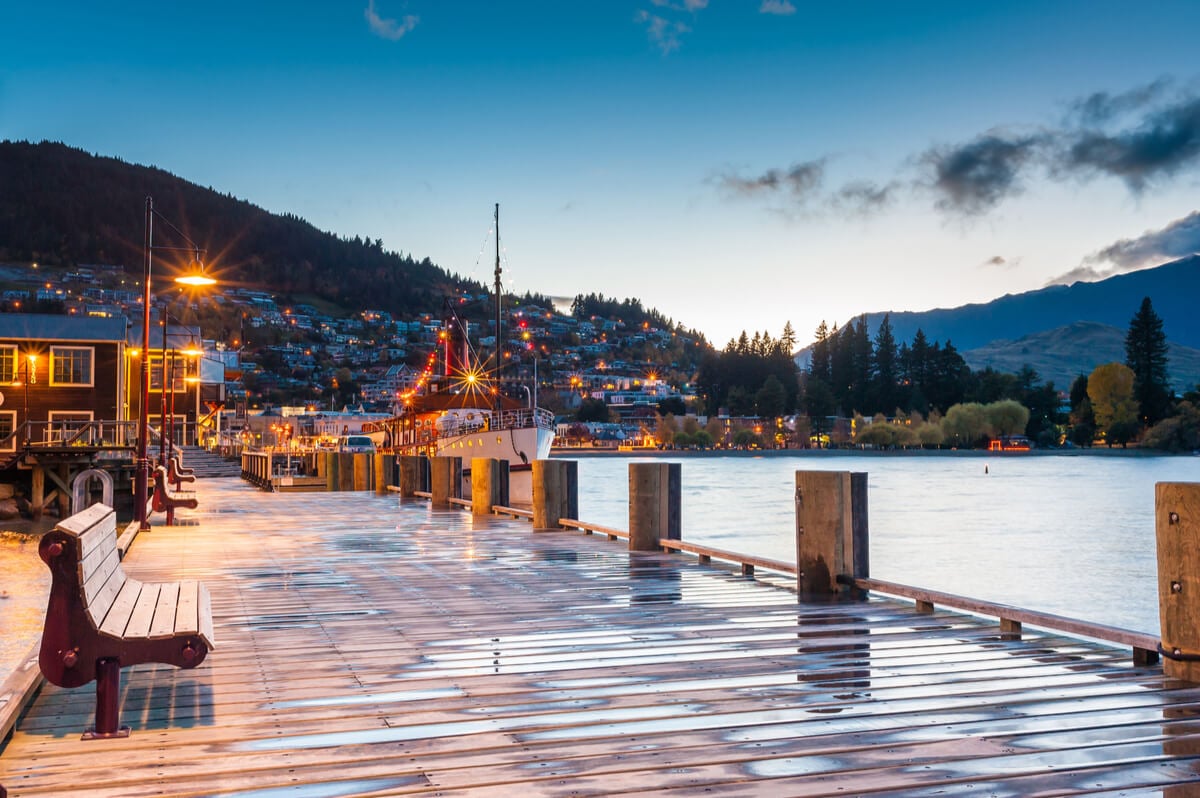
As I’ve mentioned, you can totally DIY your working holiday in New Zealand – I certainly did! This is the most flexible option, and most attractive to those with a little backpacking experience under their belts.
You still need to organise a visa, have flights booked, and enough savings in your account to fall back on – but then the fun begins! When DIY-ing your working holiday, you’ll lean into the hostel life for a number of reasons. Hostels are the cheapest way to live in New Zealand until you get your own van, or even score accommodation through your work.
Hostels are also great ways to socialise with other backpackers and working holidaymakers. You might even find yourself having a wee fling with a rather dashing German hippy type ;). They will also help you network and find jobs. While online job postings are increasingly the norm, good old word of mouth still helps backpackers score temporary jobs.
If you’re looking for a different type of working holiday experience, you can also try WWOOFing, Worldpackers or Workaway . This is a kind of volunteering where your food and accommodation are covered in exchange for your help on a project. Usually, the projects are some sort of farm work or landscaping, although childcare or artistic projects are also common.
This arrangement is much more laidback than an actual job, with fewer hours expected to cover your food and accommodation costs. However, you should still give all your energy to the project when you are expected to be working. Even if it’s volunteering, it’s important to take it seriously to get the most out of it.
There’s simply so many ways to balance a little travel and little work to create your own experience of a lifetime!
Honestly, taking the plunge and going travelling is one of the best things you can do for your personal growth. But crashing and burning through all your savings is pretty stressful. The happy medium is to go on a working holiday adventure.
Not only can you fund your travels, but you get to experience a country from the inside out as you form personal connections. When you get to slow down and enjoy a place for a longer period of time, you develop a stronger connection and it’ll stick with you for many years to come.
Whether you go at it alone and DIY your working holiday experience, or you lean on the help of a trusted agency, your trip abroad is bound to be EPIC!

Indigo Blue
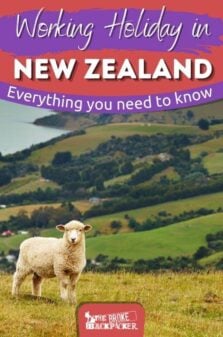
Share or save this post

Leave a Reply Cancel reply
Your email address will not be published. Required fields are marked *
Save my name, email, and website in this browser for the next time I comment.
Notify me of followup comments via e-mail.
- programs in U.S.
- programs abroad
Work & Travel in New Zealand
With its spectacular landscapes, lively cities, and peaceful countryside, new zealand is a vibrant place to work and travel, eligibility, program dates, costs and inclusions, make it a gap year, startup budget, welcome week, why greenheart travel, application process.
Working abroad in New Zealand will give you the opportunity to embark on a cultural adventure with everything this country has to offer. From bustling cities to stunning mountains and landscapes , and all the ziplining, bungee-ing, and adventure sports in between – read more about why working in New Zealand is the program for you!
Greenheart Travel’s program is ideal if you:
- Are between the ages of 18-30 and want to live abroad in a country known for its outdoor activities
- Looking for an adventure, and are open to working a variety of jobs
- Ready to meet people from all over the world who are Work and Traveling in New Zealand at the same time!
Program at a Glance:
- Spend up to a year working and traveling in New Zealand
- Assistance finding work in bars, restaurants, hostels, farms, and other short-term jobs
- Sufficient salary to live and travel
- Pre-departure and in-country support
- Welcome Week in Auckland and the Bay of Islands with excursions and group activities
- Friends, couples, and siblings are welcome!
Have questions? Email us at [email protected]
You must meet the following requirements to apply
- Citizen of one of the following countries: USA, Canada, UK, Ireland, EU
- Be between the ages of 18-30 years old
- Must be outside of New Zealand for the visa application process
- Be a native English speaker or have near-native fluency
**Due to visa regulations for a Working Holiday Visa we cannot make exceptions to these requirements. These are put in place by the New Zealand government
The following dates refer to the day you would actually land in Auckland. If you’re arriving earlier than these dates, you’ll have to arrange separate accommodation until the start date.
If you have a specific industry that you’re interested in, arriving during peak hiring seasons can increase your chance of landing the right interview! Wondering when to arrive?
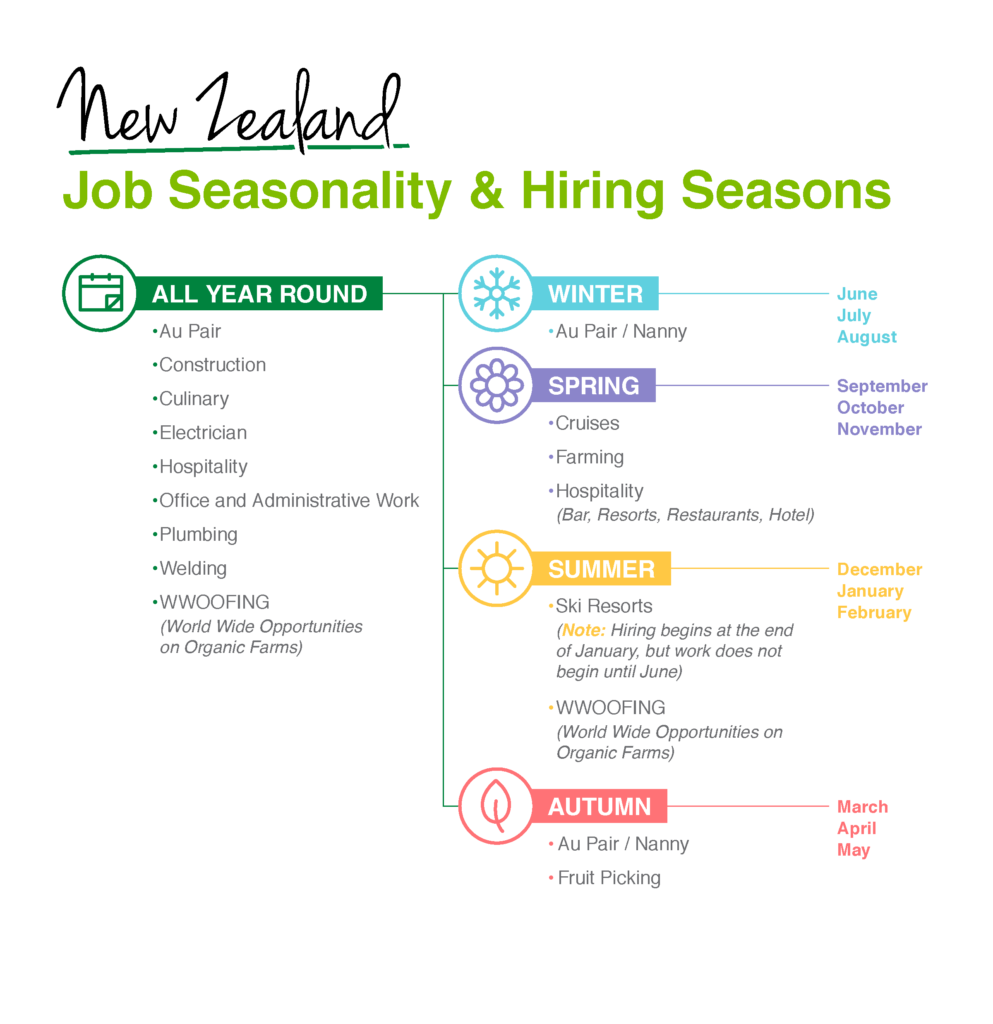
2023 Program Fees:
7 day welcome week – $1,840 USD*
*Prices subject to change year to year.
Packaged into Program Cost:
- Welcome week full of activities and excursions upon arrival in Auckland
- 6 months of international medical insurance
- 6 nights’ hostel accommodation (shared room) and breakfasts
- Group arrival orientation
- 1-on-1 job assistance service, support, and advice
- Bank account set up prior to arrival
- Resources and support for finding permanent housing
- New Zealand SIM card
- Organized social events and activities
- IRD tax number
- International Youth Travel Card (IYTC)
- Greenheart Atlas Program
Our Support and Services:
- Online logistical and cultural training before departure from an Experienced Travel Program Manager
- 24 hour in-country emergency support for the duration of your program
- Job and accommodation support for the full duration of your program, not just the duration of the welcome week!
- Visa Assistance as needed
- Assistance preparing tax paperwork upon arrival and before departure home
- Opportunity to apply for a Greenheart Grant to give back to your community at home or abroad
- Highly experienced team of in-country support staff members
Additional Expenses to Consider:
- Visa processing and fees
- Flights and return transfers
- Lunch and dinner during Welcome Week
- Housing costs and living expenses (meals, utilities, etc.)
- Personal expenses
Wondering where exactly your program fee goes? Here is a breakdown.
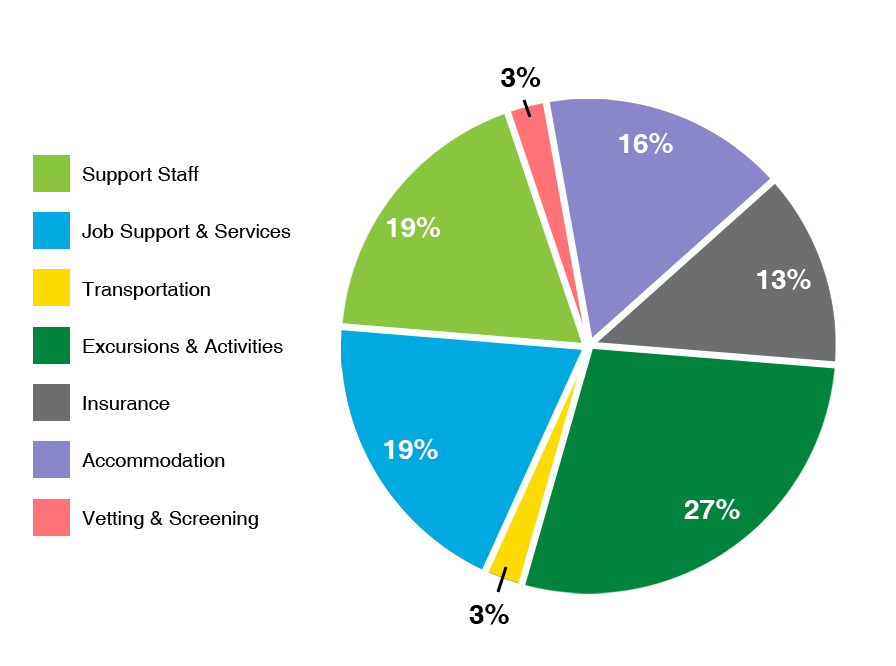
Work Abroad New Zealand is a spectacular gap year option ! Our program is designed to have a structural component that assists our travelers with pre-departure and arrival logistics such as bank account setup, obtaining the equivalent of their Social Security number, finding accommodation, securing a job, and making friends! This work abroad program also allows for enough flexibility for travelers to experience self-discovery by choosing where they live, what jobs they secure, and when and where they would like to travel.
This is a great gap year program for you if you:
- Want a program centered around community
- Are seeking guidance to help you navigate getting settled abroad, but desire the flexibility to work and travel on your own schedule
- Enjoy outdoor activities
- Are open to working a variety of jobs
- Crave a travel abroad experience that lasts for 6-12 months
- Are looking to add work abroad experience to your resume
Skills and personal growth that our Greenheart Travelers have gained while on program:
- Customer service
- Cross-cultural communication
- Agricultural
- Interpersonal
- Problem-solving
- Traveling know-how
- Strong sense of self
- Independence
The cost of living in New Zealand, especially in big cities like Auckland, is likely more than what you’re used to in your home country. So, it is important to budget accordingly to make sure you are financially prepared upon arrival and until you begin to make a regular paycheck.
Here is a rough estimate of your initial start up costs (in USD). Please note that the only amount you’ll have to pay Greenheart Travel is the program fee.
Flight: $1,200
Program Fee: $1,340
Visa: $280
Savings: $2,590*
Total: $5,410
* this amount is a requirement of the Working Holiday Visa, however, it is a good amount to have to make sure you have enough money to live comfortably until you start working
Average Weekly Budget:
Your salary will depend on how often you decide to work and what work you end up getting into. However, you are guaranteed to make the minimum wage for the type of work you’re doing ($15 – $25 NZD/hour), and as long as you’re working 25-35 hours per week, you’ll be making enough to live and travel on. Participants working in professional fields can generally expect to make more than this.
Wages and rent are paid weekly which makes budgeting your paychecks much easier:

These weekly costs will, of course, depend on your personal spending habits, where you live, how many hours you work, and if your job provides a higher pay/accommodation but you should expect to be able to save some of your paycheck every week.
Although you will most likely spend any extra cash on travel opportunities, you have the potential to make back your start up costs:
Monthly Savings = $508 NZD
Yearly Savings = $6096 NZD
During your first week in New Zealand, you’ll have 7 days of activities and excursions where you’ll get to know fellow travelers and enjoy your introduction to this gorgeous country!
Welcome Week Itinerary:
- Airport Pickup
- 6-Night Hostel Accommodation + breakfast
- Learn about Maori Culture!
- Auckland City Walking Tour
- Bay of Islands Tour
- Cape Regina & at The Puketi Kauri Forest
- Sandboarding
- Devonport & Party Night
- Job Workshop
- Travel Planning Assistance
- Bank Account Activation
*Welcome week activities are subject to change based on seasonality.
Before you arrive, your bank account will already be opened – you won’t have to research New Zealand banks or finalize your account. Instead, the team will have prepared all of your paperwork in advance. They will also set you up for the New Zealand tax system and give you your IRD (New Zealand tax ID) so you can file taxes before you arrive.
During the welcome week and orientation, you will meet the team and get all of the information necessary to start planning your time in New Zealand whether you want to start traveling or working right away. You will learn about life in New Zealand, when to work, where to work, where to travel and when to travel.
During your welcome week, you will learn valuable skills essential to your stay in New Zealand:
- Learn about New Zealand culture
- Meet other travelers who have just arrived in New Zealand
- Review the yearly job market; what jobs are abundant and where
- Be introduced to online job boards
- Format and review your resume/CV
- Have the opportunity to meet with staff to discuss job prospects and what your expectations should be
- Receive assistance in finding short or long term accommodation
- Receive IRD and learn how to file taxes when you leave the country
- Set up New Zealand cell phone
- Discuss both solo and group travel opportunities
The most common jobs are low-skilled, entry-level jobs. These give you the freedom and flexibility to work part-time and for short periods of time, which will allow you to travel as much as you like! If you have little job experience or are just looking for work as a way to fund your travels, this is the best option.
Hospitality, customer service, and office work are the most common of these jobs, as New Zealand companies report that the high level of service in the US and Canada tends to produce workers who are well-suited for these types of positions.
Jobs in restaurants, bars, hostels, and hotels are widely available for shorter contracts in cities and jobs on farms and WWOOFing (World Wide Opportunities on Organic Farms) are also popular among Working Holiday travelers who want to experience a different type of work outside of a city.
While participants can work year-round in New Zealand, it is good to note peak hiring seasons for specific industries to help plan your start date.
Skilled Professional Jobs
Skilled laborers are in high demand in New Zealand, especially in these fields:
- Construction workers
- Electricians
Please note that professional work tends to be concentrated in urban areas.
There are advantages of applying for this program through us:
- 33 years of experience with cultural exchange programs
- Friendly, responsive, and professional support from your program manager!
- We make our program fees as inclusive as possible. We include things like extensive medical insurance for the duration of the program, airport pickup, and extensive pre-departure and on-program support, so you’re not on your own for any part of your adventure
- Our alumni recommend us! GoOverseas.com Reviews // GoAbroad.com Reviews
- Exclusive access to the Greenheart Atlas, our interactive program that will guide you through your cultural immersion experience before, during, and after your program
- Hands-on support and personal attention every step of the way
- 24/7 emergency phone number to reach a staff member at any time
- Pre-departure “Culture Shock and Adjustment” Webinar before you leave
- Discounts for future Greenheart Travel programs
- We are a non-profit, mission-based organization
- Continued support throughout your program
We also have some unique offerings to our Greenheart Travel participants and alumni!
- Greenheart Grants: Greenheart Grants are funds awarded to Greenheart Travel participants to use for community development projects in their host or home country. A Greenheart Grant is the opportunity to create, improve, or maintain an impactful, community-focused project abroad or at home. Grant funds could be applied to supporting women’s cooperatives, schools, community centers, or health clinics, for example. Grant winners will be featured on our website, social media, and blog. You can see our past winners on our blog here.
- Greenheart Alumni Program: We created the Greenheart Travel Alumni Program to provide resources and a community to support alumni in their advancement as global leaders, and a way to celebrate and reward our participants for being ambitious, inspiring catalysts of cultural exchange!
Read more about why people are choosing Greenheart Travel: Why Choose Greenheart Travel?
How will I find a job?
With the support of our in-country partner, work in New Zealand participants will have a variety of ways to search and secure a position during their programs. Services include:
- Introduction to finding work : an overview of the basic types of jobs that are available around the country, required skills, resources to find a job and listings of current jobs available for immediate start around the country.
- Job board : Available in the Auckland office of the in-country partner, the board is updated weekly by staff that scans the job market each week for jobs that would be suitable for working holiday participants. All listings on the board are also listed online so participants can access this wherever they are in the country.
- Assistance with certification of foreign credentials, if necessary.
- Weekly newsletters : Unique and exciting job opportunities that come from local knowledge are emailed to participants weekly.
How long does it take the get a job?
This varies. During the busy season when lots of jobs are available, sometimes several job prospects are already awaiting you when you arrive and you can start work right away. Other times it can take up to six weeks. Usually, if there is a delay it is because you have rejected initial job prospects because they did not meet your expectations for some reason.
Can I change jobs while I am there?
Yes. You can choose to work in the same place for the full year, or to switch jobs.
How much will I make?
See the Budget page .
Where will I live once I’ve been hired?
Some jobs, especially those on resorts and farms, include housing or subsidized housing. Our in-country partner can provide guidance and resources to travelers to help them find other types of housing depending on where they are working. Sometimes the employer can provide assistance as well.
In Auckland, you will probably pay $160-$200 NZD for a shared room (per week) if you are in short-term accommodation. If you want your own room, it is more expensive. If you are staying a while, think about renting an apartment with some friends or moving in with some Kiwis, as it is generally the cheapest option. However, some jobs will only be short term (1-2 months) and it can be difficult to find a short or open lease, so you may need to spend more towards $200 NZD/week to stay at a hostel.
1. Start Your Application Here . You will be sent more information as well as the link to our application portal to begin your formal application.
2. Submit Basic Program Information: The first step in our application portal will be basic things like your chosen start date, etc.
3. Submit your deposit : A $300 deposit is required in order to apply for the program. This is subtracted from your total program fee. If we are unable to accept you following your interview (very unlikely!) we will refund your deposit in full.
4. Complete Application & Documents : Provide more detailed information about yourself in Part 2 of the application. In this section, you’ll tell us more information like your work history, motivations for joining the program, travel history, and emergency contacts. You will also submit your documents (below) within your portal account.
5. Skype Interview: Once you have submitted your online application and paid your application deposit, you will be asked to schedule a video interview with a Greenheart Travel representative.
6. You’re Accepted! Woohoo! We are usually able to accept people within 1-2 weeks of their interviews.
7. Commitment Deposit: Once you are accepted to the program, you will need to submit a $300 commitment deposit within 14 days to confirm your spot on the program. Once you submit your commitment deposit you will unlock the acceptance portion of your portal, which includes things like pre-departure videos, travel and arrival information, the Greenheart Travel Atlas, and more.
9. Book your flights, and get ready for your adventure to New Zealand!
The above process can take as little as 1 week to complete, so it’s up to you how quickly you’re able to complete each step.
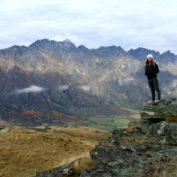
Sound like your kind of adventure?
Want access to our Facebook group to talk with travelers on this program? Click here!
Greenheart Travel Adventures
Instagrams from greenheart travelers working in new zealand, living in a national park while working abroad in new zealand, alumni spotlight on carolyn ross: why working in new zealand is about international life experiences rather than a career.
- facebook-official
- youtube-play
- pinterest-circled
14 Inspirational New Zealand Travel Blogs
Nz pocket guide is 10 years old. thank you for trusting us with your trip for over a decade, … or what we consider the best new zealand bloggers.
It is hard to describe how much of an impact a trip to New Zealand will have on your life. From a life-changing gap year to an eye-opening road trip , you will leave New Zealand changed forever. Some keep those souvenirs locked in their brain, others write daily in their travel diary , but many log all their adventures and travel tips in their blog. We have compiled 10 awesome blogs from travellers who came to New Zealand for you to check out. Be inspired by their stories, learn from their tips, or copy their itinerary . There is a lot to learn from reading other travellers stories.
To better introduce those travellers, we’ve asked them: What was your best New Zealand experience? Check out their answers below along with a link to the New Zealand section of their blog. Plus, don’t miss the bonus entry at the bottom of this article.
First Thing’s First…
Travel video blogs don’t come more epic than “New Zealand’s Biggest Gap Year” where Robin and Laura from our very own NZPocketGuide.com hit the road for 365 days doing 365 activities in New Zealand! Subscribe to their adventures on YouTube and watch the trailer below!
1. Petra – The Global Couple
New Zealand = home. We are lucky enough to have been born and bred in this beautiful country and have spent many years exploring it by campervan, car, and on foot. One of the best things about New Zealand is that because it is such a small country, it’s so easy to get into the outdoors and embrace the amazing landscapes – from snowy peaks and primaeval forests in the South Island to desert volcanoes and white sand beaches in the North Island. Our favourite New Zealand travel experience (and we’ve had a lot of them!) was one summer when we bought an old campervan, did her up, and travelled around the South Island – camping in some of the most stunning spots you can imagine, cooking dinner beside sublime lakes and beaches, breathing in the fresh air, spotting the Milky Way at night, getting eaten alive by sandflies, having curious native birds come within half a metre, and falling even more in love with our magnificent home.
Petra has 49 posts about New Zealand. Find more about her trip in New Zealand at theglobalcouple.com
2. Lina – Divergent Travelers
It’s simple; New Zealand stole our hearts. The diversity of the country brought us to our knees and ignited a lifelong love affair with the country. When someone asks us what our favourite country is we don’t hesitate to include New Zealand in our top 5. We spent 5 weeks travelling around both the North and South Islands and quickly realized it wasn’t enough time to really enjoy all the beauty and adventure on offer in this dynamic country. Despite everything on offer, it was the Tongariro Crossing that sealed the deal with us and a return to New Zealand is always at the top of our minds.
Lina has 35 posts about New Zealand. Find more about her trip in New Zealand at divergenttravelers.com
3. Hannah – Getting Stamped
New Zealand in one word: Epic! We spent 2 weeks driving a camper van around the entire South Island of New Zealand, and every corner we turned was another epic photograph waiting to be taken. We made the mistake of only spending 2 weeks in New Zealand. Next time we return it’ll be at least 3 months so that we can explore both the South & North Islands. New Zealand is the most beautiful country in the world: we had heard this from travellers and we didn’t believe them until we witnessed it for ourselves. After travelling to 65 countries New Zealand is one of a kind and should be on every traveller’s bucket list. There are so many things to do in New Zealand from hiking, bungy jumping, sky diving, skiing, kayaking, you won’t be bored in New Zealand.
Hannah has 26 posts about New Zealand. Find more about her trip in New Zealand at gettingstamped.com .
4. Emma – The Travel Natural
My experience in New Zealand is a personal one. I grew up in Taranaki (West Coast of the North Island), a destination that’s only beginning to see increased international visitors, despite holding all the usual New Zealand power icons; an impressive mountain and stretches of silky black sand beaches. Taranaki is a place I keep returning to again and again, it’s a place to slow down as well as get active. An old school farming region at heart, a little bit out of the way for most tourists and my favourite place in New Zealand. Am I being biased? Come see for yourself.
Emma has 22 posts about New Zealand. Find more about her trip in New Zealand at thetravelnatural.com
5. Lotte – Phenomenal Globe
New Zealand is without a doubt the most beautiful country I have ever been to! It just amazing, the country has it all. Mountains. Volcanos. Lakes (there are so many beautiful lakes in New Zealand!). Sea. Forest. Waterfalls. Beaches. Hills. Cliffs. You name it and its there.
Besides the incredible scenery, the people of New Zealand are so very welcoming and friendly. If you are having a coffee, they’ll have a chat with you and proudly tell you about their amazing country and awesome places you should visit. Which usually are the kind of places you won’t find in the Lonely Planet, so it’s worth keeping your ears open. If you are lost or so much appear to need anything, they’ll help you out.
Yes, New Zealand is my favourite country in the whole wide world! I loved the tiny towns we drove through in our campervan, realising there was a town after we had already passed through. I love how there are quirky flightless native birds (some of which are on the brink of extinction because of possums). And I absolutely loved driving around in our campervan, staying on the most beautiful campsites without anyone else around and waking up with breathtaking views of a beautiful lake or the sea. Oh New Zealand, it’s been 2 years since I’ve seen you and I miss you deeply. I hope to see you soon
Lotte has 17 posts about New Zealand. Find more about her trip in New Zealand at phenomenalglobe.com
6. Anita – Anita Hendrieka
The Wairarapa is such an underrated region in New Zealand. Nestled only an hour away from Wellington is home to the only white kiwi in New Zealand, breathtaking hikes and untouched beaches. By far one of the best hikes for all fitness types is Rocky Lookout, which is located in Mount Holdsworth. Once you reach the top you will be rewarded with a pretty spectacular view which will really make you feel like you’re in Middle-earth. While walking up you will get the real kiwi nature experience with tui whistling away and many other beautiful animals greeting you. On a summer’s day, this hike is a local favourite so shhhhh, don’t tell anyone!
Anita has 17 posts about New Zealand. Find more about her trip in New Zealand at anitahendrieka.com
7. Jub – Tiki Touring Kiwi
Chatting to my dad on the phone last week summed up New Zealand for me. It’s where I grew up before leaving to explore the world a few years ago. We got talking about the friendliness of Kiwis to strangers which I still experience on my brief returns.When you’re walking down the street you acknowledge most people you walk past. That may mean a verbal hello, a small wave, smile, a simple head nod or a combination of them all.This is a habit that has carried on with people regularly saying it’s cool that I’m always saying hello to randoms in the street (it’s interesting how different cultures react to this around the world).The reason it came up in a phone call? Dad was saying how he feels like Waikanae’s culture is shifting as more city slickers move to Waikanae (they work in Wellington City 50 minutes away) with a new motorway opening in 2017. By nature, they tend to not acknowledge everyone they pass on the street. Keep smiling!
Jub has 15 posts about New Zealand. Find more about his trip in New Zealand at tikitouringkiwi.com
8. Jeremy – Travel Freak
“With stunning landscapes, amazing food, delicious wine, and some of the friendliest people you’ll ever meet, New Zealand holds a very special place in my heart. I spent fifteen months living, working, and travelling around New Zealand. In fact, those days are some of the fondest of my six total years of full-time travel. My journey started in Queenstown, where I spent 6 months working at a luxury hotel and partying until 5 or 6 am most weekday nights. My journey ended in Auckland, where I worked in one of the most exclusive whiskey bars in the city. The true gem of New Zealand, though, is Wellington, a place I call my second home. It’s known as The Coolest Little Capital in the World, and boy, are they right. Its windy as hell, but the people and the nightlife are some of the best you’ll find anywhere in the world.”
Jeremy has 15 posts about New Zealand. Find more about his trip in New Zealand at travelfreak.net
9. Cory – You Could Travel
I loved New Zealand so very much, and I would not hesitate to recommend it to any other fellow traveller. I enjoyed how incredible, clean and pristine New Zealand was. I spent a month driving around New Zealand’s South Island and that was enough to fall in love with this beautiful, safe and well-organised country. The best parts were trailing the Abel Tasman Coastal Track and cruising through Milford Sound. Never in my life, I enjoyed a more stunning landscape with such postcard-perfect views. The roads in New Zealand are some of the best in the world, perfectly tailored for road trip lovers and driving enthusiasts. For nature photographers, New Zealand is definitely a dream come true, with magnificent topography ranging from snowy mountains, through icy glaciers, to golden beaches. Whenever I think of a natural paradise, New Zealand comes to mind, no question about it.
Cory has 14 posts about New Zealand. Find more about her trip in New Zealand at youcouldtravel.com
10. Brittany – The Sweet Wanderlust
Before moving to New Zealand, I knew nothing about this country. I booked a flight to Queenstown and planned to spend a couple of months in the Adventure Capital of the World before moving north as winter set in. Two months turned to seven, though, as I filled my days with bungy jumps, luging, snowboarding and a ride on the TSS Earnslaw.
I left the city that captured my heart for two weeks on a whirlwind road trip from Queenstown to Auckland. Fueled by pineapple lumps and chocolate fish, I heli-hiked Fox Glacier, was amazed by the unreal blue of the Hokitika Gorge, and got goosebumps watching a Haka in Rotorua. “One does not simply walk into Mordor,” but I hiked the Tongariro Crossing, and that’s about as close as you can get. I searched for Bilbo Baggins at Hobbiton and practised speaking dolphin in Kaikoura.
New Zealand is a place where my adventure-seeking heart found a home, and I’ll forever be grateful for the time I lived in the land of kiwi birds and Kiwi people.
Brittany has 10 posts about New Zealand. Find more about her trip in New Zealand at thesweetwanderlust.com
11. Jen – The Snow Chasers
As self-confessed snow addicts, Queenstown, New Zealand is the top of our list of places to go snowboarding in the Southern Hemisphere. So much so that we’ve mustered up our crew and gone there 7 times in 8 years. Aside from the sensational flight in and the ridiculously stunning scenery that is Queenstown, there is easy access to a number of epic ski resorts. The Remarkables and Coronet Peak ski resorts are around 30 minutes away. Then there’s Cardrona ski resort which is a scenic 45-minute drive from Queenstown. There’s something for everyone whether you are into groomed runs, technical terrain, hiking or a bit of park action. The facilities at all resorts are well maintained with loads of food options to choose from. For apres-ski, Cardrona Pub is a must if you are on your way back from Cardrona ski resort. Otherwise, chill out in Queenstown at one of the many awesome pubs and bars.
Jen has 8 posts about New Zealand. Find more about her trip in New Zealand at thesnowchasers.com
12. Hugo – Breathe With Us
Let’s be honest, New Zealand is one of the most amazing countries out there and a personal favourite of ours. Before embarking on a month-long road trip on both the North and South Islands our expectations were high, but nothing compares to the experience of actually setting foot there for the first time and realizing how much there is to explore throughout the country. The beauty of New Zealand and its scenery is unique, and the country offers countless opportunities to enjoy the outdoors and to have a great time – and this is exactly what we did! Some of the highlights include sea kayaking at Milford Sound among massive fiords, hiking Tongariro’s volcanic landscape, glacier walking on the west coast at Fox and Franz Josef glaciers, admiring the many picture-perfect lakes, witnessing the bubbling colourful geothermal features in Rotorua, or learning about and seeing the country’s flightless birds such as the kiwi. Yet, there’s so much more. Now, we just need to go back.
Hugo has 8 posts about New Zealand. Find more about his trip in New Zealand at breathewithus.com
13. Jean – Traveling Honey Bird
Winter is a wonderful time to visit NZ. There’s a certain serene beauty about winter in the South Island of New Zealand. Not only is winter the best time of the year to spend a month celebrating my birthday it also offers the adventurer a whole new arena to play within. Most people assume that the only reason to go to New Zealand in the winter is for snow sports and post snow sport drinking. We recently discovered the pleasure of road tripping during winter.
The cool morning mist that sits across the paddocks perfectly frame the magnificent mountains. Making it the perfect backdrop to your morning coffee from the back of the campervan. The days turn into bluebird mountains of pure clarity, allowing you to see for miles in every direction as you drive to the next destination. There’s comfort food galore at any caf you stop by. So no more diet of L&P and marshmallow fish! Though these staple NZ road trip road snacks.
Road tripping in the winter months is a wonderful experience that shouldn’t be missed.
Jean has 7 posts about New Zealand. Find more about her trip in New Zealand at travelinghoneybird.com
14. Bailey & Dan – Destinationless Travel
Travelling in New Zealand was perfect for us, we love the outdoors and we love adventure – and that is what New Zealand is all about! The outdoorsy things to do in New Zealand are literally endless. There is something special about being on the top of a mountain or swimming under a waterfall that can’t be matched in any city setting. New Zealand is so diverse in terms of the landscape that one day we were in the snow and the next we were enjoying a sunset on the beach. The scenery is absolutely unimaginable until you see it with your own eyes. Some of our favourite memories of New Zealand include watching the sunset at Milford Sound, learning to snowboard, partying in Queenstown, and hiking everywhere! If you are a nature-lover like we are, then New Zealand is sure to impress.
Bailey & Dan have 23 posts about New Zealand. Find out more about their trip at destinationlesstravel.com .
15. (BONUS) Robin & Laura New Zealand’s Biggest Gap Year
New Zealand blew our freaking minds! Right out of the plane we were stunned by the epic scale of the country. It did not take us long to know that this was the place for us. So we settled here and kept the adventure going for much longer than planned. This adventure turned into the very guide that you are reading right now, NZPocketGuide.com, New Zealand’s biggest guide for backpackers.
But we are not done travelling just yet, New Zealand has so much to offer that we challenged ourselves to spend another 365 days on the road to showcase 365 of the best activities that the country has to offer. We call it New Zealand’s Biggest Gap Year. Are you ready for it? With blog posts every day and stunning 360? pictures, your mind will be as blown as our was when we landed in New Zealand a few years back!
Robin & Laura have 365posts about New Zealand. Find more about our trip in New Zealand at NZPocketGuide.com/Blog .
More Inspiration for Your New Zealand Trip
Check out these articles to get you pumped about a gap year in New Zealand:
10 Photos That Will Make You Want to Explore New Zealand Right Now
10 breathtaking photos of new zealand.
- Why New Zealand is the Best Backpacking Country
- Interview: This Year’s Most Inspirational Hikers in New Zealand
- 20 Essential Must-Dos BEFORE Moving to New Zealand
The information in this guide has been compiled from our extensive research, travel and experiences across New Zealand and the South Pacific, accumulated over more than a decade of numerous visits to each destination. Additional sources for this guide include the following:
- Tourism New Zealand (General travel advice - Updated [2024])
- Immigration New Zealand (Visa and immigration advice - Updated [2024])
- New Zealand Customs Service (Customs and Biosecurity - Updated [2024])
- New Zealand Traveller Declaration (NZTD online platform - Updated [2024])
- Tiaki Promise (Care for people place and culture - Updated [2024])
- Safe Travel (NZ travel advisories - Updated [2024])
- Stats NZ (Statistics and travel data - Updated [2024])
- Waka Kotahi NZ Transport Agency (Road and transport tips - Updated [2024])
- DriveSafe (Road safety - Updated [2024])
- Council websites and freedom camping maps (Local travel advice region by region - Updated [2024])
- AdventureSmart (Know before you go - Update [2024])
Our editorial standards : At NZ Pocket Guide, we uphold strict editorial standards to ensure accurate and quality content.
About The Author
This article has been reviewed and approved by Robin, who is the co-founder of NZ Pocket Guide. With more than 15 years of experience in the New Zealand tourism industry, Robin has co-founded three influential tourism businesses and five additional travel guides for South Pacific nations. He is an expert in New Zealand travel and has tested over 600 activities and 300+ accommodations across the country.
Was this article useful?
Related posts, 12 dramatic photos showing everyday life in new zealand, 16 amazing rainbow pictures taken in new zealand, 14 inspiring movies that will get you pumped to travel, the 12 worst travel advice ever, recommended for you, the 10 best backpacker bus tours in new zealand 🎒 [2024], 11 tips to save money on food in new zealand, 7 discount cards for backpackers in new zealand, destinations, travel tips, connect with us, accommodation.
Welcome/Kia Ora By using this website you agree to our Privacy Policy and terms of use within it which includes sponsored posts and affiliate links.
Connect with us
Welcome/Kia Ora! By using this website you agree to our Privacy Policy and the terms of use within it.
© 2024 NZ Pocket Guide. Contact – Disclaimer – About Us – Our Standards

New Zealand Working Holiday | Live Work and Play in New Zealand
by Sharyn McCullum | Last updated Mar 22, 2022 | New Zealand Live Work and Play , Working Holiday Visa Destination

Dreaming of a laidback year or two, spent working and travelling around the beautiful country of New Zealand? Well, you’re just in luck. A wide range of people from many countries around the globe can apply for a working holiday in New Zealand! With a New Zealand working holiday visa in hand, you can start packing your bags. Then head off on a wonderful adventure and a future full of new and exciting opportunities on a working holiday in New Zealand. This post updated March 2022.
Table of Contents
New Zealand Working Holiday Visa Program
The working holiday visa program in New Zealand allows you to work and travel throughout New Zealand for up to 12 months or 23 months if you’re from the UK or Canada ! You must be between the ages of 18 and 30 or 18 and 35 depending on the country you’re from.
You can find the full list of countries that are eligible to apply here .
When choosing to apply for the working holiday visa in New Zealand, you must have enough money to fund your plane ride back home. More specifically, they require you have $4,200 NZD before you arrive and must show evidence of the funds . You’ll also need to provide evidence of medical insurance in case something were to go wrong during your stay there. When applying it’s important to understand that the intention of this visa is to allow people to primarily travel around the country.
Whilst you can certainly work while living in New Zealand for the year, the holiday aspect is heavily pushed, which isn’t a bad thing! There are endless activities for nature lovers but New Zealand has a high cost of living so you’ll need to stay on top of your expenses while you’re there.
If you’re able to apply for the 23 month program, keep in mind that you’re only allowed to work 12 months in New Zealand, no matter what! That means if you stay for up to two years, you’ll only be allowed to work for one of them. If you choose to stay that long, you need to have extra money saved and you should account for additional expenses so you don’t find yourself in a bad position. If you’re simply planning on taking advantage of one year working in New Zealand, you can work the entire year but won’t be allowed to apply for permanent positions. We’ll get into your options later on in this post.
Those who are eligible for the 23 month long visa will also have to provide a General Medical Certificate. This is easy to obtain if you’re in your home country but more challenging to get if you’re already living or travelling someplace else!
When you’re ready to apply for your visa, you can do so through New Zealand’s government website. Here you’ll have to provide all documentation, including proof of current funds. The process can take a few weeks to months depending on how many applications are coming through!
Choosing Where to live in New Zealand

Auckland is a great place to start your working holiday in New Zealand
New Zealand is a small country, so it makes travelling around and seeing it all quite easy! You’ll probably want to settle in one place for the year or two but you could also opt for staying in a few different cities or towns if you like to change things up.
There are a few major cities where most of the country lives. This would be a good place to start if you’re not sure where you’d like to go. Before we jump into the different cities, you should consider what island you might want to start exploring. New Zealand has the North Island and South Island, both of which are beautiful!
You’ll find an international airport on each island, Auckland being home to the North Island’s and Christchurch being home to the South Island’s. Although both islands have lots to offer, they can be very different from each other and appeal to different people with varying interests.
The North Island is where you’ll find pristine beaches and a fairly warm climate year-round. There are some mountains as well which are great for hiking and some beach towns have spectacular surf!
The South Island is much cooler temperature-wise, which should come as no surprise with the mountainous landscape. The south is also known for its adventure activities, hiking and skiing and snowboarding in the winter months.
If you think you may enjoy the North Island best, you might want to consider living in Auckland or Wellington. Your best options for the South Island would be Christchurch or Queenstown. Either way, you’ll find a spot that feels right eventually and if you get sick of one place, you can easily move on to another.
Things To Do When You Arrive in New Zealand on a Working Holiday
The second you land in New Zealand, there will be a few things you’ll need to get in order!
1. Sort out your accommodation 2. Open a bank account 3. Get a SIM card 4. Find a job 5. Register for a Tax File Number
These can be done within the first few days of arriving and will help you settle in your short-term home.
Accommodation in New Zealand
Before you get to New Zealand, you’ll want to think about accommodation for the duration of your working holiday visa. Should you rent a place for a few months? Sign a year-long lease? Ultimately, it depends on what you want your experience to look like!
It’s best to start off with a short term rental at an Airbnb or book a hostel or hotel room for a week or two. That will give you enough time to get things organized when you arrive and determine your next steps.
Many on a working holiday in New Zealand will choose to stay in hostels long term but you can also find short leases as well. A great place to start looking for your accommodation would Facebook groups, HostelWorld or Booking.com .
If you choose to rent a room in an apartment, it’s not cheap. It will cost anywhere from $160 NZD to $210 NZD per week! Queenstown is also the most expensive place to live so if you’re hoping to settle somewhere more than a few months, you may want to take a look at your other options.
If you find you’re running low on money for accommodation, you can try a few different options such as WWOOFing and House Sitting .
Work Options in New Zealand

Hospitality jobs are popular with working holidaymakers
As mentioned at the start of this blog, you can find work throughout the country, so long as it’s not a permanent position! So what does that entail exactly? Job options vary depending on your preference and experience but you can expect to find jobs in certain industries much easier than others.
A great place to start looking for jobs or to get an idea of what jobs are available is on the New Zealand Backpacker Jobs Facebook Group!
Hospitality Jobs in New Zealand
Similarly to the Australian Working Holiday visa, you should have no trouble getting work in hospitality, especially if you’ve done it before. Many people work at hostels in exchange for free accommodation, which is a great position if you enjoy a laidback work environment and meeting lots of new people from around the world!
READ MORE : How to find A Job in A Hostel
You can also work in bars, restaurants or cafes as well. Since people come and go from these jobs on a regular basis, there are always positions available and they’re easy to leave behind when you’re done working and ready to travel.
Retail Jobs in New Zealand
Retail jobs are a great option for a casual position during your time in New Zealand. They pay minimum wage which isn’t bad considering it’s up to $20 NZD as of 2021! With many big cities around the country, you should have no problem finding a store to work at. It definitely helps to have experience but it shouldn’t be too challenging if you have any customer service related experience.
Horticulture Jobs in New Zealand
If you’ve never heard or horticulture, you’re not alone! It’s working with crops, fruit orchards or vineyards and it’s a huge industry throughout the country. Entry-level jobs in horticulture are easy to get without any relevant experience.
There’s work throughout the year depending on what you’re looking for in particular. For example, if you hope to work at a vineyard you should look for a summer position, meanwhile, indoor packhouse jobs can be done year-round.
Other Work Opportunities in New Zealand
Of course, if you aren’t thrilled by the thought of working in hospitality, retail or horticulture, there are other options to choose from. Some of which include:
• Tourism – With so many tourist attractions throughout New Zealand, it’s fairly easy to find a position. Queensland would be a great option if you love adventure activities such as skydiving, bungee jumping, mountain biking etc. If you find an activity you love, chances are that you can get hired to work there and teach others!
• Construction – Labour jobs such as construction are always in need. You’ll need to have relevant experience but they pay well and you’ll be able to find a position right away.
• Ski hills – If you’re interested in seasonal work, there are many ski hills open in the winter months. You can work as an instructor if you’re experienced or find a job a reception, for example.
READ MORE : Get A Job in New Zealand Ski Resort
• Farm work – Similarly to horticulture jobs, there’s also farmwork available. Dairy and sheep farming are the most prevalent options, which shouldn’t come as much of a surprise considering there are more sheep than humans living in New Zealand!
Travel Options in New Zealand

Visit Hobbiton While Travelling Around New Zealand
New Zealand is a great place to travel during your working holiday visa. If you’re able to hire a car or campervan, you can travel around New Zealand on a tight budget and see it all!
If you don’t have access to a car or don’t drive, you can use hop-on buses. Stray Travel or Kiwi Experience allow travellers to pick a route and travel as they please. It’s a great option for solo travellers who want to meet new people. It’s also great if you’re with a group of friends. Another option is to hop on a train, of which there is quite an extensive service. Read the top 6 travel options for New Zealand here .
READ MORE : 7 Day North Island Driving Itinerary , 14 Day South Island Driving Itinerary , 1 Month New Zealand Road Trip Itinerary
Start a Blog on New Zealand
After spending a year or two living in New Zealand, you’re bound to be an expert. You can start a blog while you’re there and share your travels with others who hope to do the same someday! After starting your blog, you may continue your travels and build a community based around your travel experience.
READ MORE : How to Start a Blog
It’s Time For a Working Holiday in New Zealand
There’s no reason not to spend some time exploring all that New Zealand has to offer. Start submitting the information needed to apply now and you’ll be on a flight to New Zealand sooner than you may think. You’ll have the best time of your life and you’ll never forget it! If you are planning a trip to New Zealand or have been on one I’d love to hear in the comments following.
Where to after New Zealand? What about an Australia Working Holiday

You may also like:
Thanks for sharing!
Join my Facebook Group — Ask questions, get answers!
Expat Travel Nest – Living and Working Abroad
Just so you know: some of the links in this post might be affiliate links, which earn me a small commission at no extra cost to you. No pressure to use my links, but I REALLY appreciate when you do! Also, a s an Amazon Associate I earn from qualifying purchases.
My favourite tools to Travel Live and Work Abroad
🏠 Where Will You Be Sleeping Tonight? – Get a bed in a hostel dorm through HostelWorld or for a hotel room check out Booking.com . Get free accommodation house and pet sitting through Trusted Housesitters – this has saved me thousands on accommodation, no joke!
✈️ Need a cheap and flexible airfare – head to Skyscanner .
🚙 Car Rental – search and compare vehicles at DiscoverCars .
🚆 Train Travel: I love riding the rails. For a rail pass in Europe head to Raileurope . And Japan has a great one too – JapanRail Pass .
🚌 Travelling by bus is often the cheapest way to travel. Compare and get a ticket or a pass at Busbud .
🏃🏻♀️ Jump-the-queue entrance tickets and day tours: I book these through GetYourGuide .
🌏 How to pick a country to live and work abroad in? Check out my Working Holiday Visa Country Guides and Digital Nomad Visa Country Guides to see where you can live work play travel abroad.
🚑 Should you buy travel insurance? Absolutely Yes! SafetyWing is great digital nomads and long-term travellers and World Normads has policies for general and adventure travel.
Buy the Guide to Get Ready to Live Abroad, Work Abroad and Travel Full Time Like a Pro
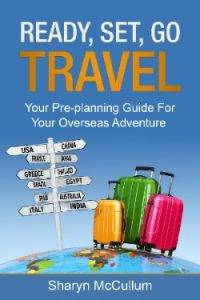
Join Me and Subscribe
Claim your free moving abroad checklist, + receive work and travel abroad tips and news delivered to your inbox., you have successfully subscribed, follow along on facebook, meet live work play travel.
Sharyn McCullum – Travel Writer / Blogger, Remote On-line Worker, sometime Digital Nomad and Travel, Live and Work Abroad Expert. Is a chocoholic, coffee connoisseur and lover of ’80s music. Been travelling all her life thanks to her dad who worked for an airline. Lived in London 4 years on a working holiday. Has holidayed in Hawaii over 15 times and currently calls Melbourne, Australia home. Is inspiring others to get the live work play travel lifestyle with this blog. Read more about Sharyn here.
Submit a Comment Cancel reply
Your email address will not be published. Required fields are marked *
Submit Comment
Privacy Overview
You have successfully subscribed..
I will not send you spam, just my newsletter. Unsubscribe at any time.

The Complete Guide to a Working Holiday in New Zealand
New Zealand – a place which, for a lot of people, will bring up images of lush green rolling hills, Hobbits and sheep.
While you will find these, it is also easy to find snow capped mountains, interesting Maori/Pacific Islander culture, beautiful deserted beaches, geysers, dolphins, fjords, a laid back island lifestyle, rare Kiwi birds, volcanoes, and a surprising amount of cows.
Many people also believe New Zealand to be a ‘one in a lifetime’ destination due to its isolation from…well, pretty much everything.
If you do decide to embark on the marathon trip from North America or Europe to get to New Zealand (and I strongly urge you to), why not stay a while on a working holiday? Read on for a complete guide to going to a working holiday to New Zealand.
Updated and rewritten 2018.
There are affiliate links in this post. If you make a qualifying purchase through one of these links, I may receive a small commission at no extra cost to you.
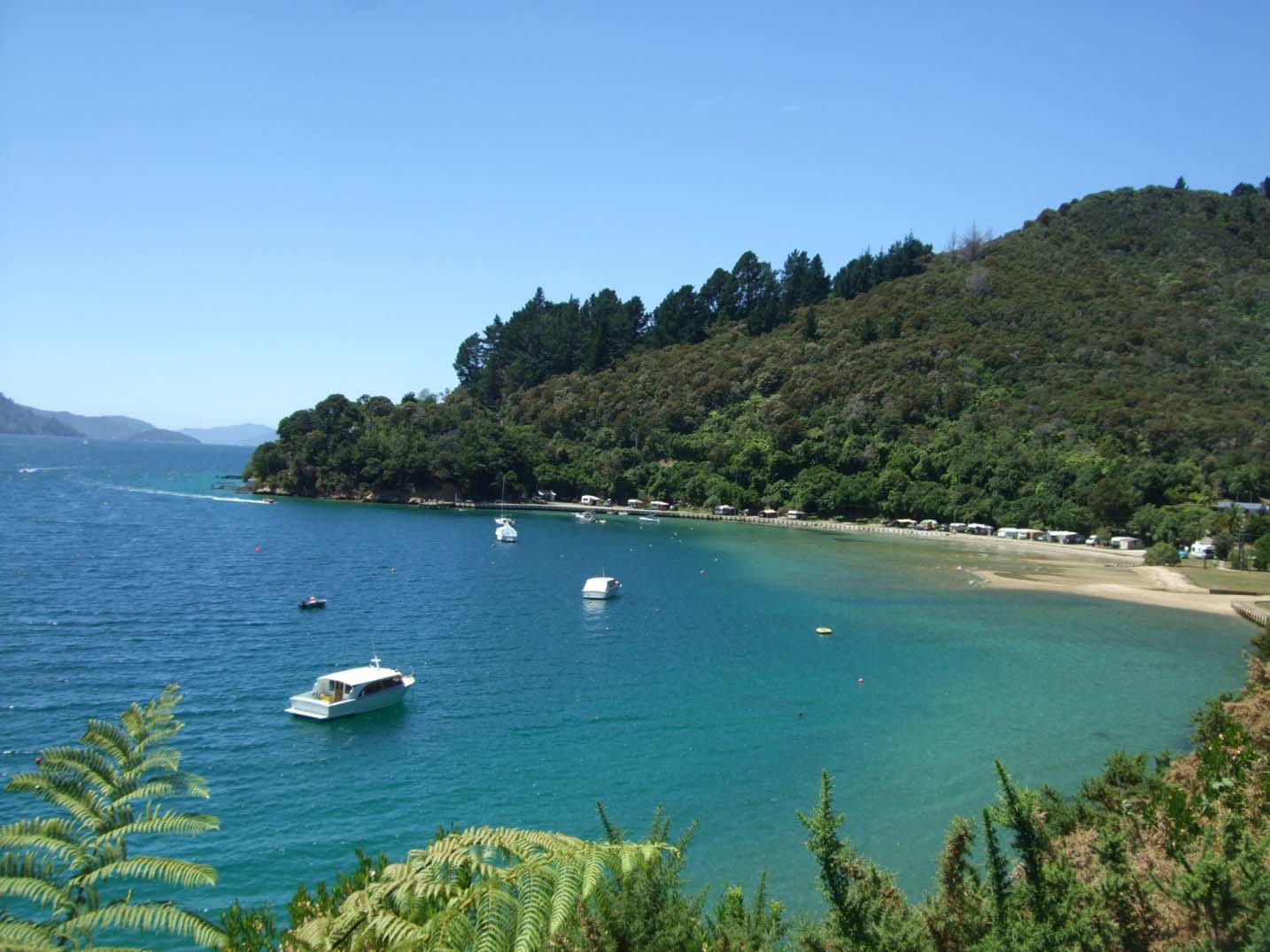
Before you leave for your Working Holiday to New Zealand
Luckily, for most people, you don’t need to do much in preparation for a Working Holiday in New Zealand. If you prefer to be spontaneous, New Zealand is a great place to choose for a working holiday.
If you like planning, New Zealand is still an awesome choice too! Here’s exactly what you must do before leaving for your working holiday in New Zealand.
How to apply for a New Zealand Working Holiday Visa
If you’re fortunate to be a citizen of the participating countries (Canada, many EU countries, USA, UK et al) then you can get a one (1) year Working Holiday Visa (WHV), easily available from the New Zealand government’s immigration website .
When I say easily available, I mean for most countries there are unlimited places (no quota) and you can apply at any time of the year.
The application is online, simple to complete and the processing time is only 48 hours for most applicants!
The conditions for the working holiday visa application usually state (it varies according to nationality) that you must;
- be over 18 and under 30 (though some schemes allow people up to 35)
- have a clean criminal record
- have a passport valid for 3 months beyond the visa length you are applying for
- be of good character and health
- have proof of funds (to support yourself) to show on arrival
- Proof of onward flight from New Zealand or enough extra funds to pay for one
- Have not participated in the working holiday program for New Zealand before
Note that working holiday applicants do not need a job lined up in New Zealand.
23 month working holidays in New Zealand
British citizens and Canadians are able to select a 12 month or 23 month visa at the time of application. For the 23 month visa you will need to get a medical/x-ray certificate .
If you select the 12 month visa option and then once in New Zealand want to stay longer, you can apply for the extension if your first visa is still valid. You will still need to get the medical/x-ray certificate.
If approved, you will receive a New Zealand Working Holiday visa letter.
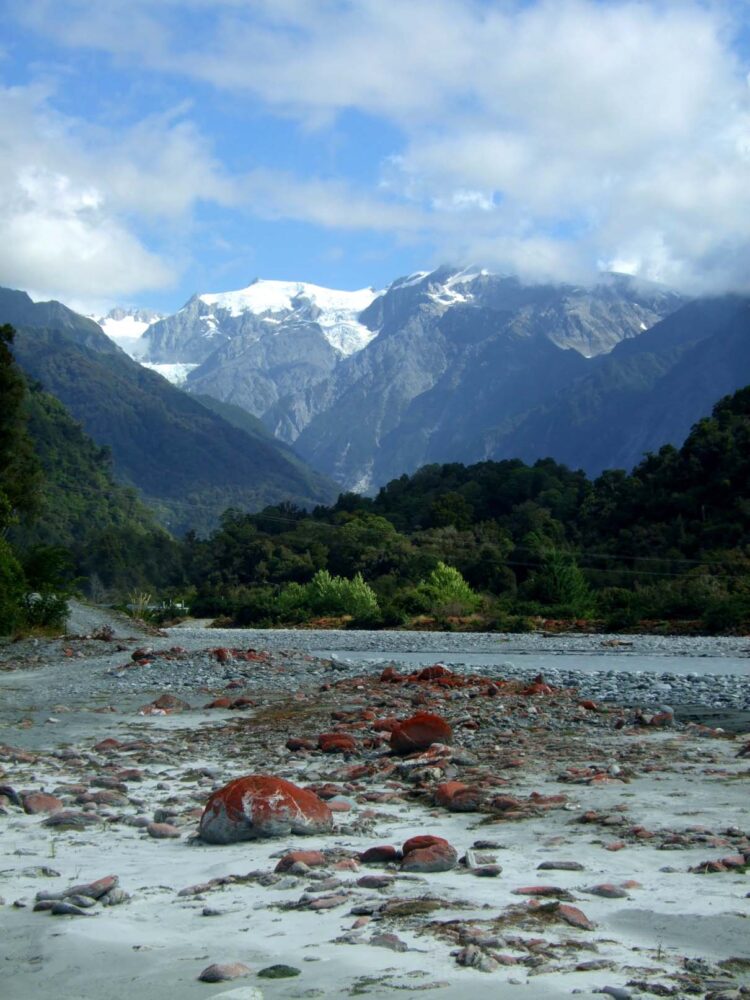
New Zealand working holiday insurance
Having travel insurance (including medical coverage) is mandatory when doing a working holiday in New Zealand. The NZ government states that working holiday participants must ‘maintain your medical insurance while in New Zealand.’
They continue to say ‘ we may ask to see evidence you’re insured when you arrive in New Zealand.’ If you arrive in New Zealand without travel insurance, you may not receive your working holiday visa.
These are not the only reasons to have travel insurance for your working holiday in New Zealand. It is very unlikely anything unfortunate will happen during your trip, but it is better to be safe than sorry.
12 months is a very long time to be away from home. I never personally travel without travel insurance.
True Traveller offer insurance for British and EU citizens on New Zealand working holidays up to 18 months in length. Unlimited visits home are allowed. Coverage can start when already travelling and trips starting with a one-way plane ticket are fine.
Read More: The Best Travel Insurance for Working Holidays to New Zealand
As mentioned before, you will need a lump sum of money in your bank account in order to satisfy the NZ immigration officials that you can support yourself while job searching once in the country.
The amount depends on your country; refer back to the Immigration website for the exact amount. To prove this amount to the officials, you will need to show a recent bank statement.
Accommodation in New Zealand on a working holiday
It is a good idea to book at least a few days (four or five nights is ideal) accommodation for your arrival in New Zealand. For a lot of people, this will be a hostel bed/room, hotel or Airbnb (never used Airbnb before?
Get a discount off your first stay when you sign up via this link ). If you are planning to stay in one of New Zealand’s main cities, you may want to book for a week or two to allow time for searching for long-term accommodation.
Looking to book a stay in Auckland? Check out these great options:
Metro Adventurer Backpackers – Awesome central location
City Lodge Backpackers Accommodation – Good value for couples
Hobson Lodge – Highly rated on Booking.com
Job hunting on your New Zealand working holiday
You may be thinking about trying to organise work before you even arrive in New Zealand. Yes, this is possible, but I don’t recommend trying too hard.
The kind of work available for people on WHVs in New Zealand is, on the whole, casual.
I will go into this later, but in essence; most of these employers are looking for immediate help and the hundreds of travellers currently in New Zealand at any given time are able to satisfy that request.
You can still try and make some in-roads before you leave your home country but it is pretty unlikely that a typical backpacker employer is going to wait until you travel the thousands of kilometres to get to New Zealand.
After all, worst case scenario, you might chicken out last minute, or get rejected at immigration.
There are some exceptions, such as au-pairing. Often these positions are advertised in advance so the parents can make sure they choose the perfect person to look after their child(ren).
There are however a couple of things that you can do regarding work before leaving:
- Rewrite your resume/CV . Resumes are always a little different in every country, so make sure yours is a similar format and style as those in New Zealand. This careers website is quite helpful. Save your CV onto a USB stick or on Google Drive, so you can easily update and print out as needed in New Zealand.
- Make sure your phone is unlocked. Unlocking your phone at home so you can use a New Zealand sim card after arriving will save time later. A local mobile phone number is important for finding work.
On arrival in New Zealand
Your working holiday visa application was approved and you have the (usually) long flight out of the way. Welcome to New Zealand! Getting through immigration is the first, but necessary part, of your New Zealand working holiday.
Immigration in New Zealand
- Have your passport, visa confirmation print-out and proof of funds evidence (recent bank statement) ready to show the immigration officer on arrival.
- You may not be asked for any of this documentation besides your passport but you absolutely need it.
- All being well, you will receive a stamp in your passport that shows you are legally entitled to work in New Zealand until your visa runs out.
TIP – New Zealand has very strict rules concerning what items can be brought into the country. It is illegal, for example, to bring in most types of food. This includes things like cheese and fruit. Do not risk it!
Now you’ve probably arrived into Auckland, Wellington or Christchurch. Either way, you’re in a city with all the amenities you will need to start your New Zealand working holiday.
Two things you do need and should try and sort shortly after arriving in the country:
- A bank account
- IRD tax number.
- You then may also want to transfer money from your home country
Bank account
Having a bank account is essential if you plan to earn any money while in New Zealand on your working holiday.
Not only is it required to get your IRD number (see below), it is also useful for day-to-day expenditures since many debit/credit cards rack up high fees when used abroad.
With most bank cards in NZ you can use them like a debit cards to pay for goods using the EFTPOS system. I opened a free basic account with the Bank of New Zealand.
I supplied:
- My passport
- Proof of address
- A small deposit
Some banks charge a monthly fee to use them. It seems common for a fee to be charged if you withdraw money from ATMs not owned by your bank.
An IRD (Inland Revenue Department) number is an identifier that workers must have to earn money in New Zealand. If you do not have an IRD, you will automatically be charged 45% income taxes on your wage.
Since 2017, it has been possible to apply for your IRD online on the Inland Revenue website . This can only be applied for after arriving in New Zealand. You will need:
- Passport details
- New Zealand Application Number (from visa letter)
- Most recent overseas tax number (if you have one)
- Proof of an NZ bank account (bank statement showing name, account number and bank stamp)
Thinking of tax and earnings, did you know you may be eligible for a refund if you complete a tax return in New Zealand (or after leaving)?
One of the quickest and easiest ways of doing so is to use Taxback.com . Their average tax return refund for working holiday participants in New Zealand is $500.
Transferring Money from your home country
There are a dozen different methods to accessing money across the world. Some examples include:
- Bank transfer
- Prepaid currency cards
The easiest and most cost-effective way to use your money from home is to send it to New Zealand via a specialised online money transfer service.
These work on a peer-to-peer system in which the host website does not directly transfer money across borders, but instead re-routes payments between people in corresponding countries. I recommend:
- TransferWise – 1.2% fee over $333CAD transfers from the UK. I used TW regularly and it usually takes 48 hours to transfer between accounts. One discounted (or free) transfer with this link.
- CurrencyFair – Fixed 3 Euro transfer fee and 0 to 0.5% (total transfer amount) service charge.One free transfer with this link.
For both of these services, the fees are lower than any other method and the exchange rate matches the ‘mid market rate’ – the one on live currency websites like XE .
Each website is also upfront concerning the applicable fees and exchange rate. Depending on how much you are transferring, one may offer a better deal than the other.
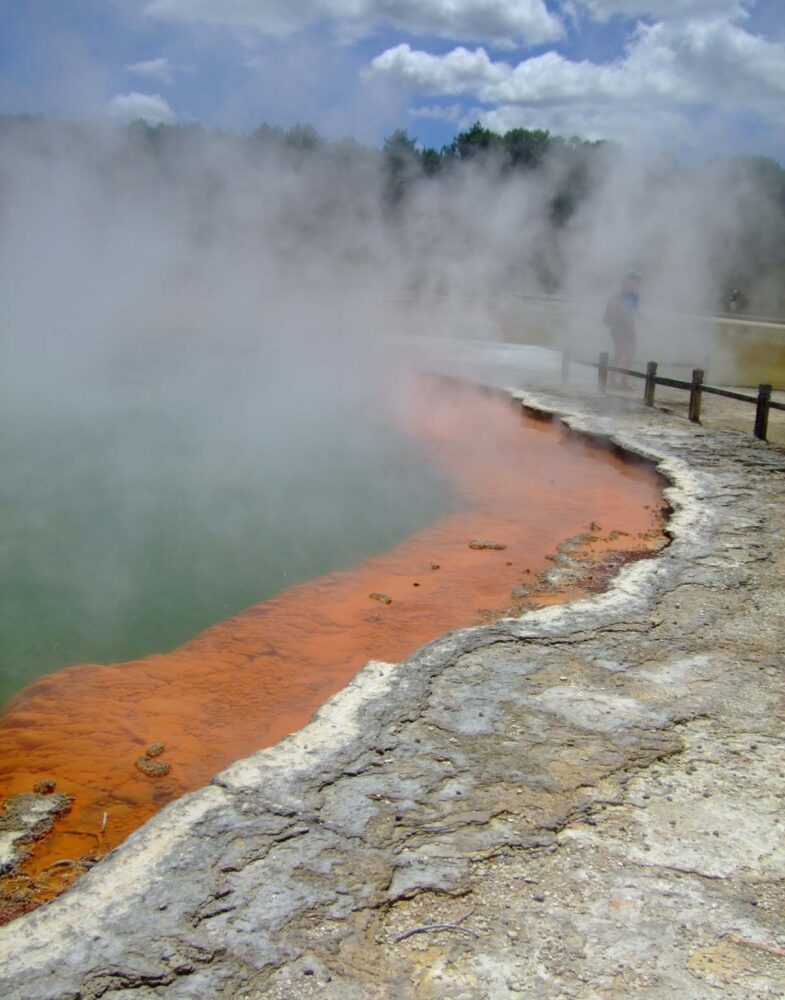
Finding Accommodation in New Zealand
Where you choose to stay entirely depends on your available budget and your personal plan for your working holiday in New Zealand.
Hostel life in New Zealand
Hostels are the most common form of accommodation available for travellers in New Zealand. They usually offer shared and private rooms with either shared and en-suite bathroom facilities for travellers. There is usually a shared kitchen and living space.
Some hostels are much bigger, cleaner, louder and more unique than others, but in all you will find somewhere to sleep for around $25-35 a night, depending on various factors including location and facilities. Some hostels have breakfast available and bars, others hot tubs/spas.
Some of the best hostels I stayed at in New Zealand included:
Hopewell Lodge, Marlborough Sounds
Te Nikau Retreat, Punakaiki
Lakefront Lodge Backpackers, Lake Tekapo
Choosing a hostel
There are hundreds of hostels all over New Zealand, most in cities and towns but plenty out in the middle of nowhere, in places you wouldn’t expect. Some are independent, others part of a chain such as Base . I used the BBH guide to choose many of my hostels.
The listings feature short description of each independent hostel with a location map and ratings from travellers. My favourite NZ hostels were all in the BBH guide.
Nervous about staying in a hostel?
If you’ve never stayed in a hostel before then you’re probably thinking that the idea of shared rooms/facilities doesn’t really appeal that much. Hostels, however, are the best way to meet fellow travellers of all ages, nationalities and walks of life….and are also the cheapest place to stay temporarily by a long shot!
Quite a few people in your first hostel in Auckland, Wellington or Christchurch will be in a similar situation to you; just arrived in New Zealand and am looking for work or travel opportunities.
Others will be halfway through their trip, or right at the very end. Regardless, you’ll be able to make friends and get tips and advice from people who are, who have been, in a similar position to you.
Other temporary accommodation options for working holidays in New Zealand
An alternative to hostels is Airbnb. Airbnb allows you to rent a room or entire place in both popular and unusual locations all over New Zealand. Pricing can be very reasonable compared to hostels for couples or groups of travellers.
Travellers with a larger budget may consider booking a hotel to stay in occasionally. If doing so, I’d highly recommend to look out for those with some of kitchenette so you can at least make some of your own meals.
Long stay accommodation in New Zealand
Most hostels allow long stay travellers. Some travellers work locally and just want to live in the hostel for convenience/cost (a cheaper long stay rate can often be negotiated). Others decide to stay and work within the hostel in exchange for accommodation.
Otherwise, you have the option of finding private accommodation – either through private advertising on the internet ( Trade Me is popular) or through a rental agency.
You could also group up with other travellers from your hostel if you find others wanting to do a similar thing.
There are also opportunities to find jobs with accommodation included or offered in exchange for work. See ‘Work’ section for more info.
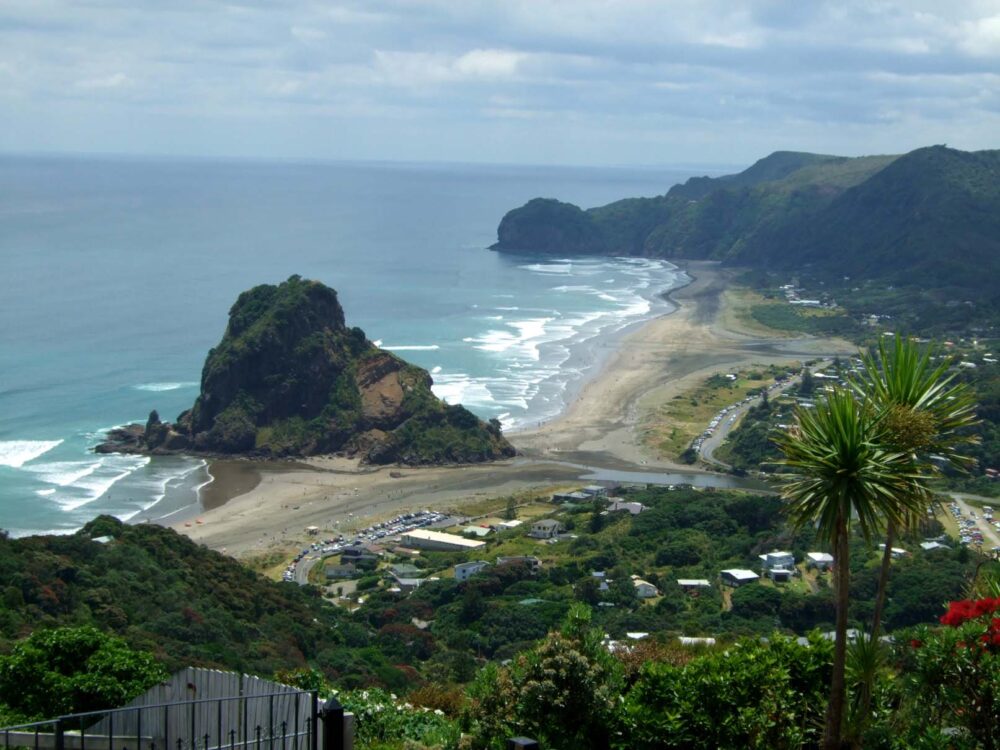
Working in New Zealand
Time to earn some money! New Zealand has a plentiful casual job market, though the availability and type of work does vary throughout the year.
Types of New Zealand working holiday jobs
The most common jobs for travellers in NZ are those of a casual nature or in industries with a high turnover i.e. hospitality, tourism and agriculture. Of course, there are exceptions (many travellers decide to work office jobs in the cities), but this is the general trend.
Keep in mind that the WHV program offers only a one-year visa (with possible extension for some nationalities) and so this does limit your employability somewhat.
Another thing to keep in mind is what the WHV actually is – for a working holiday . These programs were designed to allow people to travel long-term in a country and then occasionally work to top-up funds.
Luckily, NZ has huge tourism and agriculture industries and these handily offer lots of job opportunities to travellers.
In my experience, the majority of working holidayers find work in bars, restaurants, hostels (reception and cleaning), ski resorts, shops, offices (temp work), on farms (fruit picking and other manual work) and also in private homes as au pairs.
Where to find work
My top three resources for finding work on a WHV in New Zealand would be:
- Trademe.co.nz
- Backpacker Board
Both Jean Robert and I found work through the Backpacker Board job listings section. Other places to look include hostel noticeboards, local newspapers and directly on business websites.
Working in exchange for accommodation
Some of these jobs will be paid; others will be in exchange for accommodation and/or board as well (food). Exchange work isn’t necessarily bad; it can set you up with a place to stay really easily and quickly and also will most likely provide you with a unique NZ experience.
One of the most common exchange work opportunities is in hostels; many will advertise for cleaners to work 2/3 hours a day in exchange for a dorm bed.
This is a pretty good deal if you need something to tide you over while looking for long-term paid work or are unsure what to do next. Accommodation is often the biggest dent in daily expenditure, so cutting that out can really help your budget, especially if it’s near the end of your trip and/or is pretty low!
Both my boyfriend and I had ‘exchange’ jobs in NZ. I was working 17 hours a week in a local shop in exchange for accommodation in a shared house. Jean Robert worked 22 hours a week at the same shop a few years later and received cooked meals too. He later also worked as a paid chef in a restaurant and also as a Dive Master.
All about WWOOFing
While browsing job listings you might see positions referring to ‘WWOOFer wanted.’
The terms WWOOFer and WWOOFing are used pretty loosely in NZ, but they refer to the World Wide Opportunities on Organic Farms program (sometimes known as Willing Workers on Organic Farms instead).
The idea of people working for a number of hours a day in exchange for room and board is so widespread that Kiwis often use the term to advertise for helpers, even if not part of the organization.
The actual WWOOF program requires you to pay to sign up and receive the host listings. You should note here that an ‘organic farm’ (another loose term!) can mean anything from a full-on dairy farm to a yoga retreat with an organic vegetable patch.
Nonetheless, you’re sure to have a uniquely NZ experience wherever you end up, especially as many of the hosts lead what you’d call an ‘alternative lifestyle.’
I’ve never done ‘proper’ WWOOFing and I’ve heard good and bad tales. Mostly good overall, but it is clear that some hosts work their WWOOFers harder than others.
Fruit picking in New Zealand
If you’re not adverse to a bit of hard (and dirty) work and need a bit of cash, then consider fruit picking.
The main areas for fruit picking area the Bay of Plenty, and Hawke’s Bay on the North Island and Marlborough on the South Island.
There are many hostels in these areas that are popular with traveller working a picking season – consequently, some feel more like shared houses than hostels.
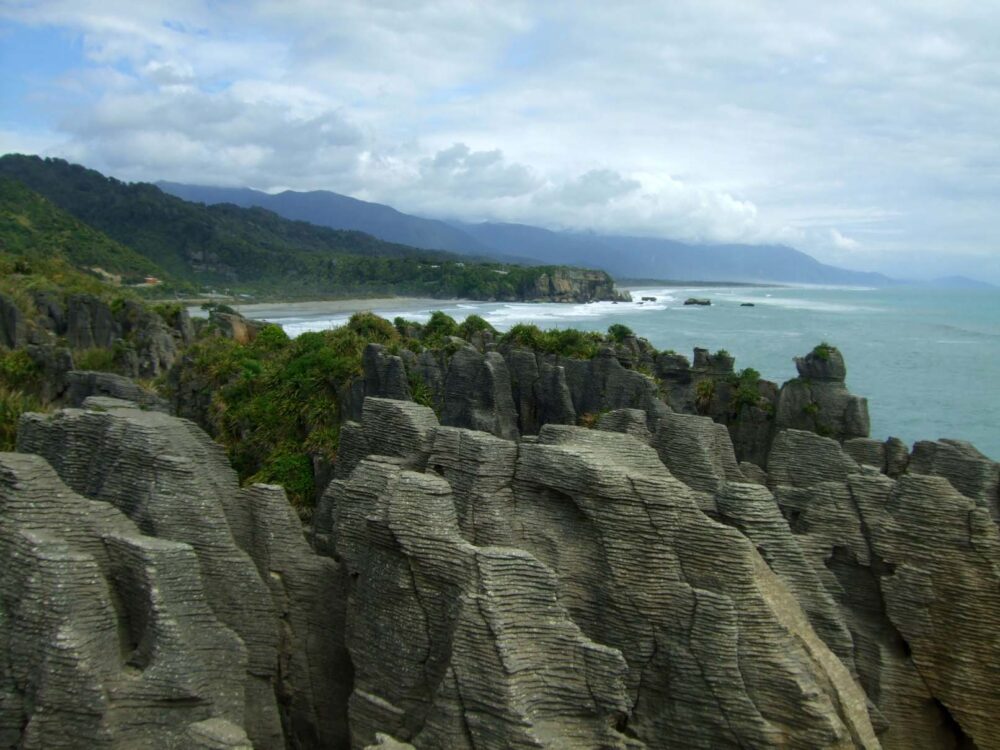
Getting around on your New Zealand working holiday
One of the main reasons why I consider New Zealand to be such a great destination for so many types of travellers is the many transportation options.
Whether you decide to travel for six months or just two weeks of your working holiday, there is a travel method for you.
Hiring a car or campervan
Great for: short trips to New Zealand – with your own transport you’ll be able to fit as much or as little travelling in as you want and see exactly the sights you came all this way to see.
The hiring rules in NZ are pretty awesome in that the minimum age for some companies is 18, meaning even those straight out of school/college can hire a vehicle.
One big catch though; the hirer (main driver) usually needs to have a credit card. Another issue is that young drivers (generally under 25) may have to pay more per day than an older driver, and also will have a higher excess reduction cost.
This is another cost you have to pay per day that takes the excess down (i.e. the amount you’d have to pay before the insurance company would) if you damage the car.
Keep in mind that there are a few roads (like 90 Mile Beach in Northland) that most car rental company do not allow you to drive on.
Ace is my recommended rental car company – I hired with them a number of times for as little as $11/day.
Jucy , Spaceship and Escape all offer great campervan rentals in a variety of locations around New Zealand.
Buying a car or campervan
Great for: People who want the ultimate in flexibility during their working holiday in New Zealand.
Seriously consider this option if you’re visiting New Zealand for three months or more. The second hand car market in NZ is strong, making it easy to buy and sell a cheap car (less than $1000) quickly and easily.
Car insurance is not mandatory, though if you choose to buy it the prices are pretty reasonable. If planning to sleep in your vehicle or buy a campervan, please read the Freedom Camping rules in New Zealand.
My guide to buying and selling a vehicle in New Zealand is featured later in this article. My absolute favourite thing I did in New Zealand was buying my car. The freedom it gave me to visit every corner of the country was incomparable.
New Zealand Buses and shuttles
Good for: Travelling between cities and main towns, visiting ‘main’ attractions, short and straightforward visits, scenic routes, shuttles
If you just need to get from your local city or town to another for work purposes or to visit a friend, there are bus and shuttle companies that can help you for a really reasonable cost.
If you’re WWOOFing your way around New Zealand then this transport will especially work well for you. Yes, you could travel New Zealand at leisure using these too, but you’d be getting a bit of a limited experience. I say this from experience!
I initially planned to use the national buses at first, but then the limited timetables (sometimes only every day or every other or just in one direction!) slowly drove me mad.
I was having to plan my trip around where the buses actually went and when. It wasn’t really the travelling experience I had in mind!
SKIP offers cheap bus services on the North Island, while Atomic Travel operates routes on the South Island. InterCity is New Zealand’s national bus service.
Railway transport in New Zealand
The train network in New Zealand isn’t extensive but there are three main routes of appeal to visitors, mostly for the surrounding scenery rather than convenience.
The TranzAlpine is known as one of the best rail journeys in the world – it travels between Christchurch and Greymouth on the South Island’s Wild West Coast in four and a half hours.
Tickets for the TranzAlpine, CoastalPacific and Overlander are available from KiwiRail .
Local post service
There was a small comment in my New Zealand Lonely Planet referring to the post service on the East Cape (the area between Gisborne and Opotiki on the East coast of the North Island) offering travellers fixed priced non-stop shuttles.
I organised this with the I-Site (visitor information centre) in Gisborne. It was a five hour trip with the local postman from Gisborne to Hick’s Bay (at the top of the Cape) for $60, leaving at 10am.
We stopped many times en-route, and delivered some ‘special’ items….such as a cold Burger King meal from Gisborne, purchased some four hours ago.
A few days later I then took another post bus from Hick’s Bay (I was picked up at my hostel at 6am) all the way to Whakatane in the West, again for $60.
This one was a little shorter, but it took still much longer than a normal car would have done since we stopped everywhere – my driver basically knew everyone on the Cape!
It was definitely an interesting experience, especially in such a less-touristed area such as the Cape. Ask at a local I-Site to see if a post bus transport is available.
Hop-on, hop-off buses
Good for: Social travellers, action packed short trips, a balance between independent and organised travel, non-drivers
Ah, the ubiquitous hop-on/off buses. A perfect match for those wanting company and lack of organization stress but not to be on a tour bus. These buses offer beaten track routes on both islands, with many different route options.
The bus pass price only includes the bus transportation and sightseeing stops – no accommodation or attraction/activity costs are included.
Some of the passes offer special experiences that you might not otherwise be able to have – the Kiwi Experience’s East As pass gives the opportunities to meet some local Maori families and have a full tour of the local Marae (religious meeting house complex).
How hop-on hop-off buses work in New Zealand
The idea is to buy a pass and then use the bus as a means of transportation (that does stop at attractions and for activities on the way) and to meet other travellers.
The driver acts as a quasi-tour guide and can book hostel accommodation and activities ahead of time. The bus company will ‘recommend’ one hostel that usually has some sort of sponsorship deal with; often they are the large chain hostels such as Base .
If you find a stop you like, you can stay there and book onto a different bus to get to your next destination. The typical traveller on these buses is under 35 and looking to supplement their travelling with some late nights along the way.
Of course, there is always a variety of types of people and ages on each bus, so if you don’t click with the one you’re on, you can always get off and book onto the next one.
The main hop-on hop-off providers are Stray and Kiwi Experience . The latter has a more party-hard reputation than the other, but aside from that, they are pretty similar.
Traditional tour companies
Good for: short stress-free trips, meeting other travellers
I’m not going to write too much about tours as I’m sure the benefits and disadvantages are pretty obvious; you’re either a tour person or not.
There is a huge variety of tours in New Zealand; from luxury wine and food trips to back-to-basics camping and trekking/tramping excursions.
At first glance, the prices might seem very expensive but don’t forget that most the time this cost includes accommodation and some meals.
Some tour operators include Flying Kiwi (camping) and Relaxing Journeys (small group)
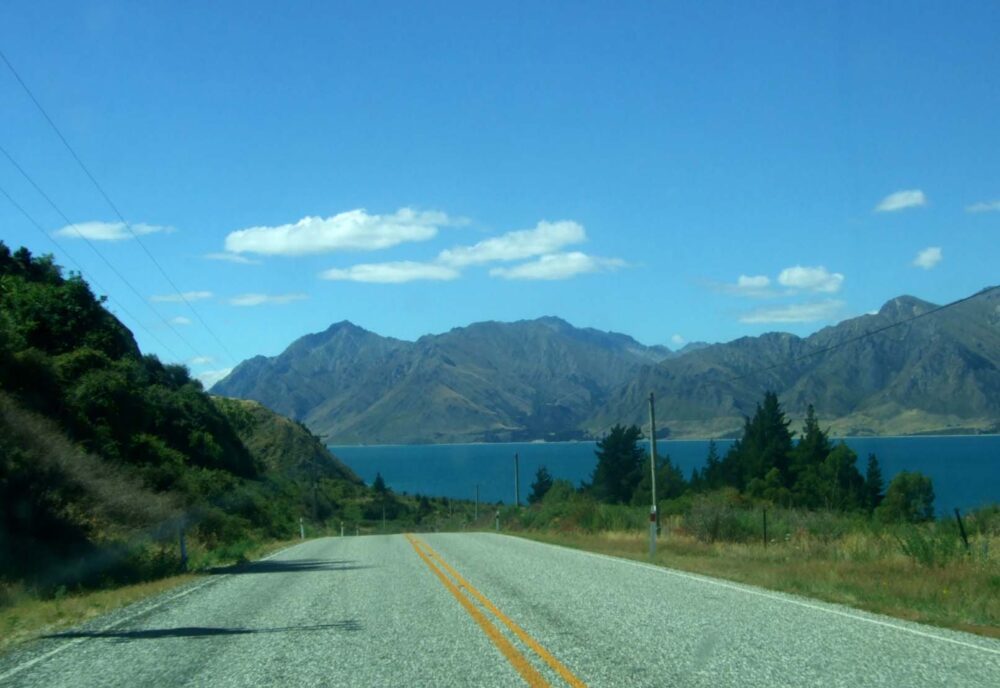
How to buy a vehicle in New Zealand
Buying a car in New Zealand was one of the best things I did during my working holiday. I really didn’t intend to buy one at all; in fact, I was pretty against it for my first few months in the country. I assumed it would be too much hassle, too expensive and besides, what did I know about cars?
Yes, my $400 car broke a few times, didn’t end up being SO cheap in the end, and I still don’t know a thing about cars, but it was so worth it.
I went where I wanted, when I wanted, and I had such a fantastic experience doing it.
Whether you’re just staying in New Zealand for three months or the full year, I really would urge you to throw the bus timetables and route maps out, and go your own way.
A plentiful market of second hand cars
There is a huge market for budget second-hand cars in New Zealand, including those bought and sold by backpackers. If you decided to watch hostel noticeboards and online adverts closely over a long period of time, you would be able to spot the same vehicles coming up for sale again maybe every six months, a year, two years.
Not only is the market for cars booming, there is also a large number of home-converted (as well as professionally done) campervans being consistently bought and sold every winter and summer season. I
t is not unusual to find fully-equipped converted vans complete with bedding, cooking pots and pans, AC adaptors (to charge laptops/phones), camping gear, guide-books/maps as well as station-wagons with merely a mattress slung in the back.
You only need to take a quick look on the NZ BackpackerBoard’s Car/Campervan noticeboard . Another good place to look is BBH’s billboards.
Practicalities of driving in New Zealand
For most visitors, you can drive on your home license for up to a year. If it’s not in English, make sure you have an accurate translation. If you’re staying for longer than a year, you can apply for a NZ license, as long as you have I.D. (passport) and proof of address in NZ. For more info have a look on the Transport Agency’s website.
Wondering if you’re up to driving in NZ? Well, I had limited driving experience in the UK since I’d only passed my test the year before and I managed it.
I LOVED driving in New Zealand – the roads are quiet, in good condition and there aren’t many of them (making navigation easy, especially outside of cities). One thing though, New Zealand roads are WINDY (as in curvy, not blowy).
Do not underestimate this….certain journeys will take you much longer than you would have expected, and it can get tiring. Allow lots of time to get to your destination, especially if you’re in a mountainous or rural area.
I found it all part of the fun personally, but it’s pretty important to know this if you’re on a bit of a tight schedule….or just end up staying in some places longer than you expect!
New Zealand does not have many freeways/motorways, the only ones are found in the larger cities and are neither very long or big.
Most ‘main’ roads are single carriageway roads, which you can overtake only in appropriate places (when it’s not too windy). There are single road bridges and seemingly endless gravel roads…but again, this is part of NZ’s appeal to me. If you don’t like it, stick to Highway 1 but you will miss out!
Price of second hand cars in New Zealand
The value and price of vehicles do vary depending on the season – in December and January prices will be severely inflated due to it being the high season, while in April and May you will have pick of the bunch. This is the time when many travellers leave before winter comes.
I was told so many times that I wouldn’t find a car for under $1000 (regardless of how good it was!) when I was looking in Christchurch in January, but I did.
I bought my car for $400 from a local resident rather than a traveller, and hence the price was a lot lower. Realistically though you should budget at least $1500 for a car, and $4000 or so for a campervan.
Bear in mind that you could always grab a deal, as often travellers don’t leave enough time before they fly out to sell their vehicle…and hence need to sell it fast.
I’ve heard stories of travellers buying a car for $50 or for the price of a beer. There was even one time where the seller just pinned the car keys to a hostel noticeboard before leaving for the airport.
Searching for a vehicle in New Zealand
There are lots of different ways to find a vehicle in New Zealand.
- If looking online, then check the BackpackerBoard and BBH listings as well as TradeMe and Gumtree.
- In person, look at local noticeboards (in hostels, supermarkets), roadside sales and newspapers adverts
- Talk to other travellers – you might be in luck and find someone in your hostel selling a vehicle, or knows someone who is.
- Of course, there is always the last resort of a car dealer too.
When you’re looking, keep in mind the car will need to have a valid Warrant of Fitness (WOF) and tax after you’ve purchased it. The WOF is a compulsory six monthly (yearly if it’s a new car) test ensuring a minimum standard of roadworthiness.
It is therefore preferable for you to find a car with a good amount of time left on the WOF certificate, or be prepared to put it through the test and possibly pay for repairs/improvements.
Tax is, of course, inevitable wherever you are in the world, and NZ is no different. It’s referred to as licensing fees (or just car/road tax) so the more your potential car has, the better.
Note that it’s not necessarily cheaper to buy a diesel car since owners have to pay additional road user charges per every 1000 kilometres!
Purchasing a vehicle in New Zealand on a working holiday
Found a vehicle that looks and sounds good? Here’s what to do next.
Legal check (optional)
First consider getting a legal check (Vehicle Information Report) and/or a pre-purchase mechanical check. The former makes sure that the vehicle isn’t at risk of being repossessed (due to unpaid bills) or isn’t stolen.
To do one, you need the vehicle number plate details and approx. $20. There are lots of companies offering the service online such as LemonCheck.
Mechanical check (optional)
A mechanical check covers more legal and safety requirements than a WOF check does. Even if a car has a current WOF, it might still be a lemon. Bear in mind that it still mind be a lemon AFTER a mechanical check – like mine! Checks cost around $150, depending on the garage.
Registration papers
Once you decided to go ahead and buy a vehicle, you will need to register it. You can either do this online or at the PostShop (bring I.D.) The seller will complete a similar form and post it off. The fee to buy a car is $9.
Once you’ve handed the completed form back (or done it online) you will have a transfer receipt, which shows that you now own the car. A certificate of registration will follow in the post to the address where you registered the car.
Vehicle licensing – car/road tax
Every vehicle must be licensed to drive on New Zealand’s roads. In other countries, this would be referred to as car or road tax. It is strongly recommended to buy a vehicle with a current license.
Renewing the license is easy – again, either head to the PostShop or do it online. It is possible to pay for 3, 6 or 12 months worth at a time.
Insurance (optional)
It is not compulsory to have car insurance in New Zealand i.e. you can legally drive without any insurance at all. Really! Now, it is really up to you whether you decide to buy it or not.
Ignoring the fact the fact that the car you’re likely to have is not worth a whole lot (and hence maybe not worth getting fire/theft coverage for) it is important not to forget about the risk of accidents.
While you might not be thinking about yourself too much, consider other people – if you don’t have insurance and then have an accident with another vehicle, you will most likely have to pay out money to the other people involved. This is a very good reason to get insurance.
I decided to buy short-term insurance to cover my South Island road trip. My rationale was that I would be driving a huge amount during this time, while when I was back at my job a few months later I would be hardly driving at all, save for a few long day trips.
I purchased Third Party insurance with BBH – the hostel group – as it just seemed like the easiest option at the time since I could buy it at my hostel. I’m sure there are cheaper or more extensive insurance policies out there, but as a quick fix this one isn’t bad! I never had to use it luckily.
So with that all done, you’ll have your own car – well done, you made a good choice and am now free to explore the wonders of New Zealand!
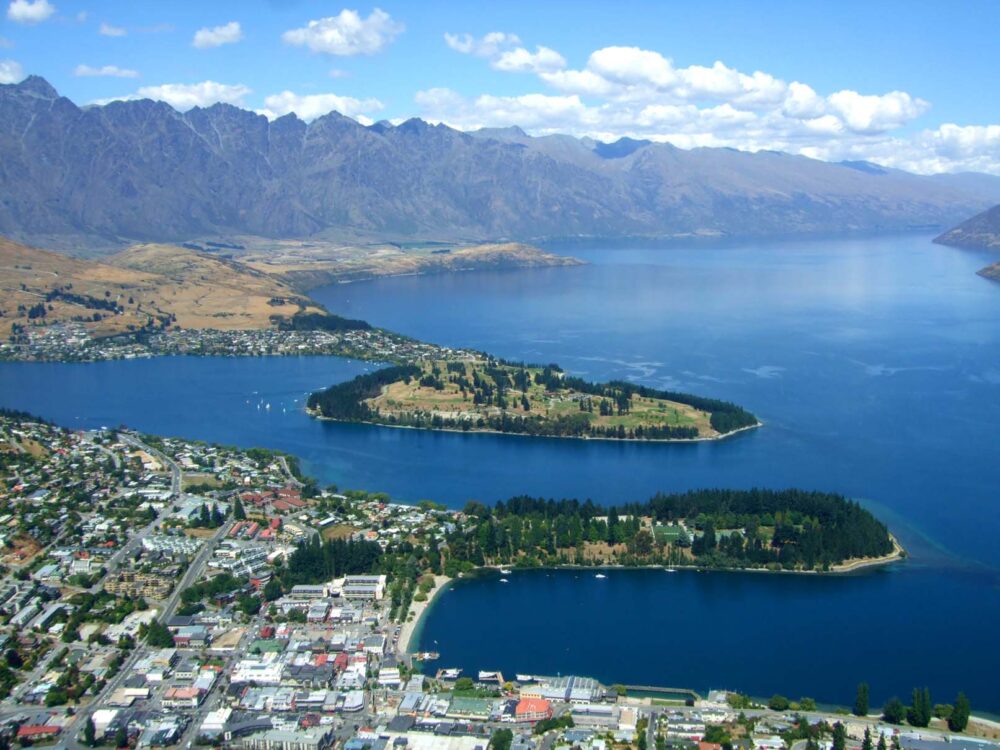
Working holiday in New Zealand: Frequently Asked Questions
If you’ve some got burning questions about going on a working holiday in New Zealand, you may just find the answers here. Still got a question? Ask in the comments following the post.
How much money do I really need for a New Zealand working holiday?
Firstly, I can’t recommend you take any less than the NZ gov requires you to….but on a practical level, it’s good to work out how much the first few months in NZ will cost you in case you don’t find a job so quickly.
The average hostel bed averages at around $30 so times this by 30, to get an average monthly cost for your accommodation. Times this by two or three and this is a good ‘buffer’ money amount to have.
Food-wise, if you’re from the UK or Canada or the US, change what you usually spend per week into NZ$ to create a weekly food cost figure. Yes, food prices are a bit different here and there, but largely it’s similar and this figure will at least provide you with an estimate of living costs.
Combine your accommodation and food costs, plus a decent contingency of three or four hundred NZ$ to cover travel and additional expenses and you have an idea of your absolutely basic cost to live in NZ for a few months.
Can I head out to New Zealand on a one-way ticket?
Yes, you can. The New Zealand government conditions state that you can arrive on a one-way ticket but you must have sufficient funds on entry to buy a plane ticket home.
A bit non-specific – how much exactly is enough? I would say a minimum of $1000NZD, which allows room for error.
I once purchased a return ticket to New Zealand for 520 pounds (including tax!) but it’s not worth getting into an argument with an immigration official about cheap flights…you’ll lose!
No-one will come to New Zealand with me and I’m worried about travelling alone. Will I be lonely?
Unless you are really anti-social and don’t stay in hostels, it is unlikely you will be lonely. For one thing, a lot of people travel solo in New Zealand, you won’t be the only one.
Hostels are social places, and as long as you’re friendly and open to meeting new people then you’ll be fine.
Remember, you always have at least one thing in common; a desire to travel and explore new places! It might seem intimidating, but the majority of travellers are very accepting and welcoming people.
You’ll probably find that you won’t be travelling alone for long; while exploring the South Island I had so many people who just joined me on my road trip for a few days, even a week or two, and then went off to do their own thing afterwards.
I gave rides to people from my hostel to the next town, picked up hitchhikers on the road, made new traveller friends in every new hostel – I really didn’t spend many days truly ‘alone.’
And of course, on my last trip to NZ I was travelling solo, but ended up meeting Jean Robert…and now I hardly ever travel on my own!
Isn’t it a bit scary to go and live on the other side of the world?
Maybe, but I assure you that New Zealand is one of the most welcoming and easiest countries for a first-time traveller to visit or live in. Plus, if you’re from the US/Canada/UK then it’s English speaking and you have little excuse!
A huge proportion of travellers currently in NZ at any one time are actually German speaking, which means you have even less to worry about than the average backpacker.
The idea of going to live in a foreign country sounds scary when you’re sat at home just researching online, but as soon as you land you’ll realise it’s really not that alien.
Try and ignore the inevitable people who will tell you how brave you are (for going to live in another developed nation? Never understood that one) but if you can’t, have a look at New Zealand close-up using Google Streetview. View Queen Street in Auckland or Courtenay Place in Wellington and you’ll soon feel less intimidated.
Before you go, you can plan everything down to detail should you wis. The wonder of the Internet! On arrival or at any time after, you can easily Skype home or a friend if you’re still concerned.
If things really don’t go well for you, then you can fly home. It’s not the end of the world. I really would urge you to try and see if it’s for you, you might surprise yourself.
What if I don’t find a job on my working holiday?
As explained previously, there are a lot of casual work opportunities available in NZ. If you’re not picky (wanting a high paid long term job or one in a specific industry) then it won’t take you long to find a position.
Keep an eye on hostel noticeboards and the Backpacker Board website and move FAST.
If you’re open to working for accommodation then even better! Even temporarily, this can really help with finances and get you some NZ work experience.

Adventure in your inbox
Subscribe to our monthly email newsletter and receive a round-up of our latest outdoor adventures plus other exciting beyond the beaten path destinations
We never share your information with third parties and will protect it in accordance with our Privacy Policy
Check out these other New Zealand posts next

Sunshine Coast Trail Huts Guide: The Best Places to Stay
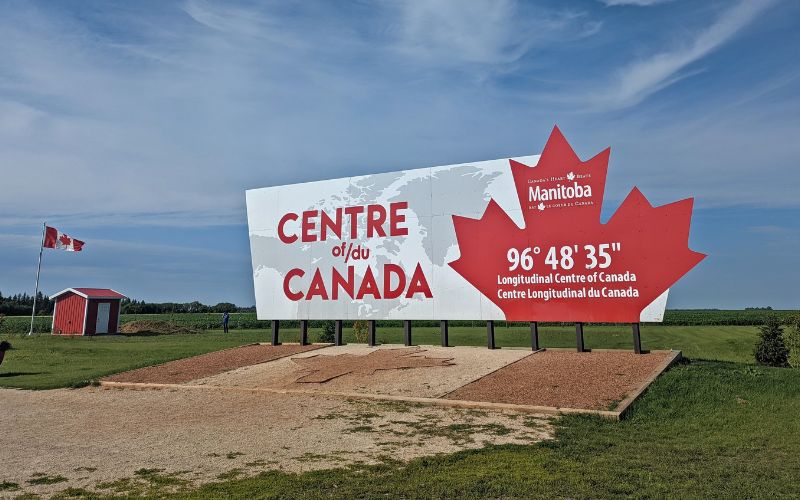
Toronto to Vancouver Road Trip: 24+ Great Places to Stop
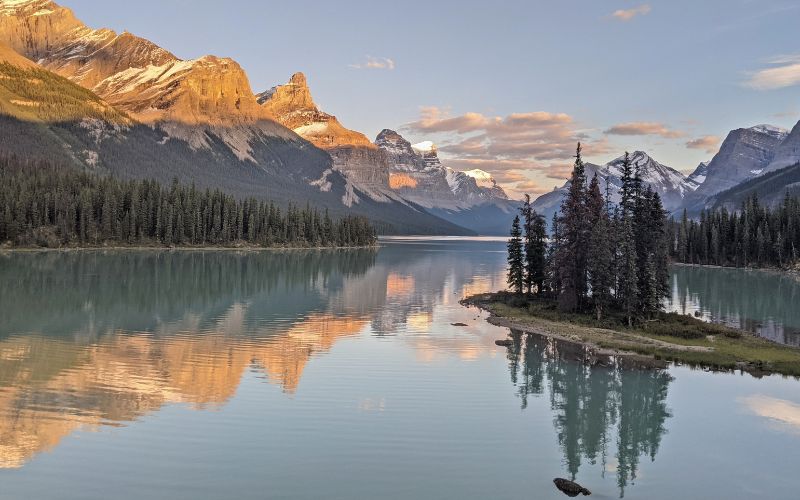
Spirit Island: Complete Guide with Map, Paddling Details, Boat Tour + More
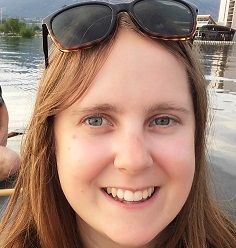
One half of the Canadian/British couple behind Off Track Travel, Gemma is happiest when hiking on the trail or planning the next big travel adventure. JR and Gemma are currently based in the beautiful Okanagan Valley, British Columbia, Canada
Wednesday 7th of September 2022
I already have a working holiday visa and haven't been able to use it due to Covid and starting Uni instead of going to NZ. Now my Visa expires in two weeks and I can only have one working holiday visa in my lifetime. But I want to go work in NZ after my bachelors degree. I can't reach the immigration NZ hotline due to high demands. Do you know what happens if I don't use the visa before it expires? Will I be able to apply again? Thanks for any information you might have!! Sophia
Thursday 8th of September 2022
I do not keep up to date with NZ working holiday rules, but to my understanding, the government recently gave an extension to people who were unable to activate their working holiday visa due to Covid. If you don't activate your visa, then it counts as participation and you wouldn't be able to apply again, except through a working holiday company like
Thursday 28th of July 2022
Great article. I have a question though, in the present day, is this "can only work for 12 months even if you have a 23 month visa" still true? I haven't seen mention of this anywhere else, either on govt website, other blogs, I've never seen it mentioned. Is there somewhere it officially states that? Maybe I'm missing something...
Sunday 7th of August 2022
I haven't updated this article in a few years and with a quick google, it does seem like things have changed. Great to hear! Thanks for pointing this out.
Monday 2nd of May 2022
Hi there! Your post is fantastic. I am really considering coming to NZ for 2 years starting January 2023. I was wondering, if I am on the 23 month visa, and I leave the country for a month, does mean an extra month will be added to my visa since I left NZ for a month? Or does it just mean that I have exactly 23 months to be in the country. Thanks so much! Masha from Canada
Glad this post could you help. If you leave the country, your visa will continue to run. The time on it is not stopped if you are out of the country. So if you leave for a month, you'll 'lose' one month of your visa.
Saturday 25th of May 2019
Incredibly helpful! Thank you so much :)
Tuesday 10th of November 2015
Thanks for the post, very useful :) I'm thinking about applying for a 23 month WHV, do you know the best insurance policies that would cover that long a time (I notice the one you mentioned only covers 13 months). Also, I hear that if you're planning on staying (and driving) in the country for more than a year you have to get a NZ driving licence, is this true and how would you go about it? Do you think it would be better just to go for 12 months? Thanks! :)
Hi Bethany,
Check out this post here for more info on insurance for working holidays. https://offtracktravel.ca/choosing-travel-insurance-for-your-working-holiday/ Alpha and True Traveller are the main providers for long term insurance for British working holiday makers, with the latter being my preference since they allow unlimited trips home.
As for drivers licenses, you need to change to a NZ one after a year, see here https://www.nzta.govt.nz/driver-licences/new-residents-and-visitors/driving-on-nz-roads/ It's a simple swap though if you're from the UK - you don't have to take a practical test.
It really depends what you want for your NZ experience - you can't work for longer than a year but maybe you like the idea of working for a year and then travelling for the rest of the time. New Zealand really is a wonderful country to live and travel around. :)
- Travel Tips
- New Zealand
- Southeast Asia

How Long Should You Travel For?
7 things to do in every country you visit, best travel apps, 10 things to do before your big trip, best shell beaches in new zealand, best tramping food in new zealand, campervanning in new zealand: guide to new zealand van life, the complete guide to cooking in a campervan in new zealand, southeast asia packing list, how to stay healthy on the road.
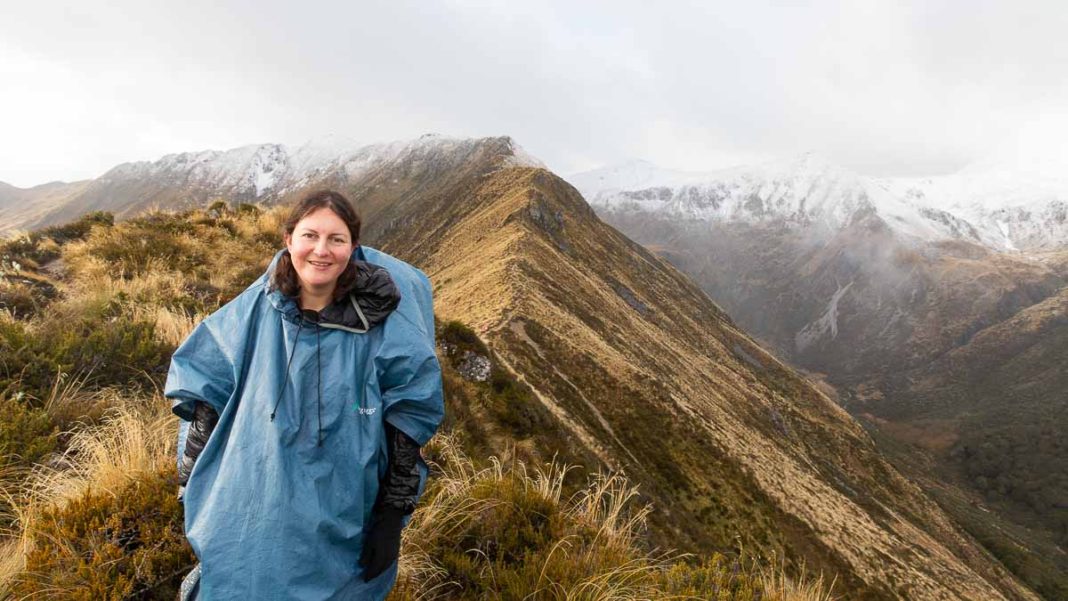
- Destinations
Travel Blogger’s Guide to the New Zealand Working Holiday Visa
Getting to New Zealand on a working holiday visa has been quite a journey: it has felt like a series of diplomatic hurdles that either were surprisingly difficult, stupid easy, or just required some patience and perseverance.
In this blog post I’ll detail everything you need to do to live and work in New Zealand for a year: how to get a working holiday visa, working holiday visa advice, obstacles you might face, and everything you need to do on arrival.
Table of Contents
What is a New Zealand Working Holiday Visa?
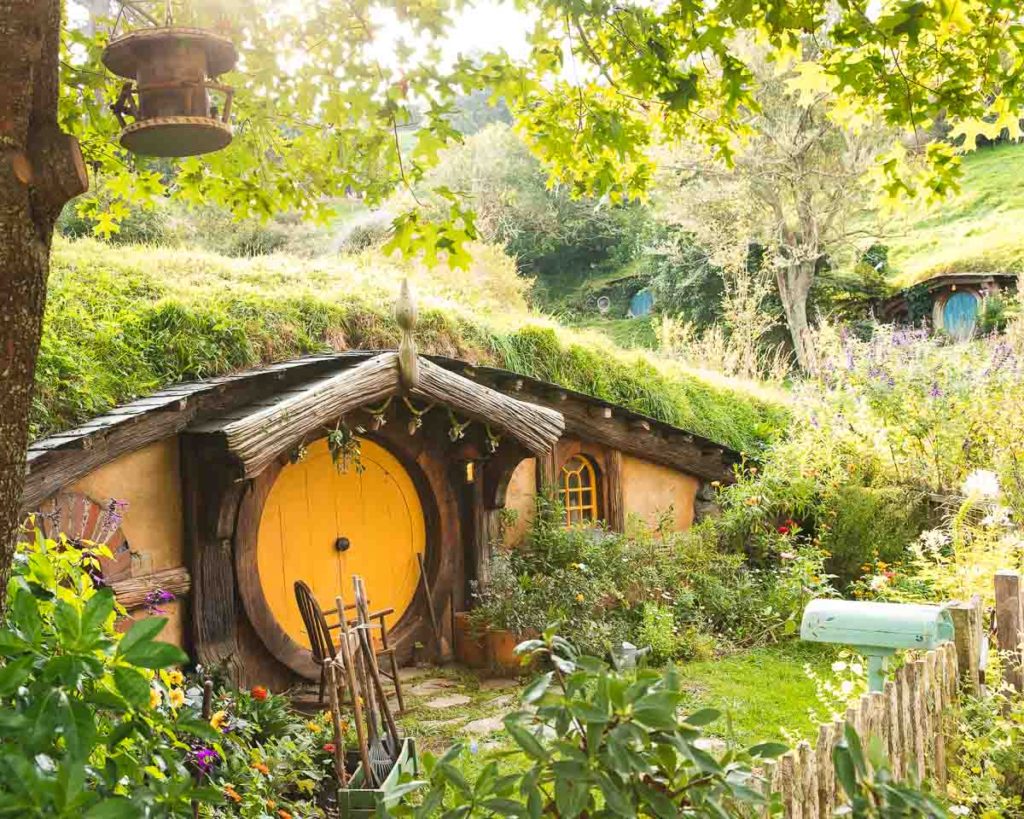
A working holiday visa is a special visa for young people from 45 different countries (to date) to travel and work in New Zealand for a year (or two for the UK and Canada). The primary purpose of your trip must be to travel, so you can only get a temporary job.
New Zealand immigration lists the countries that have a working holiday visa available here . Each country has slightly different rules and requirements, so be sure to check for your specific country.
What are the Eligibility and Requirements?
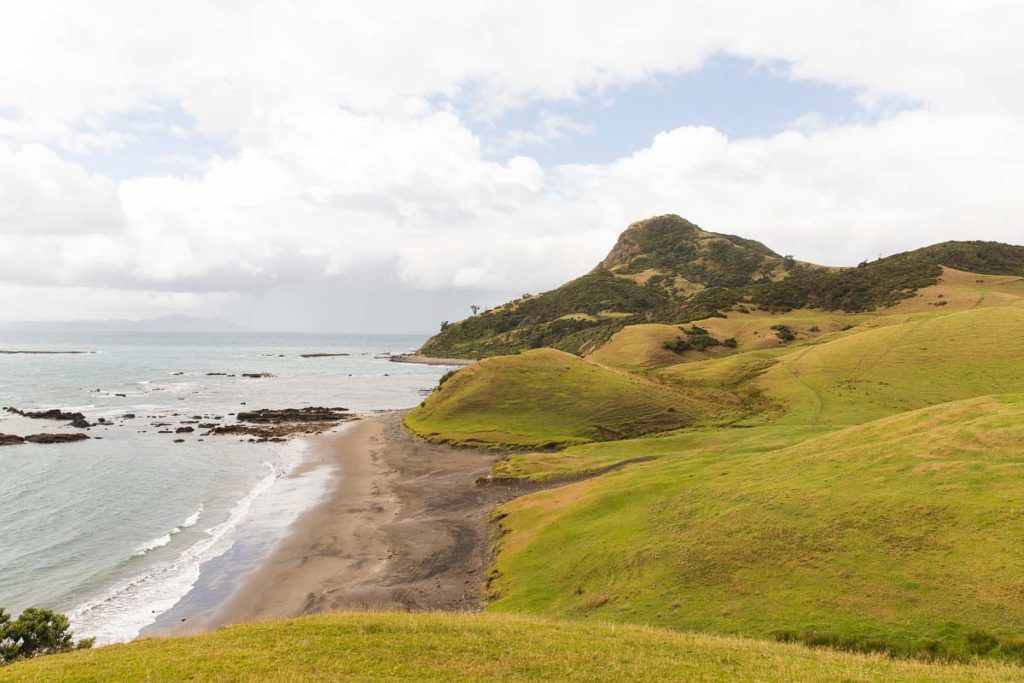
Although these are slightly different for each country, there are similarities. There’s an age cutoff, you need to have a certain amount of money, you usually need health insurance (UK citizens are covered by a reciprocal health agreement), and you can’t get a permanent job. I summarize the requirements for the US, Canada, and the UK below.
What is Good Health?
What is good health, and how do you prove it? The good news is, there’s a good chance you won’t have to! The bad news is that if you do happen to have to prove it, it’s obnoxious and cumbersome, at least if you’re in the US.
Do You Need a Chest X-Ray?
New Zealand uses X-rays to check for tuberculosis (TB). You need to provide New Zealand with an X-ray if:
- You’re staying for more than 12 months
- You’re from a country that doesn’t have a low incidence of TB
- You’ve spent more than 3 months in the last 5 years in a country that doesn’t have a low incidence of TB
Here’s a list of all the countries that DO have a low incidence of TB. If you’re from or have spent more than 3 months in a country NOT on that list: you’ll need an X-ray.
Unfortunately for us, we had just spent 3 months in Southeast Asia , in countries not on the list. This is where it gets super annoying if you’re from the US.
When they inform you that you need a chest X-ray, you’re only given 2 weeks to complete it and send it to immigration! So if you think you’ll need an X-ray, learn from our mistakes and plan in advance!
The other incredibly inconvenient thing is that you need to go to a ‘panel physician’ , which is a doctor who’s been approved by New Zealand to complete X-ray certificates. Of which there are 25 IN THE WHOLE USA!! That is an absurdly low number, and a lot of people would have to fly to a different state to do this, including us. (Canada has 33 approved panel physicians, and the UK has 8, which also seems low, although I don’t have personal experience with this.) Find approved panel physicians here .
If you find yourself in this situation, my advice is to shop around . We called multiple panel physicians and their prices and availabilities varied by a huge amount.
Do You Need a Medical Examination?
You need to provide New Zealand with a medical examination if:
You also need to go to an approved panel physician.
How to Apply for a New Zealand Working Holiday Visa?
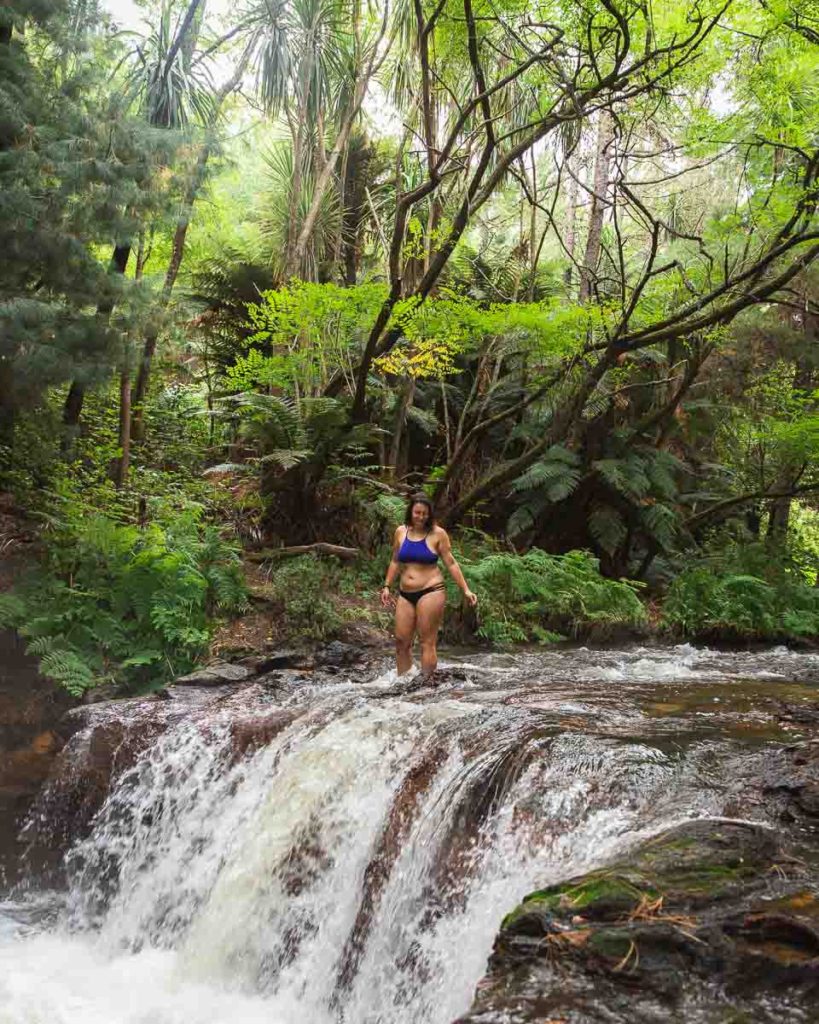
As long as you’re from one of the 45 countries that have a NZ working holiday visa scheme, are within the age range, and have enough money saved up, it’s pretty easy to apply for a NZ working holiday visa.
- Go to the immigration New Zealand website and make sure your country has a working holiday visa scheme.
- Click on your country, and make sure you meet the specific eligibility requirements.
- Find out if you’ll need to prove that you’re in good health: if yes, plan ahead by booking an appointment with a panel physician soon after you plan on applying for the visa.
- Apply online!
How Much Does a New Zealand Working Holiday Visa Cost?
The price varies by country. For US citizens, it’s free to apply for a New Zealand working holiday visa. It costs $245 nzd for Canada and UK citizens . Check your specific country requirements here .
How Long Does it Take to Get a New Zealand Working Holiday Visa?
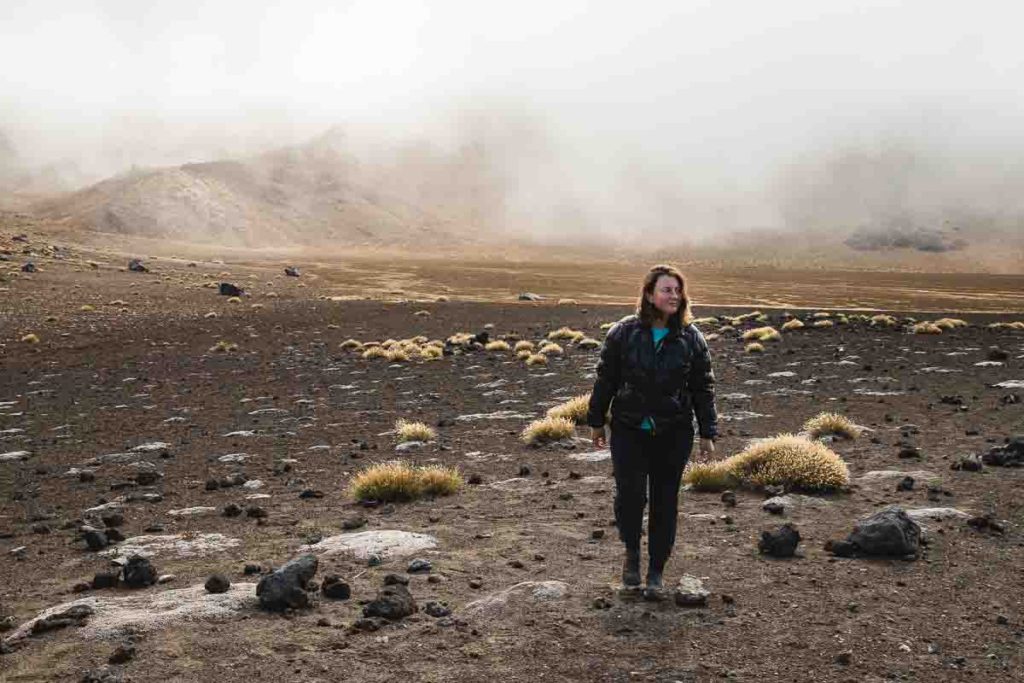
If you apply online, Immigration New Zealand says that 90% of visas will be completed within 22 days . I’d triple that to make sure you’re not one of the unlucky 10% and end up WWOOFing in Hawaii while waiting for the visa to come through… yep us again!
How to Get a New Zealand Working Holiday Visa Over 30?
This is super easy! Step one: be Canadian! Just kidding, as awesome as it is that the Canadian working holiday scheme is for people 18 – 35, the rest of us aren’t so lucky.
If You’re 30
Good news, you can still apply up to the day before your 31st birthday! After you’re granted the visa, you have a year to start using it, so you can work abroad in New Zealand on a working holiday visa as a 31 or 32 year old.
If You’re Over 30
When we decided that we wanted to work and travel in New Zealand, my boyfriend was 31, so we have some experience in this. Currently I have a working holiday visa, and he has an IEP work exchange visa.
As far as I’m aware, New Zealand and Canada are the only countries where US citizens can get a working holiday type visa over 30 .
You can do this with the IEP Work Exchange visa, available through the company BUNAC . (info for UK citizens here )
IEP Work Exchange Visa
The IEP Visa is a visa for people 18-35 that’s very similar to the traditional working holiday visa scheme. It’s also available to people who’ve already had a working holiday visa and would like to get an extra year! The table below summarizes the essential information.
There’s a limited number of spots for this visa, so be sure to plan way in advance for this one.
Is the IEP Visa Worth it for People 30 and Under?
Since I have a working holiday visa and my boyfriend has an IEP visa, I can directly compare them.
If you’re over 30 and want a working holiday experience, or have already had a working holiday visa and want an extra year, an IEP visa through BUNAC is your only shot, so it’s 100% worth it.
If you’re 30 and under, I recommend getting a working holiday visa instead for the following reasons.
- It’s way cheaper : With an IEP visa, you get two free nights in a hostel. Even booking last minute at the same hostel, I payed $70 nzd, which is nothing compared to $695 usd
- Information is easy to find online : IEP provides an orientation and helps you set up a bank account and an IRD tax number, but it’s easy to do this yourself with online resources (like this blog!)
- New Zealand is an easy country to travel in : IEP provides resources and support, but I haven’t found any of that necessary: New Zealand is super travel friendly.
- It’s easy to meet people and make friends at hostels, campgrounds, or at your job: IEP has social events to make friends, but there’s many travelers eager to socialize.
- My boyfriend’s IEP visa took much longer to get than my working holiday visa: having a middleman was more of a hindrance
The bottom line is I don’t recommend going with an IEP visa unless you have to. If you do have to, it’s a great option.
What You Need on Arrival to New Zealand on a Working Holiday Visa
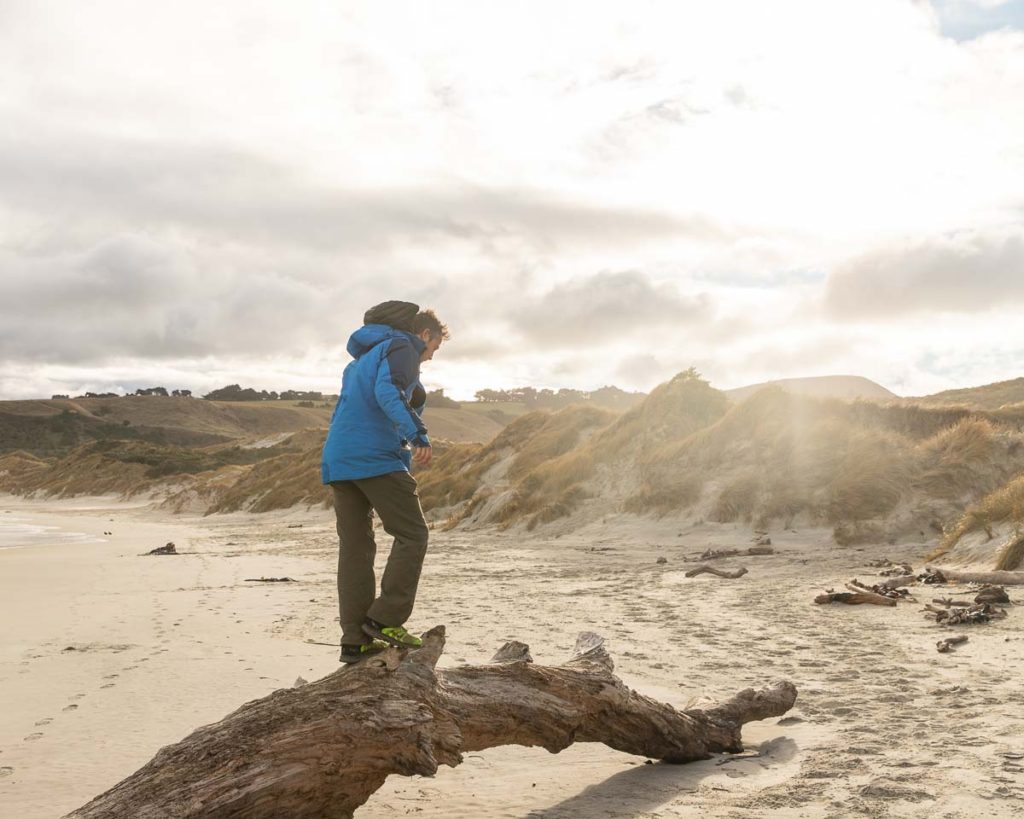
OK, so you saved up money, got the working holiday visa, got a plane ticket… now what? Just make sure that you’re prepared to enter the country and get through security!
What Documents Do You Need at the Airport?
We didn’t need to show any documents except for our passports, but you should have the following readily available:
- Proof of health insurance: approval letter from insurance company
- Proof of funds: bank statement
- Your working holiday visa: print it out!
How to Get Through Bio-Security
New Zealand bio-security is no joke! Which makes a lot of sense now that we’ve traveled around and learned more about New Zealand biodiversity: before people came to these islands, the only land mammal here was a bat! The birds and vegetation are just not prepared to deal with many of the mammals and diseases from other parts of the world. In particular, the beloved kauri trees are dying from kauri dieback disease, for which there is no known cure.
Because of this, New Zealand bio-security is intense. Your hiking shoes and camping equipment should be very clean! We didn’t know about this, and were flying straight from working on a farm in hawaii… ouch. We were called ‘the dirty people,’ and our shoes were soaked in disinfectant. Sometimes they won’t allow them in at all!
Learn from our mistakes, and make sure the soles of your shoes are washed really well. If bringing a tent, make sure that there’s no dirt or soil anywhere.
First Week in New Zealand on a Working Holiday Visa
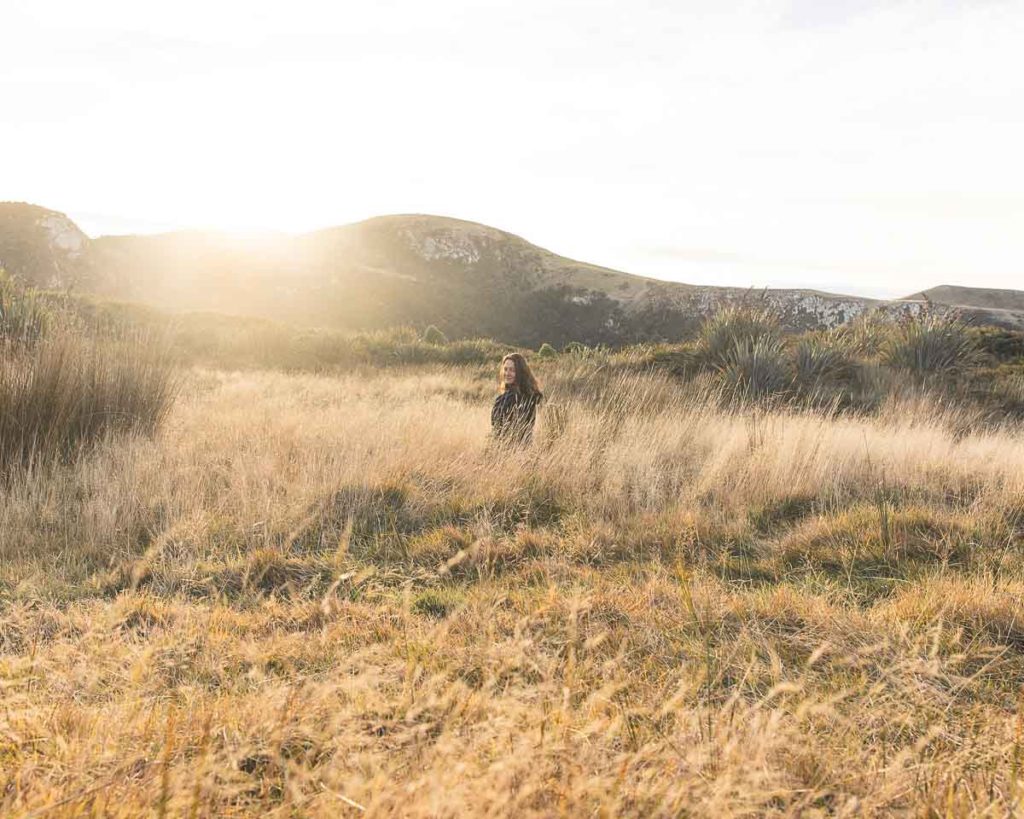
Your first week in New Zealand on a working holiday will be all business. There will be a lot of ‘adulting’, and it will be tiring.
In order to be able to work in New Zealand, you need to set up a bank account and get an IRD number. Getting New Zealand phone service is important for communicating with employers.
How to Set up a New Zealand Bank Account
You must have a New Zealand bank account in order to work in New Zealand.
ANZ has a free account that is easy to set up. Go in person to the location closest to you to set up an appointment. If you’re on a tighter schedule, ask for the earliest appointment in all the surrounding locations: the central one is much busier than ones just a bus ride away.
Make sure to bring with you:
- Copy of your visa
- Know your ‘tax identification number’, which is your social security number in the US
- Proof of address: ask the hostel you’re staying at for proof of address, they’ll print out and sign a standard form
How to Get An IRD Number
You also need to apply for an IRD (Inland Revenue Department) number, which is a number for tax purposes, and a requirement for getting a job in New Zealand. It takes up to 10 days to receive your IRD number , so make sure do this in advance of when you want to get a job.
You can apply online , just make sure that you have all of these documents and numbers ready:
- Visa application number (not your visa number, find this on your visa approval letter)
- Overseas tax number (social security number for US citizens)
- New Zealand bank account number
For online applications, you’ll need to upload copies of documents. I used a phone scanner app to do this. Make sure you have copies of:
- Passport information page
- Proof of permanent address: this can be from your home country, you can use your drivers license or a bank statement
- Proof of New Zealand bank account number: you should have received this when you signed up for your bank account
I personally found the online form a bit buggy, but got it to work in the end.
How to Get Phone Service in New Zealand
Setting up New Zealand phone service is pretty easy, and super important to communicate with employers.
Spark and 2Degrees are the main options , with comparable prices.
We went with 2Degrees , because you just have to choose one. If you go to one of their locations, they make it super easy to sign up.
They have various monthly plans. We pay $95 nzd per month for 25 GB for two people, because we’re extra and liked a lot of data when we lived in our van. They have cheaper plans, and also an unlimited option. If you’re like me and can’t speak gigabites, 25 GB for the two of us is plenty to do as much interneting as we want, but we have to be super careful with videos.
Should You Buy a Van?
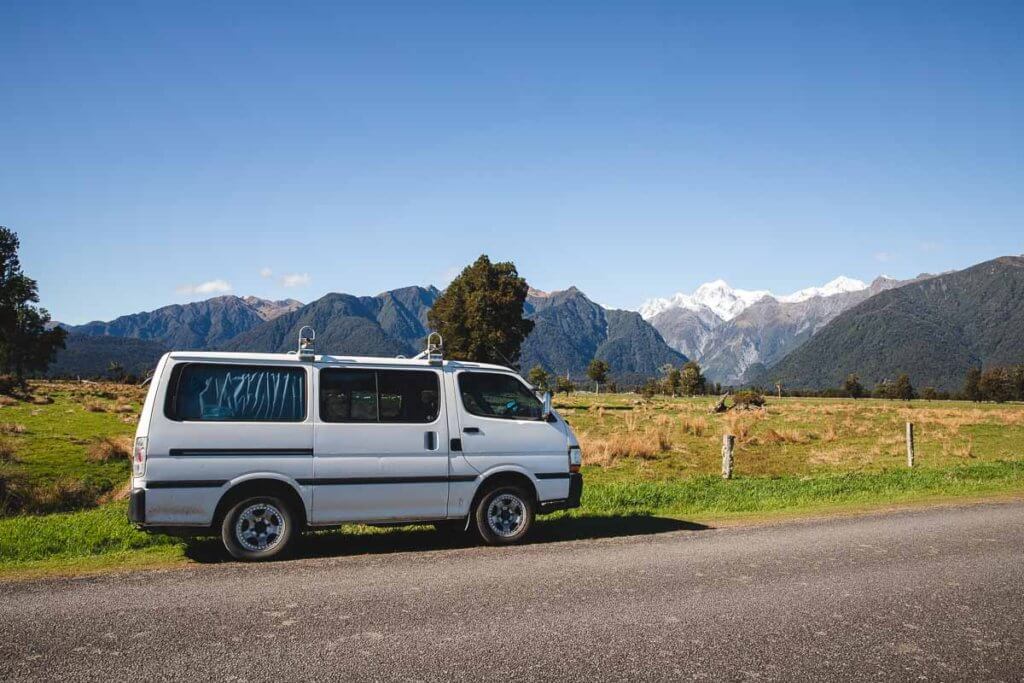
I strongly recommend buying a van on your working holiday visa. I write about how to buy a van here : how to find one, how much should you pay, why you should go for a self-contained vehicle, and what to look for.
For a guide to New Zealand van life, check out my campervanning in New Zealand guide here .
Final Thoughts
That’s it! It’s a shit ton of bureaucratic steps, but then you get to live and work in New Zealand for a year! Your next step is to get a job, so go check out my blog post on how to find a working holiday job in New Zealand .
So far it’s been 100% worth it, it’s a gorgeous country with kind people and incredible scenery, and you get a whole year to explore!
RELATED ARTICLES MORE FROM AUTHOR
Leave a reply cancel reply.
Save my name, email, and website in this browser for the next time I comment.
I accept the Privacy Policy
- New Zealand 13
- Southeast Asia 11
- Travel Tips 4
- Lifestyle 1
Malaysian Borneo on a Budget
Getting clothes made in hoi an, vietnam: a complete guide, fruit picking seasons in new zealand, getting shoes made in hoi an, vietnam, follow me on instagram @fingertiptravels.
- Privacy Policy
- Browse jobs
- Submit Your CV
Why New Zealand? The Pros and Cons of a Working Holiday in New Zealand

When I’m chatting with friends and family overseas, it’s the question that I’m asked most often: so, what’s it like living in New Zealand? The short answer is easy – it’s great! After all, I am writing this from my home base in Auckland, where I still reside, over six years after first arriving for what was supposed to be a brief working holiday. Of course, as real life tends to be, the full answer is a little more complicated. No big life-changing move is without its ups and downs. Even though the UK is culturally similar to New Zealand, and we share the same language (kind of!), life here is just a little bit different from home.
If you are interested in the more nuanced answer to ‘what’s it like to live and work in NZ?’ then this blog is for you. I have spent some time thinking about my experience to date, and have pulled together my personal list of Pros and Cons of the Kiwi experience. Emphasis on the personal – because what I may see as a negative, might not be for you? Read on to find out.
Beautiful scenery
I’ll begin with the obvious one. New Zealand is gorgeous. It’s a country known for its natural beauty, and there’s a huge variety of outdoor landscapes to enjoy. There are tropical rainforests and beaches in the Far North, rugged coastlines the length of the country with golden sand on the east coast, and striking black sand on the west. NZ has a multitude of untouched coastal islands, sparkling lakes, fjords, and lush green forests. There are spectacular, soaring mountains with breath-taking alpine landscapes, and plenty of snow in the South Island, if that’s your thing. The scenery is truly diverse, and I think there’s something for everyone. And because New Zealand is relatively small it’s easy to see much of what the country has to offer, even if you are only here for a short time. You are never too far from a beach, a bush walk, a vineyard, or a new place to explore. My words may not do this beautiful country justice; if you are into the outdoors and looking for some dreamy inspiration, I recommend this section of the NZ tourism website.
Relaxed culture
New Zealand is a laid-back kind of place. From the way that people talk, to how they dress, ‘casual’ is an apt description. Like any society, there are extremes, but overall the culture here feels very egalitarian. There’s not too much worrying about your background, where you went to school or University. My experience of the workplace is a similar story. While the office where I work is officially ‘corporate’, the corporateness is just a tad more chilled out than you might find in large city in England, for example. I’m really enjoying the relaxed environment, and feel this is one of the big advantages of living in Aotearoa.
Life and work balance
I think this Pro is related to point above— in my opinion, the whole work/life balance equation is tipped favourably in the direction of life, here in NZ. The pace is a little slower. It’s accepted that you do have a life outside of work, and you’d like to leave on time to go for your walk / play sport / meet your pals. Weekends are for friends and family. Most office environments tend to close down, or work reduced hours over the big summer break—yes, that’s Christmas-time down under! There’s plenty of public holidays (12 – slightly more than the UK) and generally, a helpful attitude to balancing work with relaxation time. Of course, every job and situation comes with stresses, but from what I’ve experienced, and observed, there is just a tad less pressure than you may experience in your typical workplace in London or Manchester for example.
Great work opportunities
New Zealand was impacted by COVID, like everywhere else in the world, but the economy doesn’t seem to have suffered any lasting damage. Certainly there is a high demand for workers, and unemployment rates are incredibly low. What this means for Working Holiday Visa holders, and other visa-holding migrants, is that there is a LOT of opportunity in the job market. Businesses are crying out for workers, and if you get your resume looking polished, yourself work ready, and search in the right places, you should have no problem finding the work you want while you are here. In last week’s blog, I discussed the temp work opportunities you can enjoy on Working Holiday Visa, so make sure you read that post , if you haven’t already. My next two blog posts will cover exactly what you need to do to successfully find a job here in NZ, so make sure you check back next week to read more on this topic.
Friendly Kiwis
The locals I have encountered in Auckland, and while travelling the country, have been friendly, welcoming, and especially willing to help—Kiwis love a lost tourist with a map! New Zealanders always seem interested to hear about who you are, where you are from and what travel plans you may have. I’d describe it as more of a low-key, relaxed friendliness rather than big extroversion, which is kind of NZ culture in a nutshell!
As for the native birds, seeing a real life Kiwi is a little trickier. Kiwis are nocturnal and reportedly a little shy, but there are wildlife centres, and wilderness walks across the length of the country where you can see one, and hot tip – they have a special night-time Kiwi habitat at Auckland Zoo .
The distance
By most measures, New Zealand is far, far away, and it’s isolated. A trip to ‘nearby’ Australia is at least a three hour flight. If your country of origin is somewhere in Europe, then jetting home for a quick visit is probably out of the question, with the shortest flight distance being at minimum 24 hours, and the cost likely to be significant (especially now, post-COVID). The closest mainland US destination is 13 hours. Basically, you are literally on the other side of the world, and travel anywhere else is a big effort. Here’s my positive spin: it’s a good reason to make the most of seeing the whole of New Zealand when you are here!
Homesickness
Homesickness is something you might experience when you move away from home, and wherever you move to, but I do think it is compounded and magnified in New Zealand by the distance, as per my point above. I miss my friends and family back home, and it’s no easy effort to see them. Thank goodness for digital technologies! I do a lot of video calling, WhatsApp chatting and updating my Facebook on my latest travels to make sure I stay in touch with loved ones.
It’s quiet out there
New Zealand has a population of just under five million, and this means it is a relatively quiet place. There simply aren’t a lot of people around, even in the biggest cities like Auckland and Wellington. Of course, there are plenty of bars, nightclubs and restaurants etc (the foodie scene is big here) but there aren’t quite as many options as you’d find in a bigger city. Places close early. There are fewer festivals, and less chances to see your favourite bands, as many of them don’t tour here. If you are used to a faster-paced, busy lifestyle, then NZ may not deliver. Of course, on the flipside, if you prefer the quieter life then you may find all of this a big tick in the ‘Pro’ category.
Housing quality
A friend of a friend moved to Wellington in the middle of winter, and had already organised to move straight into a house-share with friends. When they arrived in the middle of the day as planned, no one else was home, so they duly let themselves in with the key that had been left out. They put their backpack down and because it was really cold inside the house, spent the best part of an hour searching for the central heating switch. Reader, there was no central heating. In fact, there was no heating, full stop! Thankfully, landlords are now required to meet a minimum standard of heating and ventilation, but some houses can still be a bit cold and draughty (especially the pretty old Villas and Bungalows – they weren’t built for the colder weather!). Luckily, much of New Zealand is fairly temperate, but when you’re house hunting, try to find somewhere that’s been fully insulated and preferably has a heat pump (I’ll share more on finding a place to live in a later blog). Otherwise you could always do what the Kiwis do…put on a jumper!
Access to cheap shopping
Remember how New Zealand is really isolated and far away? Another impact of this is that there are a) fewer products and goods to choose from and b) you don’t get the really cheap deals you might see in continental Europe, the UK or the US. Don’t worry, you can still get what you need—and there’s a thriving second hand goods culture and market here. However you probably won’t see the full range of choices that you are used to, and it might cost a little more than you expect.
Having said that, we are starting to see more of the bigger, popular overseas brands coming to NZ. We’ve got Zara, H&M, JD Sports and more recently, Costco. There are a lot of great online shops too, I still get my deliveries from ASOS, the order take a little while to get here but they offer free returns.
It’s worth it.
And so ends my personal list of my pros and cons of living in New Zealand. For me, the minor niggles are massively outweighed by the positives, you only have to take a look at my recent holiday photos to see that it’s worth it!
Your dream destination for 2023?
If I’ve persuaded you that that New Zealand is the perfect working holiday visa destination, good news, the NZ government has recently made changes to help increase access to working holiday makers already here, and those looking to travel to New Zealand. This means that more people can come to visit and work in New Zealand. Get your visa sorted, and come on over!
Next week’s essential reading
Tune in next week when I will be writing all about getting work-ready. I’ll share my own story, and include all of the bits and pieces and practical advice on what you need to get organised in advance. Then the week after it’s a big one: 10 ways to find a job in New Zealand.

A bit about me In 2016, I arrived in New Zealand from the UK and my recruitment journey began. With experience in people focussed industries like healthcare and hospitality across the UK and…
More about Gemma
- Employers Blogs
- Job Seeker Blogs
- Recruitment Industry Blogs
A Working Holiday in New Zealand: a Series about Living and Working in NZ

Looking back now, it seems pretty random that I have ended up living here in Auckland – but I am mighty pleased that fate led me here. I love my life here in Aotearoa, New Zealand.
The seed of the idea was planted when I was living and working in Tenerife, way back in 2013. I had moved in with a British girl I met there, and we quickly became friends. My new friend had lots of travelling goals and plans, and not long after we’d connected, she was saying goodbye to Spain and heading off to fulfil her dream: a working holiday in Australia, followed by the same in New Zealand. I was impressed with my friend’s adventurous spirit – at that time, a working holiday ‘down under’ didn’t seem quite as commonplace as it feels today! We kept in touch, and when I was looking for a fresh start, contemplating what to do next with my life, my friend gave me a wee nudge. She suggested I come out to where she was, in New Zealand. It was only six months later that I was on a plane myself. Destination: Auckland.
I arrived on a chilly day in July, which is winter here in the southern hemisphere – though it’s not too cold by UK standards. I slowly got to know the city. I made new friends, I joined a very helpful Facebook group (more on that in a later blog), I found a place to live, I found a job, I travelled and explored. I started building a new life in New Zealand. Of course, that’s a very brief summary! It all took a fair amount of effort, and I learned a LOT along the way. Looking back now, I realise I have collected some useful insights and wisdom to impart to anyone else out there – wherever you are – who is also contemplating a big move across the world.
Welcome to ‘A Working Holiday in New Zealand’ – a seven part series that I’ve developed with the goal of helping those who find themselves looking for a similar adventure – seeking to explore, live and work in beautiful New Zealand.
Because I came here using the Working Holiday Visa scheme, that particular experience is the core focus of this blog series. However, most of the content will be relevant to anyone planning to travel and work here, under any type of visa. In each blog, I’ll cover a different aspect of backpacker work, life and travel, including what I’ve personally experienced, and what I’ve learned about the practicalities of a working holiday in New Zealand – stuff that the travel guides don’t necessarily tell you! This is part one, I’ll kick things off with the essential fundamentals of moving to New Zealand: the Working Holiday Visa.
About the Working Holiday Visa (WHV)
New Zealand has a working holiday scheme agreement with many countries around the world. Aimed at young people, this visa allows you to travel and work in New Zealand for up to 12 months, or 23 months if you are from the UK or Canada.
Who can apply?
People aged 18 to 30 (or up to 35 years old for some countries) whose main intention is to travel or holiday in New Zealand, with work or a short amount of study as secondary intentions. Not every country has a Working Holiday Visa Scheme with New Zealand – you can check if yours does here .
How do I apply?
It’s pretty easy. You apply online through the New Zealand Immigration website , which typically is done before you arrive. It’s also possible to apply once you’re here, but there may be other requirements and it generally takes longer.
Do I need a job first?
No, you can find a job once you’re here. Keep an eye out for blog number four of this series, as it will include lots of useful information about job hunting, including ten different ways to find a job. The Madison website also has plenty of helpful content for when you reach this stage, including how to adjust your resume for the Kiwi market , and many ideas and tips to make job hunting a smoother process.
How long does the visa take?
Obviously COVID has made timelines everywhere a little wonky, but Immigration NZ seems to be on track with the WHV and usually (not always) you’ll get an email within 20 working days from when you submit your online application, to confirm if your visa has approved or to ask for more information.
How long does the visa last?
Up to 12 months, or up to 23 months if you’re from the UK or Canada.
How much does it cost?
This varies depending what country you’re from. More information can be found here .
Are there any other conditions?
Yes, other conditions may apply, and again, they vary depending which country you’re from – find out more here . One important condition to be aware of is that you cannot have a permanent job while here. This means you’ll be looking for temp work only. This isn’t a negative – there’s loads of interesting temp work available, where I am here in Auckland, in all the major cities and across the country in many other locations. Also worth noting is that there’s currently a labour shortage here in New Zealand, and temp workers are in high demand.
What is temporary work?
Temp work is when a worker is engaged for a specific period of time to complete project or task-based contracts, seasonal or casual work. A temporary role is as it name suggests – not forever! However temp work can range from anything from a one day assignment, to several months in one position – it depends on what the business needs and what you can fulfil. And there’s huge variety in the work too. You can find temp work in an office, such as front desk Receptionist at an Accountancy firm in downtown Auckland or outdoors, for example, picking apples in sunny Nelson for four weeks.
Types of temp work
There are temporary roles found in all industries and sectors, and it doesn’t just have to be solely about making cash, temp work can also be a real career boost. If you are looking for a job that will further your career and that makes use of your degree, existing skills and experience, there are plenty of temp roles to meet your needs. You may find yourself working as a Project Coordinator, or Manager for a large corporate, or working on the latest advertising campaign at a digital marketing agency.
Finding temp work
Temp work is organised through a recruitment agency, like Madison, but actually done at an employer’s (client of the agency) workplace. You can read more about types of work, and temping through Madison here , and check back on this page in a couple of weeks when I’ll publish my blog that covers the full ins and outs of finding work in New Zealand, including working with a recruitment agency.
Temporary working is ideal for backpackers and travellers with an WHV, as it fits the conditions of your visa and gives you the flexibility to work for shorter periods of time, giving you the space to travel. It’s fun to try out different roles and industries, plus, temp work can be found everywhere around New Zealand, which is great for exploring!
Can I stay on after my working holiday?
The working holiday visa is an excellent way to travel and sample living in another place in the world, but it’s not intended for long-term stays. If you do decide that you’d like consider New Zealand as a more permanent destination, I recommend checking out the Immigration NZ website , which has loads of info about visa options.
What is it like to work in New Zealand?
I get asked this question a fair bit, as well as being asked a lot about the downsides (yes, there are some!) and the positives of living and working in NZ. I will share all in my second blog, so check back soon to find out: Why New Zealand?
If you have any questions, feel free to get in touch with me today !
We use cookies on this website to show you relevant information, understand how you use the site and ensure the site functions properly. Our Privacy Policy | Our Terms of Use

Working Holiday
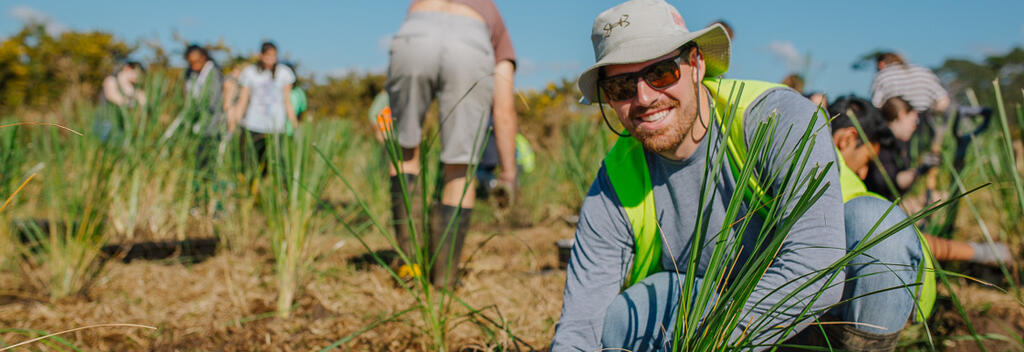
IVHQ volunteering, Auckland
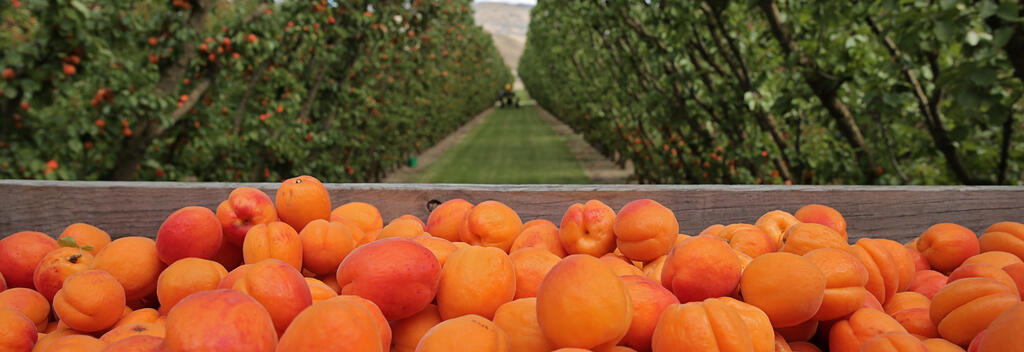
Central Otago apricots, Central Otago
By Tourism Central Otago

Jacksons Orchard picking cherries, Central Otago
By Jackson Orchards
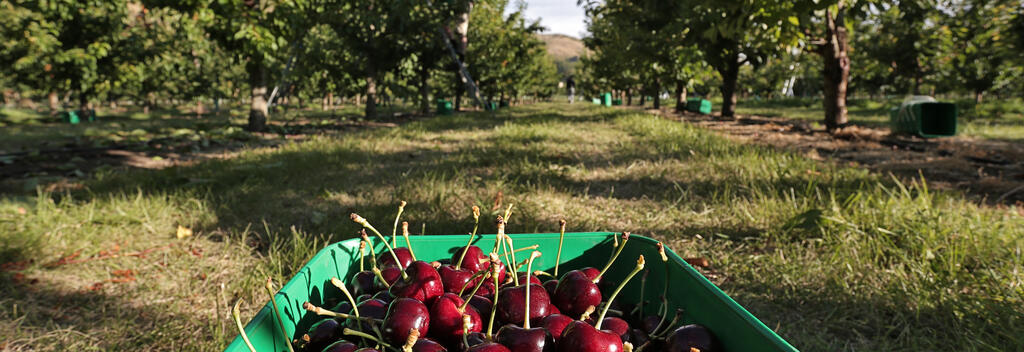
Sarita Cherries, Central Otago
By James Jubb / Tourism Central Otago
Earn money and get some overseas work experience while you travel in New Zealand with a Working Holiday Visa.
If you like the idea of earning a bit of cash while you see the sights around New Zealand, then a Working Holiday Visa could be right for you. If you meet certain criteria, you can travel here on a New Zealand Working Holiday Visa, which is longer than a Visitor Visa and lets you work while you holiday.
Popular jobs include hospitality, tourism, working in an orchard or vineyard, or farm work.
A Working Holiday Visa is a great way to see New Zealand, meet locals and really experience the Kiwi way of life.
The Working Holiday Scheme
New Zealand has agreements with many countries around the world that allow young people to visit here and work while they travel. A Working Holiday Visa (opens in new window) is valid for much longer than a Visitor Visa and also allows for study.
Applying for a Working Holiday Visa
Eligibility for a Working Holiday Visa varies depending on where you are from. Generally, it is open to people aged 18-30 years old (but up to 35 years old from some countries) and is valid for up to 12 months (or up to 3 years if you are from the UK and 23 months if you are from Canada).
Check the eligibility criteria for your country to find out if you can apply.
Types of work
Travelling in New Zealand on a Working Holiday Visa is a wonderful way to meet locals and experience a side of life here that many visitors never see. You can work in any job, as long as it is not a permanent role.
There is huge year-round demand for hospitality workers in New Zealand, as well as in tourism, particularly in larger cities like Auckland and Wellington, and visitor hotspots like Queenstown.
If you enjoy the outdoors, then seasonal fruit picking is a great option. Try orchard work in the Bay of Plenty (home to our famous kiwifruit) and Hawke’s Bay, apple picking in Nelson, or helping with the harvest (Feb/March) in one of the many vineyards around New Zealand – our biggest wine regions are Hawke’s Bay in the North Island, and Marlborough and Central Otago in the South Island.
In winter, you could work in the snow during ski season in the central North Island or hop down to Queenstown or Wanaka.
Start planning
Once you have applied for your New Zealand Working Holiday Visa you can start planning your time here. Find out more about what you need to be able to work in New Zealand and start looking for seasonal work , jobs in hospitality and tourism , and fruit picking jobs .
There is also useful information about living in New Zealand and advice on backpacking .
Find more things to do on your working holiday
Find places to stay, find transport.
- Share on Facebook
- Share by email

Working Holiday New Zealand: Experience And Things To Know
By: Author Lotte
Posted on Last updated: February 20, 2023
Categories New Zealand , Work and Travel

Are you thinking about getting a working holiday visa in New Zealand but not sure where to start? You're in luck! This article will provide you with the essential information and tips to help you make the most of your New Zealand experience.
Read all about Adriana’s firsthand experiences from her working holiday in New Zealand. We’ll be discussing the working holiday visa New Zealand requirements, salary, the best working holiday jobs in New Zealand, general tips, and more.
Let’s dive in!
Disclosure: Some links in this post are affiliate links. If you make a purchase through one of these links, we may earn a small commission (at no extra cost to you!). We're very grateful when you use our links to make a purchase:-).
Working Holiday New Zealand experiences
(use the coupon code PHENOMENALGLOBE for a €100 discount)
Work and holiday visa New Zealand: everything you need to know
Adriana and Matěj got a WHV NZ (Working Holiday Visa New Zealand) and spent a year in Aotearoa, the land of the long white cloud , working different jobs as well as exploring the country.
They kindly agreed to share their work and travel New Zealand experiences to inspire other travelers.
If you've secretly been dreaming about getting a working holiday visa for New Zealand but are unsure what to expect, read along as Adriana and Matěj have loads of great tips and advice based on their personal experience.
Meet Adriana and Matěj

I'm Adriana, and together with my partner Matěj, we are bloggers behind blogs Czech the World and Svatbeni . As you can guess, we are from the Czech Republic and we started our blogging career in New Zealand during our Working Holiday.
We also participated in some other Work and Travel programs. For example, we’ve been to Yellowstone, Alaska, and volunteered in Malaysia . However, New Zealand was our favorite!
Why do a working holiday in New Zealand?
The Working Holiday Program in New Zealand is quite popular among young Czechs, so after hearing all those amazing stories from friends, we couldn't resist applying as well.
Why didn't we consider other countries? Well, at that time there were no Working Holiday Visas to Australia , and Canada choose participants randomly using a lottery system (luckily, this has changed).
We didn't want to risk that only one of us would be chosen and therefore opted for a working holiday in New Zealand. That being said, Canada was our Plan B, in case we wouldn't be able to get a New Zealand working holiday visa.

Is it difficult to get a New Zealand work and travel visa?
It mostly depends on your nationality. There are some countries (including the Czech Republic) that have a limited amount of visas per year. Read more information and requirements below.
Check out Global Work & Travel which offers step-by-step guidance and assistance as you embark on your working holiday to New Zealand (use the coupon code PHENOMENALGLOBE for a €100 discount) .

New Zealand working holiday visa requirements
Working holiday visa new zealand age limit.
In order to work and travel New Zealand on their special WHV, you must be between 18 and 30 years old, though some nationalities can apply until 35 years.
While the application process is fairly straightforward, it does require time, effort, and a lot of paperwork.
Other requirements for a working holiday in New Zealand
- You can only apply for a Holiday Visa to New Zealand once in your life. Important: if you have successfully applied but didn't use your visa, you aren't eligible for another request.
- You must have a clean criminal record.
When entering New Zealand, you must:
- Have a return flight ticket purchased or have enough money to buy one.
- Have a minimum of 4,200 NZD in your bank account (or another currency equivalent).
- Have proper travel insurance (including medical coverage) for the entire stay.
- Not bring children with you.
You can check the exact working holiday visa New Zealand requirements applicable to your home country on the New Zealand immigration website .
Looking for a complete New Zealand work and holiday visa package deal with ongoing support ? Check out Global Work & Travel. (you get a €100 discount with the coupon code PHENOMENALGLOBE)
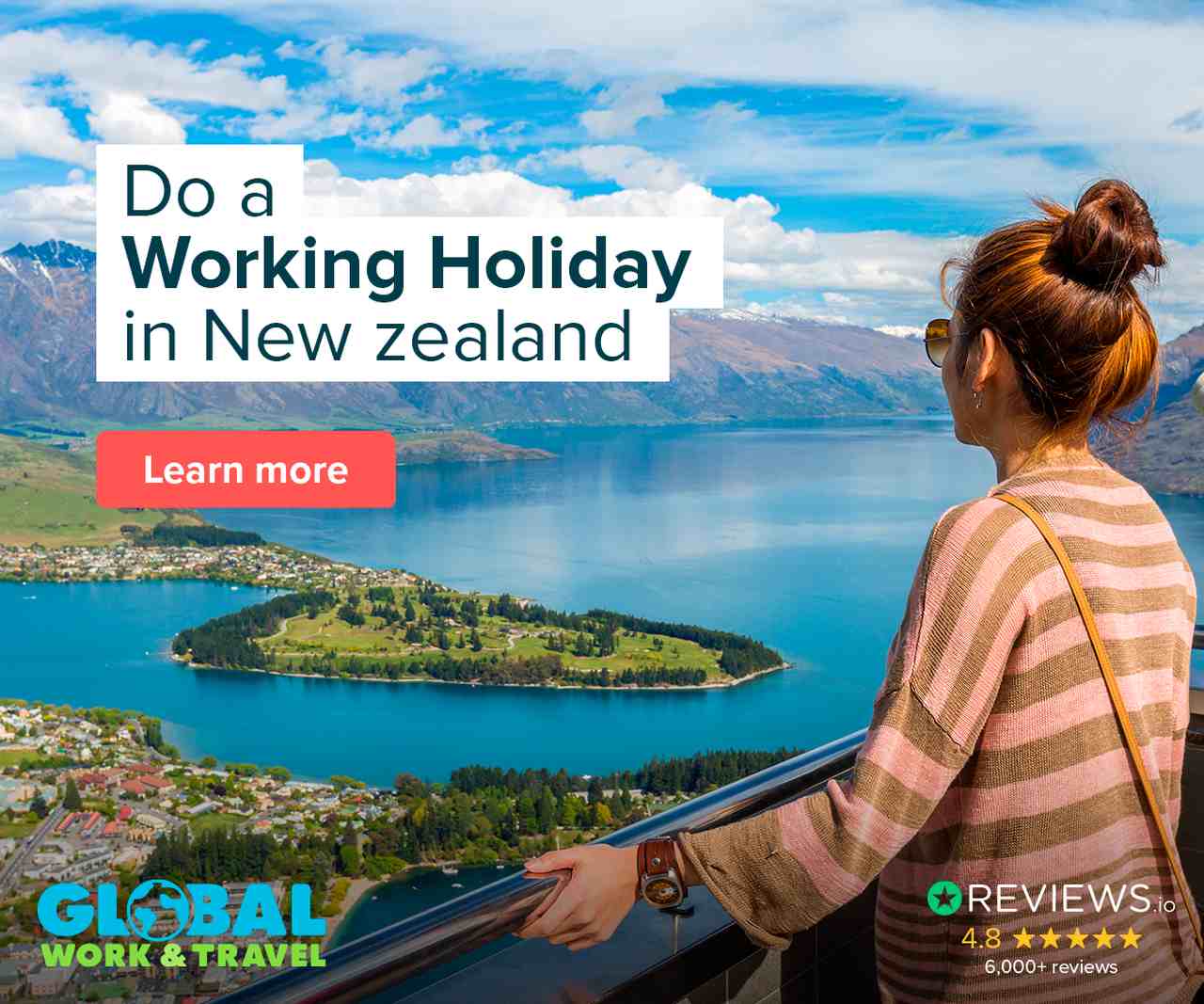
How long is the working holiday visa in New Zealand?
The WHV New Zealand is valid for 12 months, though you may be able to extend if you meet certain criteria. We spent the whole year of our Working Holiday Visa period in New Zealand.
This time was split into 3 parts:
- We had several jobs for about 3-4 months for different NZ employers
- We have spent 6-7 months building our blog
- We made a New Zealand road trip around the North Island and South Island for 2 months

Working holiday New Zealand jobs
We did quite a few different jobs and temporary work there, so let’s have a look at each one of them.
Apple thinning
Apple thinning is a typical orchard job. Basically what you do is emoving small apples from the clusters, so the remaining ones can grow bigger.
There are many apple-thinning jobs in New Zealand (Hawke’s Bay, Nelson, Otago, Waikato, and Gisborne are home to many orchards), and finding work is easy. Check out the job board website Backpackerboard for current job offers.
Alternatively, you can call or text several orchards in the area you're looking to base yourself in and ask if there is an open position.
Usually, you'll have a reply within a day. For example, we started an apple thinning job just two days after we applied! Orchards usually pay the minimum wage ($20NZD per hour) for fruit picking. Some orchards offer accommodation, some don’t.
Plum picking
Plum-picking was another farm work job we tried. It was definitely harder than thinning because we had to carry those heavy bags filled to the brim with plums. Again, this was for minimum wage.
While fruit picking is one of the most popular backpacker jobs, I am not gonna lie, any job like this is extremely boring and hard work.
The good thing was that you're usually allowed to wear headphones, so you can listen to a lot of inspiring podcasts. From what we've been told, the best-paid orchard job is cherry-picking and blueberry-picking.
Keep in mind that most fruit-picking jobs offer only a couple of months of seasonal work (peak season for fruit-picking is December-April).

Bikeman (bicycle taxi service)
Another job we tried was a ‘bicycle taxi service' in Auckland. How did this work? Pretty simple!
We rented a bike taxi for a week for 120 NZD. All the money we made during that week cycling people around this big city was ours.
One ride was about 20 NZD and our earnings were largely dependent on cultural events and weekends. We made about 80 NZD per day from Sunday to Thursday.
Friday and Saturday were the best days and we could make about 250 – 300 NZD per evening/night. This job was a lot of fun! We both like cycling and talking to other young people, so this job was perfect for us.
IT programming
This was the job my boyfriend did, so here are a few words from him about it: it’s pretty hard to be accepted into an IT job and you must have previous experience.
Companies want long-term workers and because you only have a one-year New Zealand work and travel visa, they prefer to employ locals. So it's up to you to convince them you're the best of the best to get hired for an IT job.
For this kind of work, it’s a good idea to have a letter of recommendation or references from previous employers. Know that New Zealand’s employers will probably call your previous employer to inquire about you.
Is New Zealand expensive?

Regarding finances, many people are afraid of the high cost of living in New Zealand. New Zealand can certainly be expensive if you are not a thrifty person, however, it doesn’t need to be
Housing will account for the main share of your expenses. One room in a shared flat is NZ$120-300 per week (highly depending on the neighborhood).
If you want a private flat, be prepared to pay around NZ$400 a week, and a private house is at least NZ$600 per week.
We highly recommend doing house sitting , because it will save you lots of money. We've heard that there are even many locals who house-sit full-time!
Grocery shopping is not that expensive. The cheapest supermarket is Pak n’ Save, followed by Countdown. New World is a little bit more expensive than these two.
Check out this New Zealand budget post for more info about the cost of travel in New Zealand.
What's the best thing about a working holiday in New Zealand? And the hardest?

The best thing about a New Zealand working holiday is the freedom you have. Visas are not tied to some amount of working hours or anything else. You are free to work (and travel) as much as you wish.
Another great thing is that New Zealand has great facilities all over the country for van life. And living in a van is what most of the WHV New Zealand participants do.
Finally, when you're working in New Zealand you're bound to make a lot of new friends who are on a similar adventure.
Check these extensive guides for more information about (free) campsites in New Zealand and New Zealand campervan tips .
The hardest thing for me was that I missed the wedding of my best friend where I was supposed to be the maid of honor.
This was due to the distance, New Zealand literally is on the other side of the world and a plane ticket costs a lot of money.
Plan your trip like a pro with these tools: ✈️ Find the best flight deals on Kiwi.com . ? Get the best car rental deal for your road trip on Rentalcars.com . ?️ Find your dream accommodation on Booking.com or Agoda . ? Book the best tours via Get Your Guide , Viator or Klook . ? Plan your journey with the Lonely Planet . ?️ Travel safely and get reliable travel insurance from Safety Wing .
Is it worth doing a working holiday in New Zealand?
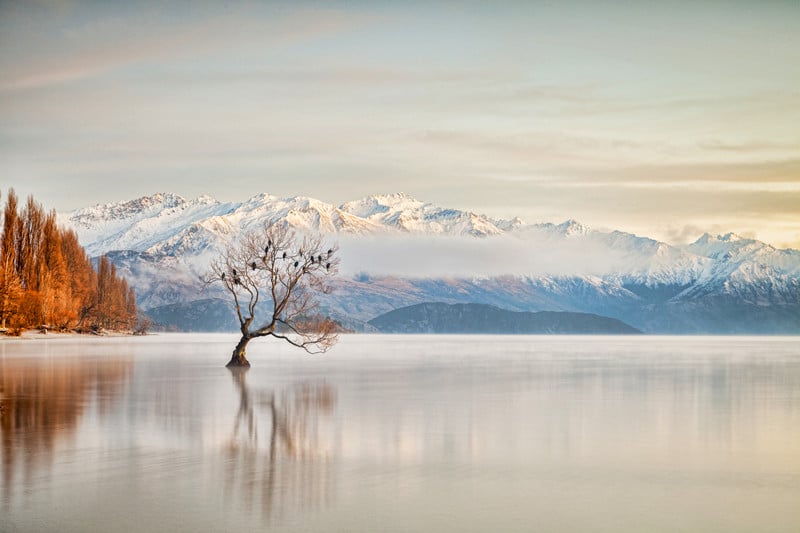
100% yes! It's an extraordinary experience. You'll meet amazing people, locals, a lot of backpackers and other working holiday makers.
You'll learn new things, try different types of jobs, and travel to an amazing part of the Earth. New Zealand is a truly beautiful and unique country that should be on anyone's bucket list…
How to make the most of your New Zealand work and travel experience
Buy a (camper) van.
Buy yourself a self-contained car or van to live in. Having your own vehicle is the cheapest way to live and the best way to explore the country. You can sell it when you leave the country.
Be sure to download CamperMate , a free app that helps you find free campsites, showers, laundries, and everything else related to van life.
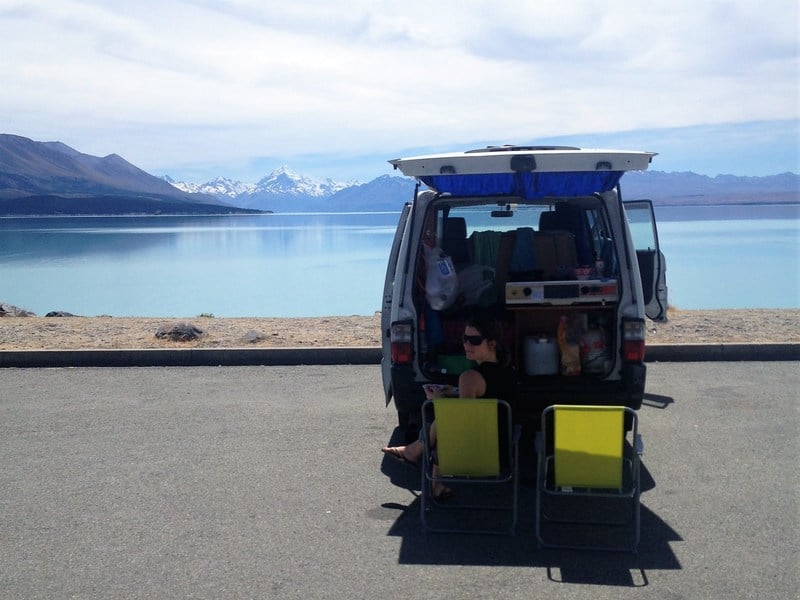
Look for housesitting opportunities
Look for housesitting opportunities *, because it can save you a lot of money for accommodation. The most popular house-sitting site in New Zealand is KiwiHouseSitters. (*I've personally used Trusted Housesitters and they have lots of NW housesits available as well).
Join NZ Working Holidays groups on Facebook
There are a lot of people sharing job offers or other handy tips, plus you can anytime ask if you need help with something. Here are some helpful groups to join:
- New Zealand Backpackers
- House Sitting New Zealand
A final tip for all people interested in New Zealand's working holiday visa
My most important tip? Just go and stop making excuses!
Don’t have a lot of money? Traveling is cheaper than you might think and you can work during your travels.
Don’t know the language? There is no better way to learn than by living in a foreign country.
Don't have anyone to travel with? Travel solo! You'll have even more opportunities to meet amazing people than traveling as a couple.
Don't know how to arrange your NZ Working Holiday? When you book with Global Work & Travel you'll get a dedicated Trip Coordinator who provides step-by-step guidance and assistance and will even set up job interviews for you (use the coupon code PHENOMENALGLOBE for a €100 discount) .
Work travel visa New Zealand: conclusion
I hope this post has answered your questions about the working holiday NZ visa. Check this page for more info about work and travel.
Read about teaching in South Korea or doing a work and travel holiday in Australia or Canada . Or check my extensive New Zealand page for more travel inspiration.
This post was updated in February 2023.


90,358 + dreams turned into reality

Trip overview
Qualification, trip details.
- Trip location
Trip itinerary
How it works, working holiday in new zealand (plus).
466 others looking at this too. Next opening is Jul 2024 , with limited spots.
If you love the outdoors, then you must travel to the natural playground that is New Zealand! From rafting down raging rapids to world-renowned ski resorts, you’ll never run out of thrills and stunning wilderness.
And when you go on a Working Holiday in New Zealand, you can live and work for up to 3 years.
You could wing it and try to do everything yourself. Sure, some people do, but more often than not, it’ll be confusing, expensive, anxiety-inducing and time-consuming heading to a land unknown for the first time.
This is an experience you’ll likely only do once, and the last thing you'd want is to be returning home with your tail between your legs just after you had your going away party (& blown all your savings).
But, luckily, we have the solution that close to 90,000 others before you have chosen since 2008, as the world's leaders in working holidays. What if you could instead:
- With our Money-Back Guarantee in place, receive a New Zealand Job Match before you even arrive* – year-round & all-done virtually from home (with no job fairs to travel to & compete at, unlike our competitors).
- Land a job almost anywhere , from coastal towns to mountain resorts, with the largest network of partner companies loaded with perks like staff accommodation, ski passes + more!
- Keep the adventure going with a second country job match included in another destination for the ultimate work & travel experience around the globe!
- Meet others before you go through our exclusive app . Join Global Traveller side-trips & meet-up events too.
- Get help with flights, travel insurance, accommodation, visa applications & more.
The ultimate way to have a hassle-free working holiday. Working to live (and not living to work), meeting other travellers, waking up every day to a new adventure, and making everyone back home severely jealous of all your stories.
Land in New Zealand prepared & excited, not anxious and scared - life’s too short for that.
For a similar trip with the essentials only, check out this Working Holiday in New Zealand package. Keep a very careful eye on dates though, as capacity for both these trips are limited.
Tap to show less
Guaranteed job match pre-arrival*
A lot of companies don’t hire travellers, but we partner with many of the best that do. This means you will be pre-matched with an open position before you even arrive (or in your first couple days). And we're so sure of it, that we offer a money-back guarantee if you don't. (*TCs apply)
2nd country job match*
When you’re done here, head to another country for your next adventure! This trip includes another Working Holiday job match, or switch it up as an Au Pair or Tutor, in any other country we offer, except USA, Germany & South Korea. Visa guidance & virtual orientation included too!(*TCs apply)
Dedicated Trip Coordinator
Working holiday visa guidance, personal travel concierge, private airport transfer.
Don't get stuck, lost or waste money on a taxi. Start your trip off right and roll up like a VIP. When you arrive a private driver will be waiting at the airport to whisk you straight to your included accommodation in style.
4 nights of hostel accommodation
Meet other Global Travellers in the heart of Auckland. A 6 person dorm makes it the ultimate lodging for jet-lag recovery, or treat yourself and upgrade! (6 person subject to availability)
"Welcome to NZ" virtual orientation
Our virtual orientation will get you up to date with everything you need to know about living and working in New Zealand. You’ll be a Kiwi in no time!
Local life essentials
Nz experience day.
In your first few days, enjoy one of two epic activity packages jam-packed with the best local experiences. Option 1: Thrill Seeker - Get your adrenaline pumping on a bungy jump and visit to Rangitoto Island. Option 2: Explorer - If you love adventure, the Auckland Bridge climb, Waiheke Island Wine Tour and hop-on-hop-off island bus tour is for you.
Queenstown adventure
Permanent accommodation resources.
If permanent accommodation isn’t provided with your job opportunity, our local team can provide you with links and advice to find a place to stay.
Ongoing local team support
Global emergency line.
Feel confident knowing we have a worldwide emergency team on standby, 24 hours a day, Monday to Friday.
gWorld access
Travel alone but never lonely with Social! An exclusive social network inside our gWorld app to talk, share & meet-up with other Global Travellers in your region, with a dedicated Community Manager.
Global Academy
Gain access to an ever-growing range of skills & languages to learn before & whilst you travel.
Marketplace deals
$250 off your next trip.
Tap to expand
Just in case it’s not clear already, we’re not an employment or recruitment agency. Read more
To qualify for this trip you must meet the following requirements:
- Be between 18 - 35 years of age
- Be a citizen of an eligible country
- Have no criminal convictions in the past 5 years
Ask a question
Chat with us online now, or we can call you back for free, 24 hours Mon-Fri.
Can you picture it? You just finished your shift at the ski rental shop and time to squeeze one last shred down the mountain. Then it's off to your favourite après bar to meet up with your new international besties you met at your staff accommodation. Your bank accounts are topped up so you decide to book some cheap flights over to Australia for a long weekend surf trip, followed by a round of kiwi beers to celebrate!
And all this sorted without potentially spending over a month or longer hunting for a job in a foreign country with no income and your savings dwindling by the hour!
Get a job sorted before you land with our Guaranteed Job Match Pre-Arrival*, the ultimate way to explore another country without having to chew through your savings like most people who decide to wing it generally do.
Our robust trip planning process, perfected after serving tens of thousands of Global Travellers since 2008, includes visa guidance and a virtual interview you can do from the comfort of home. Our team will be in your corner to answer any questions you or your family may have too, so you can exchange most of those nerves with pure excitement about the adventure of a lifetime ahead.
Accommodation? We can help with that as well. Your first 4 nights are covered at a top-rated hostel in Auckland. After that, most jobs provide staff housing at a really low rate (but these ones can go quick). If your job doesn’t, our team will provide you all the guidance and tips you need to find something suitable - yet another reason why going with Global means you get the best of the best with access to our offices in Australia in the same timezone (unlike our competitors).
As for the solo traveller side of things, you’ll have an instant friend group wherever you end up, too . How?
Because our social network app – gWorld – connects you with other Global Travellers in your area. So you can go on a hike, meet at the pub, talk to someone with the same accent as you.
We take care of pretty much everything so you don’t have to.
And when it’s time for a change of scenery during or after your initial job, book a short and cheap flight over to Fiji. Or better yet - hop on an exclusive Global Getaway alongside other Global Travellers to a bucket-list location!
And lucky you – you’re earning more than enough in full-time positions where you get 100% of your earnings (unlike some recruitment agencies), with New Zealand paying around NZ$23/hr or more, to thrive and still have some left over for spontaneous trips or general shenanigans.
As you embark on this side trip, you can rest assured knowing that the thrill of exploration won't be dampened by worries of your adventure overseas coming to an end. Why?
Because you've shared your aspirations with your dedicated Trip Coordinator, expressing your desire to pursue your included second country job match, in a fresh and captivating corner of the globe. We know that after this first experience you probably won’t want to go home just yet, so with your newfound work & travel confidence and know-how, head somewhere new to keep on exploring.
Our team springs into action, mapping out the vast possibilities across borders. Will your next endeavor lead you to working at a tropical island resort Australia? Perhaps as an English Tutor for a summer in the south of France? You decide. All backed up with our support and app. Work, travel, rinse & repeat!
BUT! There’s a catch….
Most travellers book their trip 6-12 months in advance, or more! Dates are flexible, but spaces are limited, and intakes are closing off regularly without much notice. So if you’re serious about living in New Zealand, check dates & prices now to get things started before you’re too late, or too old.
With our Book Now, Decide Later option, you can get started with a small deposit today, and take up to a full year to choose your dates.
We’ll take over from there, helping you with visas, flights, accommodation, and matching you with a job opportunity before you go*.
If you’re after the ultimate, and the best, working holiday to New Zealand out there, complete with everything you need and 24/7 worldwide support, click the red box and follow the quick & easy steps to secure your spot. You, your parents and your bank account should thank us later.
Requirements
To qualify for this trip you must meet the visa requirements , and have 6 months of paid work experience by time of arrival.
What extra costs will I have?
Flights, travel insurance, visa, criminal background check, souvenirs & spending money.
Your Working Holiday in New Zealand trip is designed to help you find local, seasonal employment as a means to fund your travels further, and for cultural exchange. Our goal is to save you time, money, and stress while eliminating the risk of returning home early. Here’s how we do it:
Before you leave
Day 3 & 4.
We’re on your side from the moment you get started. You’ll be assigned a dedicated Trip Coordinator. They’ll guide you through the next steps and answer all your questions. They’ll also help you with the pesky visa. No guesswork – only the right paperwork, approved the first time, and in your hands well before you leave.
Your personal Travel Concierge will help with flights, insurance, and any add-ons you’d like for your trip. These are real humans too – no robots here.
Most travellers have their job match before they’ve left home. If you haven’t had yours within 4 days of arriving, we’ll extend your accommodation for free until you do. And if you’re not successful with your first interview - no biggy! We’ll just keep trying (*see TCs for details).
Working Holiday jobs & locations in New Zealand
Land an entry to mid-level job in New Zealand which will be fun and social, so you can make friends, learn new skills and have the freedom to explore new places. Located all across the country, you can expect to find a job in New Zealand in various industries, as we have a wide range of Partner Organisations.
- Hospitality like bars, cafés & restaurants
- Ski Resorts
- Summer Resorts
- Hotels & Lodges
- Labour & Construction
Important to remember: The host company decides who they hire and for what, so you need to be flexible & open minded. You’ll be matched with something you are suitable for.
From seaside towns to world-renowned mountain resorts and bustling cities in between, we’ve got connections to host companies dotted all over New Zealand, so you could find yourself working in any of these destinations.
- Christchurch
- Waiheke Island
We'll try for your preferences, but locations are subject to availability at your time of arrival.
Imogen R Calum was amazing at answering all of my questions. He was super helpful and very friendly:) Thank you Calum
Ashley E Stacey has been so helpful and kind through all the processes with getting me to New Zealand. She is very friendly and I love how everyone who I have spoken to is just so welcoming and it instantly feels like I have already made friends. Everyone really lightens the mood and real ... Read more
James F Amazing service and amazing staff, Cohen really helped me get set up with my trip to New Zealand and as a local himself had a more in depth chat with me!
Jack C Really personal and friendly people to talk to. Easy as ever.
Serena W My travel agent was amazing! She was so sweet and kind, she cared and made talking about this fun. She gave me ideas and is so good at what she does! She made me feel very comfortable and we laughed a lot and had fun. My experience was so awesome. I feel like i want to know her i ... Read more
New on the 'gram
Frequently asked questions.
As the world’s leading gap-year and "work & travel" company, we pride ourselves on providing a premium service for Global Travellers. Choose from a variety of awesome experiences worldwide, and let us assist you with visas, pre-departure preparations, flights, insurance, and tours. Throughout your journey, our cool tech features will support you every step of the way. As a Global Traveller, gain access to gWorld, our personalised app designed to enhance your travel experience. Keep important documents and trip details handy, and take advantage of exclusive Marketplace deals, a vibrant social network, language learning resources, side trips, meet-ups, and more. It's like having all your favorite travel apps merged into one, but even better! But our support doesn't end there. With four international offices, over 100 dedicated staff members, a 24/5 emergency team, and the backing of over 90,000 Global Travellers who have turned their travel dreams into reality with us, rest assured you're in good hands. We also proudly boast the most and best reviews in the biz, and maintain a massive following on our social channels including Instagram, TikTok, and Facebook. Embark on your next adventure with confidence and ease. Join us and discover the world in a meaningful way!
While we would love to include flights and insurance in our trip packages, it is not feasible to have a fixed price due to the diverse destinations, trip durations, and individual coverage needs of our travellers from around the globe. However, once you register for the trip, we will assign you a dedicated Travel Concierge. They will work closely with you to arrange the ideal flights and insurance tailored to your specific adventure. Rest assured, our team is here to ensure you have a smooth and hassle-free travel experience from start to finish!
When it comes to accommodation, we have some great options available for you. Many of our partner organisations offer staff accommodation as a fantastic perk. This usually entails a shared apartment or house with other like-minded travelers, conveniently located near your job. The best part is that these accommodations are often available at a subsidised rate, allowing you to save more toward side trips and fun! In the event that staff accommodation is not included with your job match, don't worry. Your Arrival Coordinator will be there to provide you with valuable resources and helpful tips on finding a suitable place to stay.
The Standard and Plus Working Holiday trips offer similar features, such as our comprehensive job matching process. However, there are a couple key differences between the two: Standard: With the Standard trip, you will receive a guaranteed job match prior to your arrival*. Plus: The Plus trip includes a guaranteed job match prior to your arrival*, just like the Standard trip. In addition, it offers the unique benefit of a 2nd job match in an entirely new country! This includes any Working Holiday, Au Pair or Tutor trip we offer, except USA, Germany & South Korea. Visa guidance will also be provided, TCs apply. Along with this, the Plus trip also provides additional tours and a side trip to enhance your experience. If you like the idea of working and travelling in more than one country, the Plus option is best suited for you. It provides the opportunity for ongoing exploration and variety during your time abroad. No need to make a decision right away on which option to choose. If you initially book the Standard trip, you can always upgrade to the Plus trip after getting registered and connecting with your dedicated Trip Coordinator.
While we strive to take your preferences into account, it's important to note that we are not a recruitment agency. Therefore, we cannot guarantee job matches in specific professions, fields, or locations. As a foreign worker on a temporary visa, it can be challenging to compete with locals for more specialised positions. Employers often prioritise candidates they can train and retain in the long term, rather than taking a risk on someone who may leave in a year or two, or less. However, the jobs we help organise on your working holiday will offer a fantastic experience. They will be enjoyable and social, allowing you to make new friends, acquire new skills, and have the freedom to explore exciting new places. Our aim is to provide you with an amazing working holiday experience, where you can embrace adventure and create unforgettable memories.
A job match is a seamless process designed to help you secure a suitable job opportunity. Here's how it works: First, we arrange an interview for you, taking into consideration your preferences whenever possible. The interviews are typically conducted virtually over platforms like Zoom, Skype, or FaceTime, making it convenient for you to participate from the comfort of your home before you embark on your trip. The key to a successful job match is simple: attend the interview on time and approach it just like any other professional interview. By demonstrating professionalism and enthusiasm, you'll increase your chances of securing a job offer without any complications. In the unlikely chance you are unsuccessful with your initial interview, our team will get to work organising you another interview. You can rest assured we are committed to finding the right opportunity for you and guiding you through each and every step of the job matching process to ensure success. For more details, please refer to your booking conditions.
Absolutely! While the jobs we help you land usually provide full-time hours, they often come with flexibility that will allow you to take time off for side trips, exploring, and fun. We understand the importance of travel experiences, and our aim is to provide opportunities that balance work and leisure. While the level of flexibility can vary based on the specific job and employer, we strive to match you with positions that provide allowances or arrangements for time off. This way, you can plan and enjoy additional adventures before, during, or after your work placement!
Ever since our inception in 2008, we have been dedicated to providing exceptional job opportunities to our travellers. We take pride in having built the largest network of partner organisations across the country, all vetted and perfectly suited to host a working holidayer. One of the greatest advantages of going Global is that we streamline the entire process for you, meaning, you won't need to go through the hassle of attending job fairs (like our competitors make you do) or spending countless hours job hunting. We take care of the hard work by understanding your job and location preferences, then connect you with one of our awesome partner organisations. We then ensure you are well-prepared for the interview, to help you land a job before you leave home*. To explore all the amazing options available, we invite you to check out our Working Holiday jobs & locations section located above.
The benefits of doing a Working Holiday trip are numerous. It offers you the opportunity to experience a new country, immerse yourself in a different culture, gain international work experience, develop new skills, make lifelong connections, and create unforgettable memories. It is a chance to combine travel and work while exploring a new destination.
We provide comprehensive support throughout your Working Holiday trip, from the initial planning stages until your return home. Our team is available to assist you with visa applications, job placements, accommodation options, and ongoing support from our worldwide offices while you are overseas, including a 24/5 emergency line. We also provide pre-departure guidance and resources to help you prepare for your adventure.
Absolutely! While the earning potential may vary based on your destination and job type, the income you'll receive is more than sufficient to support you comfortably while abroad. It can cover all your living expenses, accommodation, transportation, and even allows for savings to explore your new home or continue travelling afterward. Additionally, many of our partner organisations offer fantastic perks like discounted staff housing, food and beverage, ski passes, and more, helping you save money and make the most of your Working Holiday experience.
After the last unexpected disruption to travel caused by the..c word..people are now more eager than ever to venture out and explore the world, determined not to miss out on any experiences. Global Work & Travel works on a first-in-best-dressed basis. Booking earlier ensures that you don’t miss out on the best intake, season, placements and more! We recommend our travellers take 6-12+ months to plan their trip for a reason - to make sure you’ve got everything organised perfectly, stress-free. As a Global Traveller you’ll get exclusive access to gWorld, our personalised app where you can keep all of your important documents and trip details in one spot and gain insider access to everything Global. This is where you will find exclusive Marketplace Deals, a unique social network to connect you with other like-minded Global Travellers, access to our Academy with an ever-growing range of skills & languages, and so much more. Think all of your favourite apps merged into one, but like, better? Why not give yourself something to look forward to by booking that trip!
Yes you can! Simply tell your Trip Coordinator after booking that your friend is also going and they can link your profiles. For most of our trips we should be able to have you and your friends placed together or nearby. Meaning that you can live, work, play & travel together! But wait there's more! Not only can you travel the world with your besties at your side, you can also earn some extra cash towards your own trip just by referring your friends to Global Work & Travel. You can learn more about the great referral rewards program inside your gWorld account once you join. And for those who decide to go-it-solo, we’ve made it easier to meet other Global Travellers in the same region as you. Just like any other social platform, you’ll be able to interact, share, chat and meet with some really cool people who are doing trips just like you!
At Global Work & Travel, we share a deep love for animals and fully understand the special bond you have with your pet. We recognise the challenges of embarking on a trip without them. Due to travel restrictions, requirements, and limited pet-friendly accommodations among our host organisations, we regretfully cannot facilitate their inclusion in the journey. However, many of our customers choose to entrust their pets to a family member or friend, embark on their adventure, and return home to wagging tails and furry cuddles.
We know that life can get in the way of travel, so all our trips come with a great deal of flexibility. In most cases, if you cannot travel on your selected date, you can place your trip on hold to deal with whatever is holding you back, and continue in the future without incurring any penalty. You may also have the option of transferring to an entirely different trip and destination as well, or even transferring your trip to a friend or family member. In the event that you need to outright cancel your trip, if you give us 84* days notice you can do so with only a 50% cancellation fee. Your refund of the balance will come in the form of a Store Credit which you can put toward any other trip that we offer, including tours through third-party providers, as well as holidays through DealsAway.com, and is valid for 2 years from date of issue. As international travel can be complex, your options are based on the progress of your trip organisation and our support team can assist you in finding the best solution for your needs.
1. Choose a trip style
Find your dream experience & destination, then secure your spot with a flexible & low deposit. Activate your gWorld to unlock some cool perks. Well done! The hardest part’s over!
2. We become friends
Book a time to meet your dedicated Trip Coordinator who knows all the ins & outs of your trip. They’ll be by your side and working behind-the-scenes to pull everything together.
3. Time to go!
We’ll get your tickets, accommodation & transfers ready. Our in-country team or partner will have everything prepared & waiting for your arrival. Get on the plane with no worries!
4. 24/5 support
Never stress, knowing we’re there with you when you need us with ongoing & unlimited local team support. And just in case, we’ve got an emergency team on stand-by, 24 hours, Mon-Fri.
Still have questions?
Why go global, flexible trips.
The unexpected can happen sometimes. Can't travel right now? Swap your trip, gift it or save it for later with our Lifetime Deposit Guarantee.
Worldwide support
Know that someone is always ready to assist throughout the journey & they’re only a call, tweet, comment, text or double tap away, 24/5.
We're the experts
With over 10 years in the industry and a team of over 90 passionate pros, you can bet we know our stuff better than anyone else.
Partner network
We have over 1,200 partners around the globe, so we have access to plenty of exclusive opportunities to make your trip the best it can be.
Check out these similar trips
See reviews Enquire now
Email: [email protected]

- New Zealand Travel Blog

Welcome to our New Zealand Travel Blog DownsideUP
This blog is dedicated to inform and inspire you on all things to do with New Zealand..
Actually we write posts on anything that’s of interest in the South Pacific (our home) DownsideUP was started in 2008, to help people just like you, with planning the perfect NZ Self Driving experience .
South Island Family Itinerary
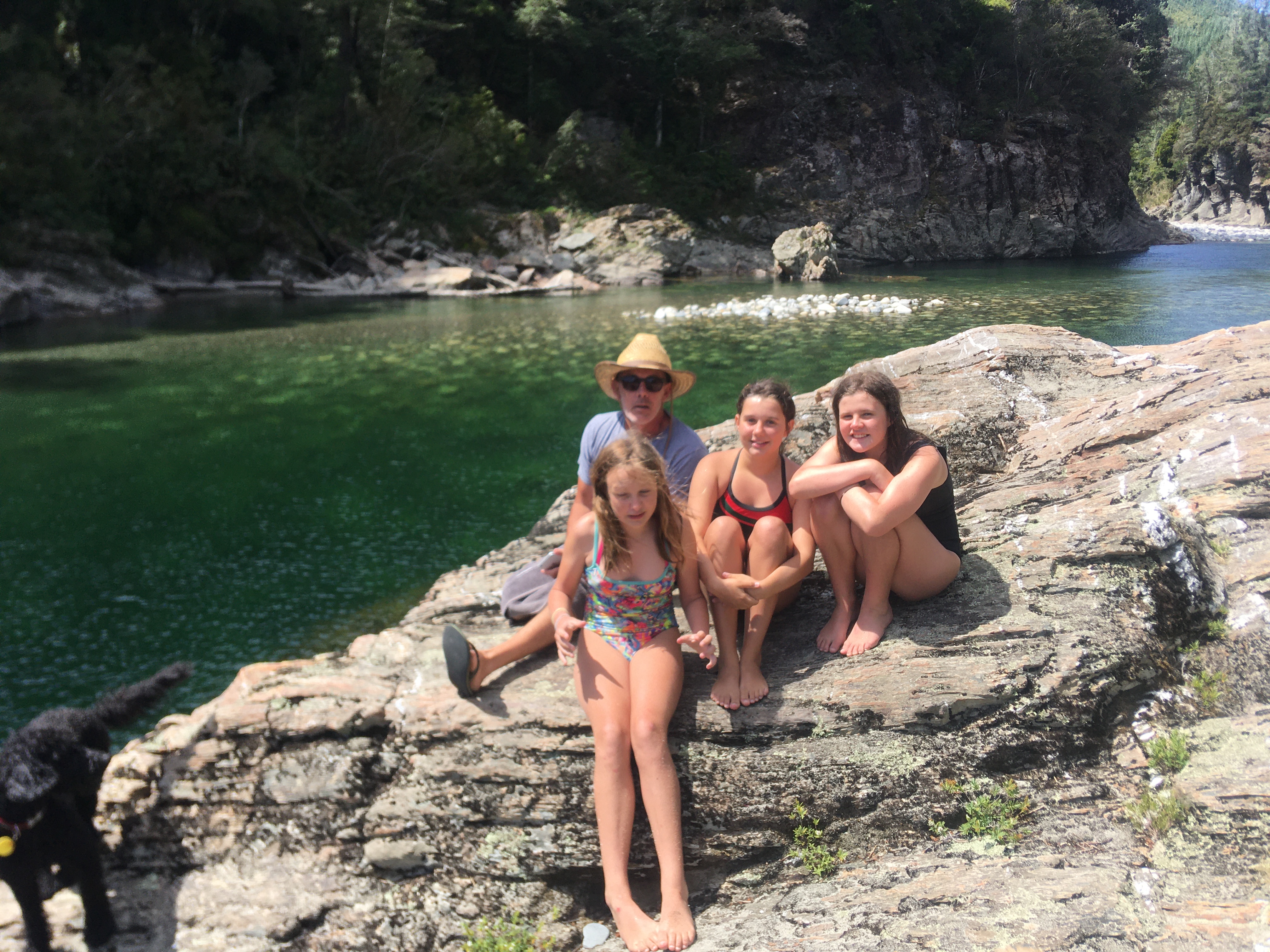
3 April 2024
The Best Reasons to Visit the South Island in Autumn
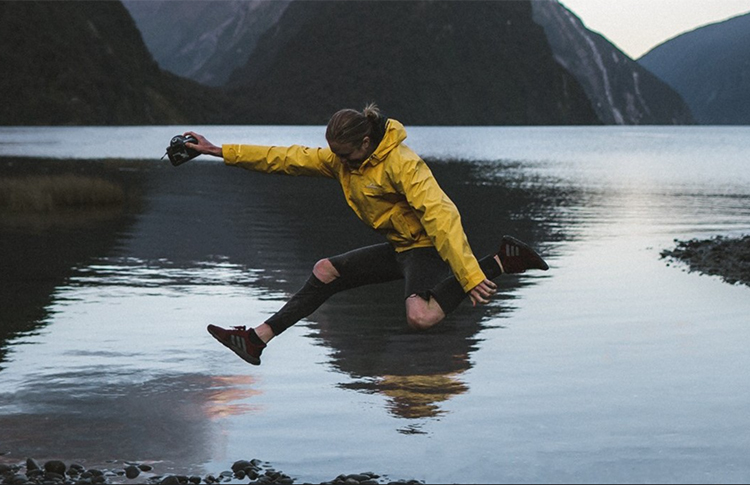
21 March 2024
Best places to visit on the West Coast of the South Island of New Zealand
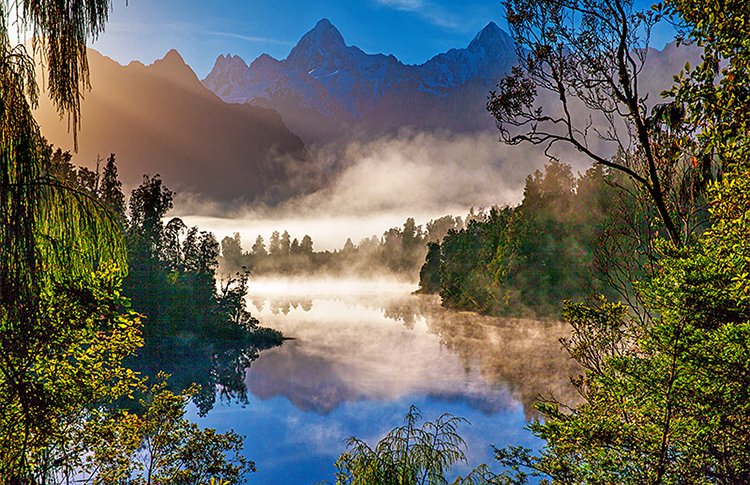
20 March 2024
How Much Does a New Zealand Honeymoon Cost?
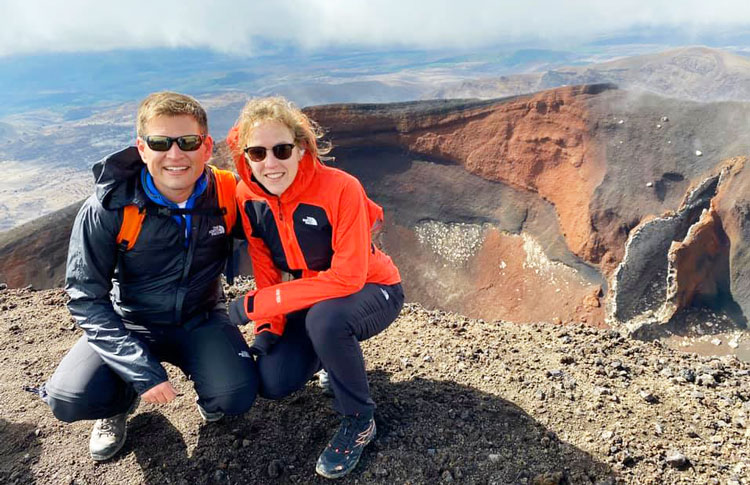
8 January 2024
New Zealand Honeymoon Travel Agent - Work with the Best!
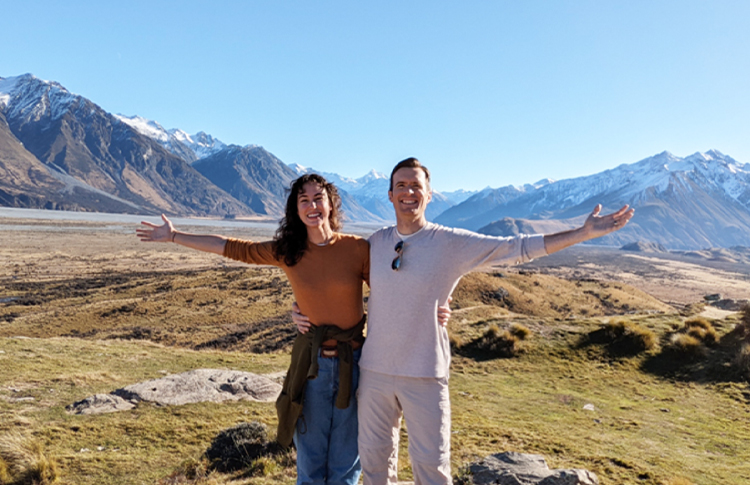
If you’re looking for the best New Zealand honeymoon travel agent, then it’s hard to go past the Travel Designers at First Light Travel .
3 January 2024
How to Decide Between Milford and Doubtful Sound
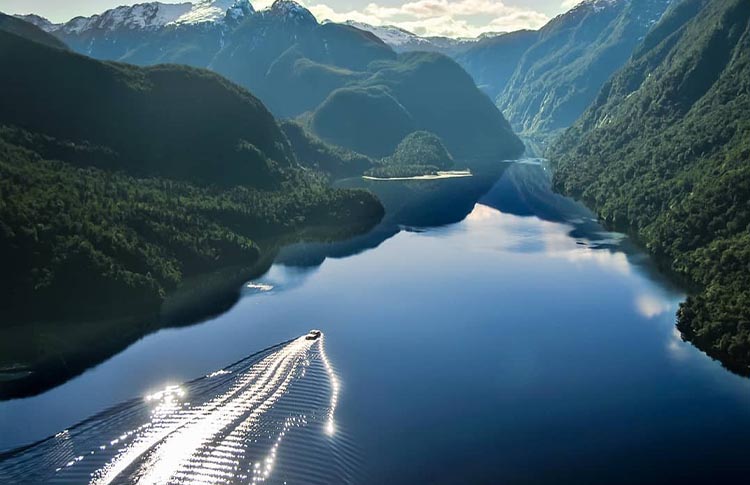
When contemplating the breathtaking natural wonders of New Zealand, the choice between visiting Milford Sound and Doubtful Sound stands as a pivotal decision. Nestled within Fiordland National Park, both destinations boast unparalleled beauty, characterized by majestic fjords, towering peaks, and serene waters. However, distinct nuances in accessibility, wildlife encounters, and the overall immersive experience differentiate these iconic locations. Delving into the parameters of travel, one must navigate the unique attributes of each sound to make an informed and unforgettable choice.
27 November 2023
The Best Destinations to visit on your New Zealand Honeymoon
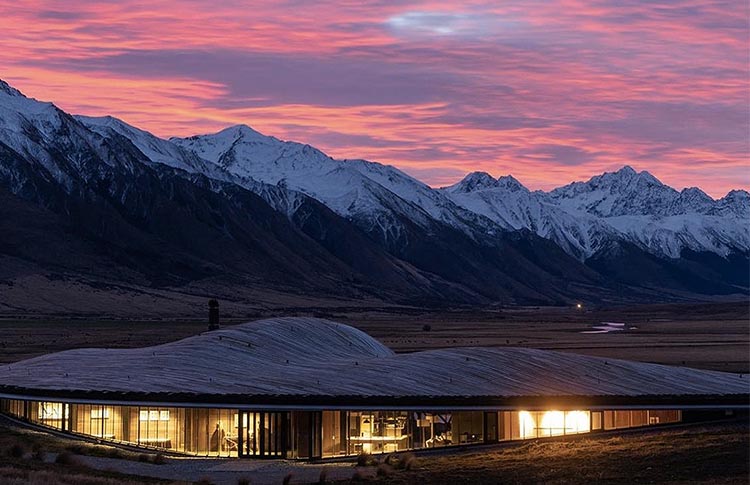
A New Zealand honeymoon is bound to deliver on breathtaking locations and unforgettable experiences no matter where you go. Still, to be sure that you make the very most of your very special trip, here are some suggestions for the best destinations to visit on a New Zealand honeymoon.
21 November 2023
Best time for a New Zealand Honeymoon
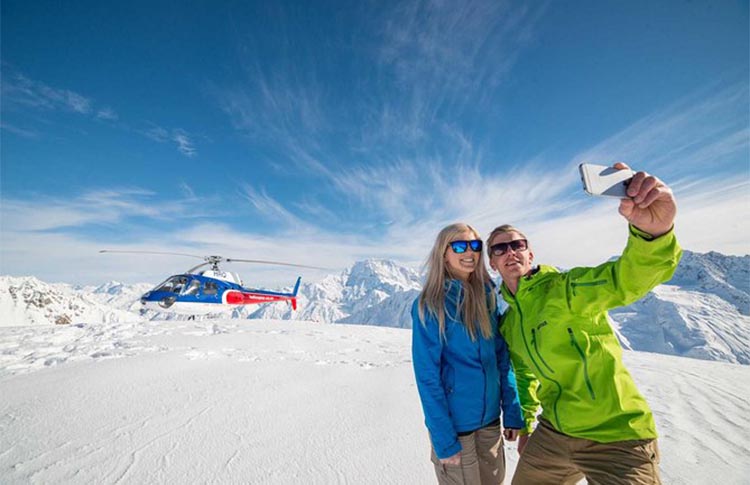
If you like the idea of planning a honeymoon in New Zealand , but aren’t sure of the best time to do so, don’t worry. You’re in the right place!
7 Luxury Activities for a New Zealand Honeymoon
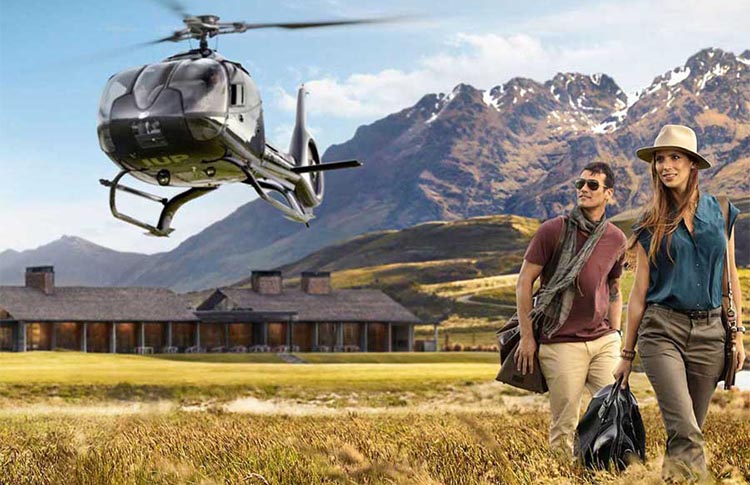
If your idea of the perfect honeymoon includes luxury an
7 Reasons to Honeymoon in New Zealand
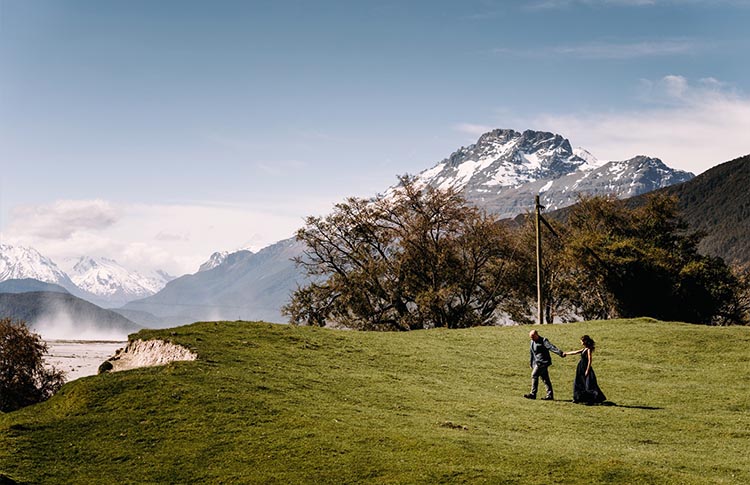
Whether you’re looking for a quiet escape or an unforgettable adventure to celebrate the start of your married life together, there are many reasons to choose New Zealand as your perfect honeymoon destination.
20 November 2023
Download Our Free NZ Travel Guide
Get our free guide which is full of actionable tips and information about how to make the most of your time in New Zealand.
Recent Posts
Blog categories, blog archives.
- April 2024 (1)
- March 2024 (2)
- January 2024 (2)
- November 2023 (9)
- October 2023 (2)
- August 2023 (1)
- June 2023 (1)
- May 2023 (2)
- April 2023 (1)
- March 2023 (17)
- February 2023 (4)
- January 2023 (2)
- December 2022 (11)
- November 2022 (7)
- October 2022 (1)
- May 2022 (1)
- March 2022 (3)
- February 2022 (3)
- January 2022 (1)
- December 2021 (1)
- August 2021 (1)
- June 2021 (1)
- May 2021 (2)
- February 2021 (1)
- August 2020 (1)
- July 2020 (1)
- May 2020 (1)
- April 2020 (1)
- March 2020 (1)
- January 2020 (1)
- December 2019 (1)
- November 2019 (1)
- October 2019 (1)
- September 2019 (1)
- August 2019 (5)
- July 2019 (2)
- June 2019 (1)
- May 2019 (3)
- April 2019 (1)
- March 2019 (1)
- February 2019 (1)
- January 2019 (1)
- December 2018 (1)
- November 2018 (1)
- September 2018 (1)
- August 2018 (1)
- July 2018 (1)
- June 2018 (1)
- May 2018 (1)
- April 2018 (1)
- March 2018 (1)
- February 2018 (1)
- January 2018 (1)
- December 2017 (1)
- October 2017 (1)
- September 2017 (1)
- August 2017 (1)
- July 2017 (1)
- June 2017 (1)
- May 2017 (1)
- April 2017 (1)
- March 2017 (1)
- February 2017 (1)
- January 2017 (1)
- December 2016 (1)
- November 2016 (1)
- October 2016 (1)
- September 2016 (1)
- August 2016 (1)
- July 2016 (1)
- June 2016 (1)
- May 2016 (1)
- April 2016 (1)
- March 2016 (1)
- February 2016 (1)
- January 2016 (1)
- December 2015 (1)
- November 2015 (1)
- October 2015 (1)
- September 2015 (1)
- August 2015 (1)
- July 2015 (1)
- June 2015 (1)
- May 2015 (1)
- April 2015 (1)
- March 2015 (1)
- February 2015 (1)
- January 2015 (1)
- December 2014 (1)
- November 2014 (1)
- October 2014 (1)
- September 2014 (1)
- July 2014 (1)
- June 2014 (3)
- May 2014 (1)
- April 2014 (1)
- March 2014 (1)
- February 2014 (1)
- January 2014 (1)
- November 2013 (15)
- October 2013 (1)
- September 2013 (1)
- August 2013 (1)
- July 2013 (1)
- May 2013 (1)
- April 2013 (1)
- March 2013 (1)
- February 2013 (1)
- January 2013 (1)
- December 2012 (1)
- November 2012 (2)
- October 2012 (2)
- September 2012 (2)
- August 2012 (2)
- July 2012 (2)
- June 2012 (2)
- May 2012 (2)
- April 2012 (3)
- March 2012 (2)
- February 2012 (2)
- January 2012 (2)
- December 2011 (2)
- November 2011 (1)
- October 2011 (2)
- September 2011 (1)
- August 2011 (1)
- July 2011 (1)
- June 2011 (1)
- May 2011 (1)
- April 2011 (1)
- March 2011 (1)
- February 2011 (1)
- January 2011 (1)
- December 2010 (1)
- November 2010 (1)
- October 2010 (1)
- September 2010 (1)
- August 2010 (1)
- July 2010 (1)
- June 2010 (1)
- May 2010 (1)
- March 2010 (1)
- February 2010 (1)
- January 2010 (1)
- December 2009 (1)
- November 2009 (1)
- October 2009 (1)
- September 2009 (1)
- August 2009 (1)
- July 2009 (1)
- June 2009 (1)
- May 2009 (1)
- April 2009 (1)
- March 2009 (1)
- February 2009 (1)
- January 2009 (1)
- December 2008 (1)
Pricing terms
The price is based on current exchange rates but is only an approximation. Please contact us for a final price

WHV New Zealand: Guide to planning your Working Holiday in New Zealand in 8 steps
You are planning to go to New Zealand with a WHV (Working Holiday Visa). But you don’t know where to start to prepare for it? This article is for you!
Leaving for a year on the other side of the world is exciting. But it can also be stressful to forget about something during the pre-departure preparations. Indeed, New Zealand is not right next door and a one-year trip is not something you can improvise.
I have listed below the 8 steps that I think are essential for the good preparation of your future WHV in New Zealand.
Check the eligibility requirements for WHV New Zealand
The first step is to make sure you are eligible for this type of visa.
Indeed, WHV, whether in New Zealand or elsewhere (Australia, Canada, etc.), is not a visa open to everyone and it is important to check that you can leave on this program.
What is WHV?
Working Holiday Visa is a program created to encourage young people to travel abroad. It is aimed at anyone aged between 18 and 30 (35 for a few selected countries) who wants to live abroad for a few months up to 2 years (only for a few selected countries as well i.e United Kingdom, Canada). The common length of stay is 12 months.
This visa is very popular with young people because it allows you to travel in the country BUT ALSO to work to finance your trip. And perhaps acquire your first professional experience abroad.
Eligibilty requirements for WHV New Zealand
New Zealand government define the requirements and you can find details on their official website .
The conditions are relatively easy to meet:
– Have a valid passport that is valid after you return
This may seem obvious, but the subtlety is that your passport must also be valid for 6 months after your return date. Yes, this may seem surprising but it is in fact a general rule for many countries and therefore not specific to the WHV program.
Be careful to check the expiry date of your passport. If you only have a few months left, it may be good to redo it. And who knows, you might be spending more than a year abroad.
The proof is that I left for Australia in 2016, thinking I would go for a year and here I am almost 4 years later, still on the other side of the world, in New Zealand.
– Age range
To be eligible for a WHV New Zealand, you must be between 18 and 30 years old (French nationality). This can be up to 35 years for a select few countries.
– Be in good health and have a good travel insurance
Travel insurance is essential and compulsory for obtaining the visa. I’ll talk about it in more detail below.
They may ask you for proof of your travel insurance on arrival.
– Proof of sufficient funds to live in New Zealand
The government requires you to have a minimum of NZ $4,200, or approximately 2,400 euros to live on during your trip.
However, this does not mean that you need to carry it with you when you arrive in NZ. You only need to be able to show proof that you can access this amount in case of a problem.
On arrival, they may ask you for provide proof of this, so don’t forget to print out a statement of account a few days before you leave to prove this amount.
However, I strongly recommend that you leave with a minimum amount of money set aside. You never know if you won’t find a job right away or if you want to go on a road trip directly, it’s always good to plan ahead.
– Not bringing a dependent child with you
Indeed, this visa is individual and therefore you cannot bring your family on the same visa. If you wish to come here with your partner, he/she will have to apply on a separate application.
– You must be outside New Zealand to apply for the visa
You cannot apply for WHV on New Zealand soil. This means that, if you are currently in New Zealand on a tourist visa, you will have to leave New Zealand (why not a short trip to the pacific islands or Australia) in order to apply for your WHV. Then, you can only return when your application is granted.
Apply for the visa
You just found out you were eligible for a WHV New Zealand, everything is ok. Now you have to apply for your visa.
Nothing could be simpler! The one and only way to apply is on the official NZ immigration website.
Go to immigration.govt.nz website in the ‘Working Holiday Visa’ section

You will have to choose your nationality and where you are applying from. The conditions will be reminded of you, make sure you are eligible! Then you can proceed with payment.
The WHV New Zealand costs NZD $280, or 160 euros. And your application can take up to 4 months to process.
Quite often the application is accepted within a few days if you meet all the criteria.
Updated Alert Cov id: Since August 10, 2020, the government has temporarily suspended applications for working holiday visas from outside New Zealand. Stay informed of the situation via the official NZ immigration website in case of changes or reopening for applications.
Subscribe travel insurance specialized in W orking Holiday
As explained in the WHV eligibility conditions, being in good health and having adequate travel insurance is MANDATORY.
You would not wish to go to the other side of the world without a medical check-up before departure. At least just to make sure that everything is fine and that you leave with a peace of mind. Especially when you realise the cost of health care here. So, I strongly recommend that you make an appointment with your GP before departure.
Having said that, checking that you are in good health is not enough. You never know what can happen when you travel so it’s better to be covered. Choosing a good travel insurance that corresponds to your trip (in this case, WHV) and your needs, is extremely important. There are many travel insurances that offer special WHV insurance. This would be perfect for your project.
I have written a complete article about good health reflexes before departure and especially how to choose your travel insurance.

I give you some feedback on my experience with Chapka Insurance and their Cap Working Holiday insurance, which I took out for my WHV Australia and my WHV New Zealand.
Choose your arrival ci ty for your WHV New Zealand
Before you can book your plane ticket, it is important to choose which city you want to arrive in. And also to think of your departure city! Paris or London is the cheapest way to travel to New Zealand from France or the UK. But, you can also find cheaper offers from other European cities, which may be worth it.
New Zealand has 5 international airports. Two on the North Island: Auckland and Wellington. And three on the South Island: Christchurch, Queenstown and Dunedin
This way you can choose which island you want to arrive on. If you are flying from France or the UK, there is a good chance that you will arrive in Auckland, Wellington or Christchurch.
However, depending on the city you choose, the price of your flight ticket may change more or less. As Auckland is the largest and best served international airport, flights will generally be cheaper.
In order to choose your arrival city for your WHV in New Zealand, it is important that you define what you plan to do after your arrival. Do you want to visit and travel directly? Or do you plan to work a few months beforehand? All these questions will help you make your choice.
It would also be a good idea to look at the season you will be arriving.
Winter in Auckland is not the same as in Christchurch. Temperatures can be very different from island to island.
I personally chose to arrive in Auckland. Having travelled to Bali for 2 months after our WHV in Australia, we needed to find a job quickly. So, there is nothing better than the economic capital, and the largest city in the country, to do it. Just as much as our plan for this WHV was to mostly work (and therefore remain sedentary in a city) with the aim of getting a long-term work visa. Which we obtained not even 6 months after our arrival ;D
I am planning to write a special blog post on the different visas and how to stay in New Zealand for the long term. If you are interested, let me know in a comment.
In addition, we also wanted to buy a van so that we could continue to travel on weekends; and nothing better than a big city to have a wider choice. If you want to buy a car when you arrive, I recommend Auckland on the North or Christchurch in the South. Since Wellington is not a very popular arrival city, there are fewer car offers. Indeed, this city is right in the middle of the two islands. And therefore, it is not really ideal if you want to make a road trip on both islands.
Book your plane ticket
You’re almost there! The big departure is approaching and the excitement is building!
THE big step in booking your plane ticket has arrived.
Your project is becoming more and more concrete: you have your visa in your pocket, you’ve chosen your arrival city, now all you have to do is choose how you are going to get to the other side of the world. Well, the choice of made rather quickly on the plane, isn’t it?
With a minumum 23 hours flight, it’s important to choose the right airline to make the most of your journey.
Should you book your flight via online comparators or directly with the airlines?
As you probably already know, there is nothing better than online flight comparators to find the cheapest flights. Skyscanner being one of the most reliable platforms. On this one, you can do a monthly search to see which days are the cheapest (very handy if you are flexible on your departure date).
However, is it wise to book your flight on flight comparators?
Under normal circumstances, and if you don’t care about quality and long transit times, it can pay off. You may find low prices, defying all competition. But pay attention to the conditions. Usually these are not available before you buy, or are not very detailed. These types of low cost tickets are almost cost effective and cannot be cancelled/changeable. So before booking a ticket on the comparators, you should be sure that you will not need to change your ticket in the future.
If this is your first trip/fist long-haul flight, and considering the current situation (Hello Covid19), it would be better to play it safe by booking directly on the airline’s website or through a reputable travel agency.
By going through an airline, you will have access to the terms and conditions of your ticket (additional fees in case of change/cancellation, etc.) BEFORE purchase. This allow you to check that these conditions are suitable for you before you book.
The best airlines serving New Zealand
- Emirates (My favorite so far. You’ll be flying an A380, the stopover is rather short and the service is exceptional)
- Singapore Airlines or Cathay Pacific (These 2 Asian airlines are very well rated in terms of comfort. Part of the flight is also on A380. This can be a good option if you want to make a long transit or stopover in Asia).
To finish on the reservation of your ticket, be flexible on your date of departure! Shifting your date by a few days can sometimes save you a significant amount of money.
And finally, I would advise you, first of all, to compare the offers on a flight comparator to find the cheapest day available. And then to finalise your booking directly on the website of the airline you have chosen.
One-way or return ticket?
Choosing a one-way or return ticket can be difficult. This is up to you and also depends on your future plans. I would tend to recommend a one-way ticket; so you don’t limit yourself in time.
Indeed, at the moment, you only want to go for a year, but will it be the same after spending 2-3 months in the country?
At my first WHV in Australia, I had taken a return ticket because I was convinced that I would only stay there for a year. Less than 2 months in Australia were enough to make me change my mind 😉
View this post on Instagram A post shared by Justine ✈ New Zealand (@justinejehanno)
Documents to keep or terminate before your departure
– appl ying for an international driving license.
If you have a driving license in your home country, and you are going to New Zealand for a road trip (why not in a van? Very common way to travel across NZ), I strongly advise you to apply for an international driving license.
You will not be able to drive, or indeed buy a vehicle, in New Zealand without it. It is therefore a must-have with you. This does not apply to the UK (or any English country) where your current driver’s licence will suffice.
Keep in mind that this request can take time so try to make it as soon as possible. Once issued, the international permit is valid for 1 years in New Zealand. If you stay longer, then you might need to apply for a local NZ driver license.
– Save important documents on Email/Cloud
You will have a small packet of official documents (passport, visa, insurance certificate) to keep on hand for your arrival in New Zealand, and even afterwards if necessary. I advise you to scan them to have them in digital format (keep them by email or on the cloud).
The idea being that in case of loss or emergency, you always have a copy on you (in your phone) and it will be easier while waiting t have them redone.
– Notify the official organisations of your departure
If you receive aid from certain organizations, you must inform them of your new situation so that they stop or freeze your rights until you come back.
– Contact your bank
It may be a good idea to contact your bank to let them know you are leaving. It would be a shame to end up with your card blocked for fraudulent use on your first day in New Zealand because you forgot to tell them you were leaving.
Also, it can help you find out the cost of using your card abroad and see if you need to change it or change your limits.
You may also decide to apply for a power of attorney if you want someone of your choice to manage your account for you if necessary while you are away.
– Cancel your phone plan, accommodation, etc.
Don’t forget to cancel your phone, internet and any other subscriptions you may have (gym, etc.).
And if you are a tenant, give your notice to leave your accommodation in time for the big adventure coming!
Backpack or suitcase for a WHV New Zealand?
Another big question that comes in our head when we decide to leave for a year (or more) with a WHV: backpack or suitcase?
I personally chose a backpack for my WHV New Zealand; especially as I already had it from my WHV in Australia. And that I find it very handy when you plan to move around a lot.
If your want to stay only in one place for the entire time, a suitcase might be just the thing you need.
As explained above, I have opted for a backpack. The famous Forclaz from Decathlon . I took a 60L and Ben took a 70L. Four years later – and the tour of Australia and Bali completed, they are still in perfect condition. These models are super resistant. I can only recommend if you also opt for the backpack.
We also took with us a small backpack each; that you can take in the cabin along with the essentials (passport, visa, international driver’s license, laptop, camera equipments, etc.)
The important thing when travelling is to travel light, one can quickly fall into the trap of taking too much when preparing your bag. Just take only the essentials for the type of trip you are planning (road trip, living in the city, etc.).
And don’t forget that New Zealand is a developed country where you can find everything you need on the spot.
Essentials steps on arrival
All the pre-departure preparations have been completed and it’s a good thing done. But it can be a good idea to find out quickly about the few essential steps you will have to go through, once you arrive in New Zealand.
If you’re going to New Zealand with a WHV, it is also because you are planning to work. However, you will, at the very least, need to follow these 3 small steps:
- Open a bank account
- Ask for your IRD number (mandatory for work)
- Have a New Zealand mobile number
These 3 steps will be the first ones you will have to take if you want to find a job. This should be done in just a few days (the NZ administration is quite efficient, it should be pointed out ;))
I am detailing ALL the steps to take on arrival in the blog post WHV New Zealand: Steps on arrival
Ready for your WHV New Zealand
There you go! If you have followed this article, you should be readyfor the great adventure in Kiwis land. 😉
Going overseas thanks to a WHV is an incredible opportunity to have your first long-term experience abroad. And New Zealand has everything to make your stay a success.
I hope this 8-step guide to preparing your WHV in New Zealand has helped you in your preparations. And will have given you the desire to create your own escape on the other side of the world.
If you found this blog post useful, please feel free to share it with a friend who may also need it. And leave a short comment if you have any questions or if you just want to leave a nice little note!
Thank you for reading me.

Leave a comment Cancel Reply
Sign me up for the newsletter!
This website uses cookies to improve your experience. We'll assume you're ok with this, but you can opt-out if you wish. Accept Read More
Privacy Overview
Work and Travel in New Zealand
And now please take a deep breath in and out. "New Zealand". We travel - at least mentally - to the 18,000 km away land of the Maoris, the extremes, the sheep, and the "long white cloud". Breathe in: clean and refreshing air, pumping into our lungs over snow-covered mountain peaks, mirror-clear lakes, and green meadows. And breathe out: The stresses of our dusty, everyday lives. In short: A Work and Travel in New Zealand offers the maximum distance from home, but also the maximum distance from the dull everyday life - a bull's eye to the heart of adventure.
Backpacking through New Zealand
The epitome of freedom. A journey through a huge adventure playground, with barely 15 minutes' drive from one astonishment to another: Volcanoes, fjords, glaciers, rugged coastlines, miles of white sand beaches. At the latest the film trilogy "The Lord of the Rings" taught us that nature in New Zealand is magical and breathtaking. But this is only one reason why it is worthwhile to fly to the end of the world as a Work and Traveller. Apart from the variety of landscapes, it is also very easy to travel and work in New Zealand. Much easier than in Australia! The well-developed infrastructure makes traveling in New Zealand effortless, the low unemployment rate makes job-hunting carefree and the honest and hospitable Kiwis provide a relaxed atmosphere. Yes, all this really makes you want to come to New Zealand! And even if we dig even deeper into the information box now, it just keeps getting better and better.
The admission ticket: The Working Holiday Visa
So a country cannot be more inviting. With the Working Holiday Visa, which is easy to apply for online, you can travel and work in New Zealand for up to 12 months. New Zealand has an agreement for this visa with 49 countries and is therefore much more inviting than Australia. If the backpacker job is not enough for you, you can even participate in further education or university course for up to 3 months in your free time. And the icing on the cake at the end: even after 12 months, one does not necessarily have to part with beautiful New Zealand. If one has worked for at least 3 months with an employer, one is granted a further stay of 3 months. So if the parting is harder than you thought, you can postpone it a little bit for an extension fee.
You can probably find better-paid work in hotels or in bars and cafés during the summer months. If you travel in winter, it is a good idea to get a job in a ski resort.
Working in New Zealand
Now to the actual main topic of work and travel: work. Because, as is well known, "without moss there's no action". And in New Zealand you need a lot of it; after all, you want to experience something and tours are often expensive. So you have to apply for a tax number and look for work! This is especially the case in agriculture, which is New Zealand's largest industry. On farms and plantations you can help picking kiwis, apples or citrus fruits and earn your salary. Unlike the currently popular Wwoofing: Here you live directly on the farm and learn not only how to live the kiwi life, but also how to cultivate the land sustainably - instead of a salary you get board and lodging. You also have a good chance of getting a job in New Zealand in supermarkets - as a cashier or in the warehouse, for example - even if you don't have any previous experience. You'll probably find better paid jobs in hotels or bars and cafés during the summer months. If you are travelling in winter, you may be able to get a job in a ski resort. Backpackers are often sought after here, working as waiters, at the lift or even as ski instructors - new friends guaranteed! You can also work as a nanny in New Zealand. Many young families need support while they are at work themselves.
Travel budget in New Zealand
In New Zealand, the travel budget should not only be well planned but above all, it should be there! Already with the visa application, flight, and health insurance, a large part of the savings will be used up. However, in addition to the costs that are already incurred before the Work and Travel trip, there are also expenses to be expected locally. For example, when buying a car, tours to famous sights, or the journey to the next town. The minimum wage in New Zealand of 14.25 NZD, the equivalent of 8.20 Euro, and higher than 22 NZD, will probably not come. Tips to save money should, therefore, be recommended to anyone who starts work and travel in New Zealand with little money in their luggage.
How to Start
Since in the first days in New Zealand this and that has to be prepared and organized, Auckland, Wellington or Queenstown should be your first port of call. Also, most of the offers with an organization will place you in one of these cities at the beginning of your trip. Here you can first settle in a hostel, open a bank account, and apply for a tax number or have one applied for - depending on whether you organize yourself or not. You can find some job offers on hostel bulletin boards or in online job boards. But if you're not at a loss for words anyway, it's best to go straight to the cafés, bars, etc. and apply in person. And then it's really only a matter of making a connection! Other backpackers will give you helpful tips on where to find more jobs, what you absolutely have to see or you might even meet a Travel Buddy with whom you can go on the big New Zealand trip.
- Working holiday visas
Check the countries that have a working holiday visa agreement with New Zealand, visa eligibility, and what to do if you want to extend your working holiday visa.
How long can you work in New Zealand for
- How long you can work on a Post Study Work Visa
- How long you can stay on a Specific Purpose Work Visa
- How long you can stay on an Essential Skills Work Visa
Eligibility and criteria for working holiday visas
Working holiday visas are available to young people, usually aged 18 to 30, but 18 to 35 in a select few countries. They let you travel and work in New Zealand for up to 12 months. If you are from Canada they let you travel and work for up to 23 months, and for up to 36 months if you are from the United Kingdom.
Employment conditions
You cannot accept a permanent job offer while on a New Zealand working holiday visa. Employment conditions vary between the different countries. Check the details for your country’s working holiday visa scheme.
Studying and training courses
With your working holiday visa you can study one or more courses for up to 6 months in New Zealand. For example, you could study English for up to 6 months, do a Study Abroad programme for up to 6 months, or a short training course in New Zealand.
You need to:
- have enough money to pay for a return ticket, and
- be coming mainly to holiday, with both work or a short amount of study your secondary intentions.
Applying from New Zealand or overseas
All working holiday visas must be applied for online — and only if the visa is 'open' for applications.
In most cases you can apply for a working holiday visa from any country, including within New Zealand.
However, some schemes require you to be in your home country when you apply. For example, you must be in China when you apply for the China Working Holiday Visa.
If you apply for a Working Holiday Visa while in New Zealand you may be required to provide a medical certificate. If you plan to stay in New Zealand for more than 12 months (including time on visas other than a Working Holiday Visa), you must have a chest x-ray and a general medical examination.
Working Holiday Visa medical requirements
You cannot delay your working holiday visa
If you have been granted a working holiday visa you must activate it by arriving in New Zealand within the timeframe you were given. This is usually 1 year from the date it is granted.
You cannot delay or cancel a working holiday visa that has been granted. If you cannot activate the visa, it will lapse.
You cannot apply again for a working holiday visa if one was already granted to you.
Countries with working holiday agreements and their criteria
Working holiday visas are only available in countries that have an agreement with New Zealand for working holiday visas.
In your country's working holiday visa criteria, it will tell you:
- how old you have to be
- how long you can stay
- how much money you need to bring
- any specific working criteria for your country's arrangement with us.
List of countries with a working holiday visa agreement
Argentina Working Holiday Visa
Austria Working Holiday Visa
Belgium Working Holiday Visa
Brazil Working Holiday Visa
Canada Working Holiday Visa
Chile Working Holiday Visa
China Working Holiday Visa
Croatia Working Holiday Visa
Czech Working Holiday Visa
Denmark Working Holiday Visa
Estonia Working Holiday Visa
Finland Working Holiday Visa
France Working Holiday Visa
Germany Working Holiday Visa
Hungary Working Holiday Visa
Hong Kong Working Holiday Visa
Ireland Working Holiday Visa
Israel Working Holiday Visa
Italy Working Holiday Visa
Japan Working Holiday Visa
Korea Working Holiday Visa
Latvia Working Holiday Visa
Lithuania Working Holiday Visa
Luxembourg Working Holiday Visa
Malaysia Working Holiday Visa
Malta Working Holiday Visa
Mexico Working Holiday Visa
Netherlands Working Holiday Visa
Norway Working Holiday Visa
Peru Working Holiday Visa
Philippines Working Holiday Visa
Poland Working Holiday Visa
Portugal Working Holiday Visa
Singapore Working Holiday Visa
Slovakia Working Holiday Visa
Slovenia Working Holiday Visa
Spain Working Holiday Visa
Sweden Working Holiday Visa
Taiwan Working Holiday Visa
Thailand Working Holiday Visa
Turkey Working Holiday Visa
United Kingdom Working Holiday Visa
USA Working Holiday Visa
Uruguay Working Holiday Visa
Vietnam Working Holiday Visa
If your country is not on the list
If your country is not listed, we do not have an agreement with them and cannot offer you a working holiday visa.
Check if you can apply for a different visa that lets you work in New Zealand.
Visas that allow you to work in New Zealand
Extend a working holiday visa
If you are on a united kingdom or canada working holiday visa.
If you are a Canadian citizen currently in New Zealand on a 12-month working holiday visa, you may be able to extend your working holiday for up to another 11 months with a Working Holiday Scheme Subsequent Work Visa.
If you are a UK citizen currently in New Zealand on a 12-month or longer working holiday visa, you may be able to extend your working holiday to cover the balance of the 36 month maximum duration with a Working Holiday Scheme Subsequent Work Visa.
Working Holiday Scheme Subsequent Work Visa Application form (INZ 1223) PDF 1009KB
If you completed 3 months of seasonal work
If you do not meet the requirements for the second work visa, you may still be eligible for a 3-month extension of your working holiday visa. To be eligible you must have completed 3 months of seasonal work in the horticulture or viticulture industry while holding your working holiday visa.
Working Holiday Extension Work Visa
Other visa options
If you are looking to work or stay longer in New Zealand, or come for a purpose other than a working holiday, there may be a more relevant visa you could consider.
Explore and select a visa
You will be redirected to your dashboard shortly. We will also call you back in 24 hrs .
- Famous Landmarks In New Zealand – A Journey Through Time And Culture
10 May 2024
New Zealand is the land of the extreme. And the most famous landmarks in New Zealand are proof of this notion. From shimmering city skylines in Auckland to the beautiful expanses of the Southern Alps, spots here are untouched by urban life. Let’s explore the most iconic and historical landmarks in New Zealand and realise why only a few countries are as beautiful as New Zealand. Here is an in-depth travel guide to the best and most famous landmarks you can visit in this small yet beautiful country.
A Travel Guide to The Most Famous Landmarks in New Zealand
New Zealand is usually known for mountain peaks, glacial lakes, and dense forests. But if you realise the world’s most famous landmarks in New Zealand are a sight to behold, you will want to come here repeatedly. Let’s explore everything from deep cultural roots to world-class wine regions. Join an enthralling journey to the “Land of Long White Clouds”.
1. Larnach Castle, Dunedin, South Island
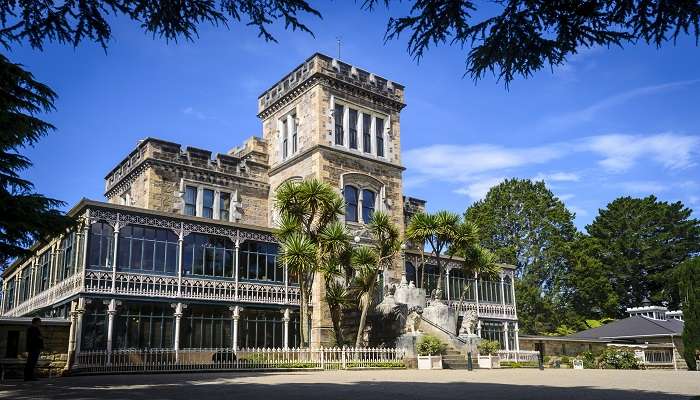
Image Source: Shutterstock
Interestingly, there is just one castle in New Zealand. It sits in the lap of the Otago Peninsula, amidst a stretch of mountainous land running parallel to the mainland. This is also a part of the natural Otago Harbour.
The castle was built in 1871 and has stood the test of time. The architectural theme is Gothic and features extensive gardens and a rich diversity of things to do. The castle is one of the most famous buildings in New Zealand and is open 365 days a year.
Location: On the ridge of the Otago Peninsula, Dunedin Things to do: Walk across the gardens and admire the architecture. Best time to visit: During the day
Must Read: Things to Do in New Zealand
2. The Sky Tower
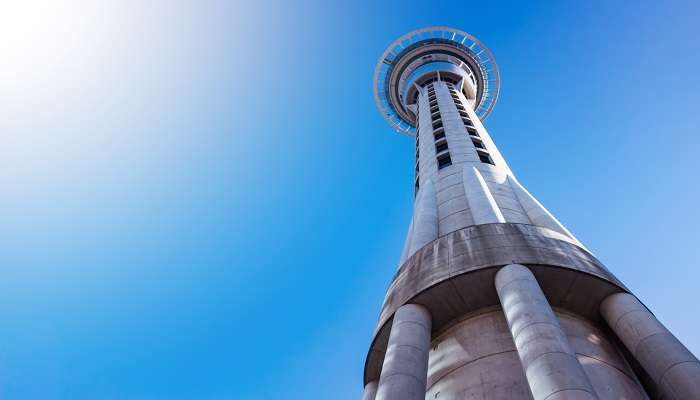
Being one of the most famous landmarks in New Zealand, Sky Tower is one of its kind in the entire Southern Hemisphere. It is the tallest in this part of the world, and the famous architect Gordon Moller oversaw the design. Being Auckland’s most notable landmark today, the Sky Tower is well-liked by travellers and thrill seekers. The tower also acts as a hub for the aerial transmission of all telecommunication signals. It stands tall at 328 metres, with an observation deck at 220 metres above sea level. Besides panoramic views, you can also enjoy world-class eateries inside the tower.
Location: At the corner of Victoria and Federal Streets, Auckland Things to do: Enjoy the views of New Zealand’s skyline. Best Time to Visit: During the evening
3. The Beehive and Parliament House
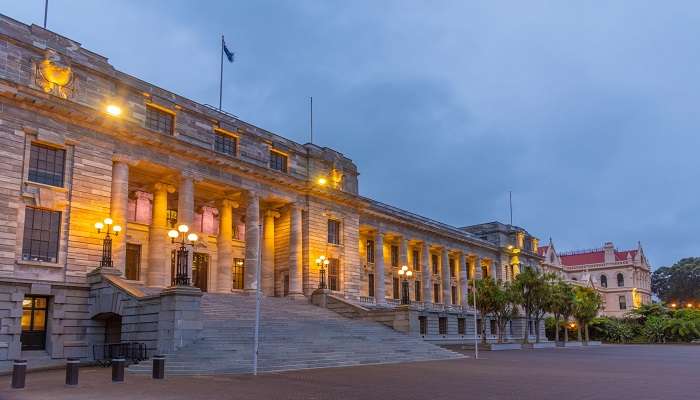
The Beehive is one of the most unusual parliament buildings you will see worldwide. The architecture features a distinctive layered structure, giving it a noticeable look worthy of inclusion in our list. The shape of the building is almost similar to the traditional woven beehive we see in the natural world. Beehive is home to the parliamentary Executive Wing. Located just nearby, the Parliament House was occupied in 1918. The Beehive was designed in 1964 by Sir Basil Spence. Being one of the most famous buildings in New Zealand, the building exhibits a unique cultural element, being a testament to both innovation and tradition.
Location: At the corner of Molesworth Street and Lambton Quay, Wellington Things to do: Roam around, look at, and explore the nearby buildings. Best time to visit: During the day
Suggested Read: Fun Things to Do in New Zealand
4. Arthur’s Pass
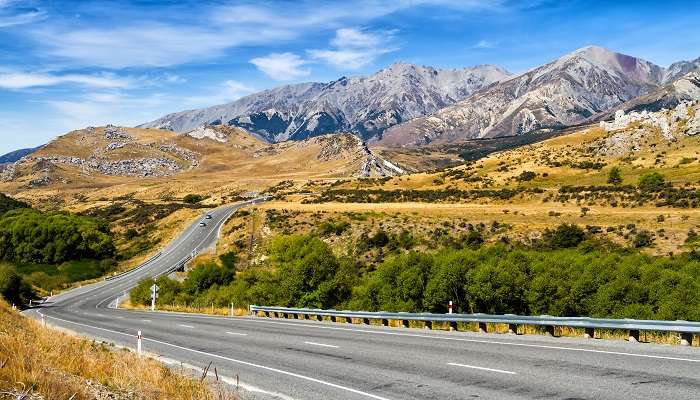
Exploring the stunning peaks of New Zealand is a memorable experience. But don’t forget the passes that take you there, around, and out of those outward landscapes. Arthur’s Pass is one of the major landmarks in New Zealand, giving you enthralling views of the Southern Alps spanning more than 300 miles.Built at around 2400 feet, the pass is a base for exploration into Arthur’s Pass National Park. You can either enjoy the views while driving or halt and admire the breathtaking scenes around you. Also, it is the highest mountain pass in the range, so you may buckle up for picturesque views that cannot be seen from anywhere else.
Location: Southern Alps of the South Island of New Zealand Things to do: Ride, take photos and explore. Best time to visit: Evening or at dawn
5. Hobbiton
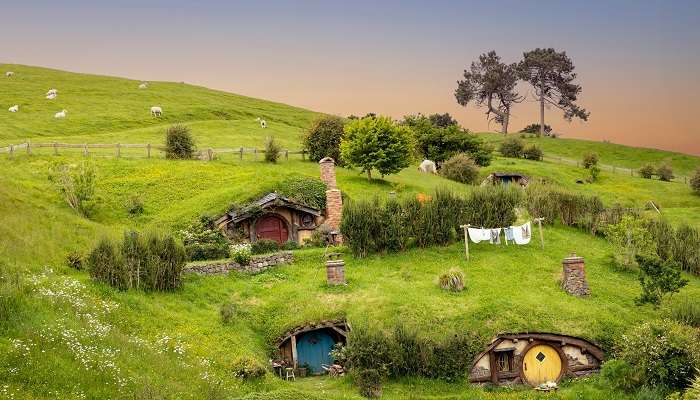
Ever wondered how J.R.R. Tolkien envisioned a magical fairyland for the hobbits? Do you ever wonder if the hobbit homes showcased by Peter Jackson in his movies are real or a set? Well, they are real. Hobbiton is an actual place and a landmark worth visiting in New Zealand.
The lush area is set among the rolling hills of an old 1250-acre Waikato Sheep Farm. The area has been converted into a tourist attraction, where you can get film set tours and walk around. One of the most pleasant historical landmarks in New Zealand, Hobbiton features gaily coloured wooden houses on the hillside, overlooking a huge lake and pine trees.
Location: 15 minutes from Matamata town centre, Waiko Things to do: Enjoy tours of the movie set, walk around, click insta-worthy photos. Best time to visit: During the day
Suggested Read: Tourist Destinations in New Zealand
6. Kawarau Bridge
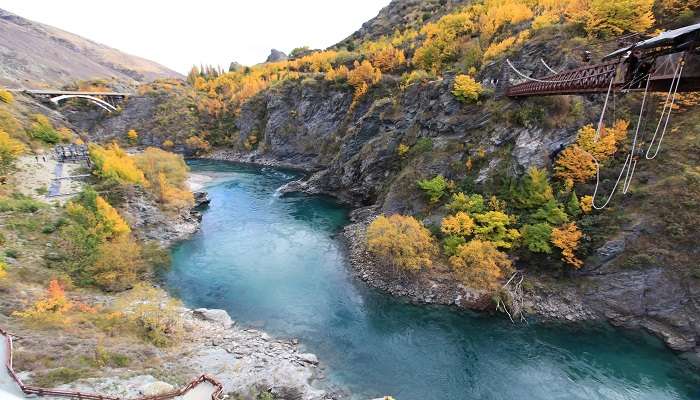
While New Zealand may seem pleasant to the eye, it does offer some adrenaline-fused activities that adventure seekers strive for. One such place to start is the historical suspension Kawarau Bridge in Queenstown, near Lake Wakatipu on the South Island.
The bridge is one of the most iconic historical landmarks in New Zealand. All sorts of daredevil adventures can be experienced here, ranging from bungy jumping to skydiving and much more. The bridge was originally built to offer access over the Kawarau River to the Otago Goldfields. In 1988, A.J. Hacked launched his first commercial jump here, and since then, this has become one of the most famous jump locations in the world.
Location: Over the Kawarau River in the Otago town of the South Island Things to do: Enjoy adventure activities, watch from the viewing platform, walk or cycle across the bridge. Best time to visit: During the morning hours
Further Read: New Zealand in Summer
As one can observe, New Zealand is not only blessed with natural wonders but a diverse array of landmarks as well. Hope you enjoyed reading this well-curated list of the famous landmarks in New Zealand. If you are already feeling the curiosity to travel to these iconic places, book a trip to New Zealand and make unforgettable memories.
For our editorial codes of conduct and copyright disclaimer, please click here .
Cover Image Source: Shutterstock
Frequently Asked Questions About Famous Landmarks in New Zealand
What’s famous in New Zealand?
New Zealand is known for its eternal mountain range, unique natural wonders, picturesque locations, and notable historical landmarks
How many days do I need to explore New Zealand?
New Zealand is a fairly small country. Hence, you would ideally need somewhere between 7 and 10 days to check out every major place and travel spot here
Is New Zealand a cheap place to visit?
It depends on the place or country you are comparing it with. Compared to Asian countries like Vietnam or Indonesia, New Zealand might be fairly expensive. However, if you compare it to the UK or Australia, it's somewhat cheaper.
What is the ideal time to visit New Zealand?
New Zealand offers pleasant and gloomy weather all year round. Hence, summers may be an ideal time if you wish to find respite from scorching heat.
What currency works in New Zealand?
The official currency of New Zealand is the New Zealand Dollar, written as NZ$ for short.
People Also Read:
Best Cities to Visit in New Zealand Place to Enjoy Paragliding in New Zealand Must Visit Churches in New Zealand
Recent Posts

Carefree Adventure At Places To Visit In Thailand With Friends

Places To Visit In Turkey With Family: Unveiling Diverse Family-Friendly Destinations

Rediscovering Legacy: Top 5 Heritage Sites In Maharashtra
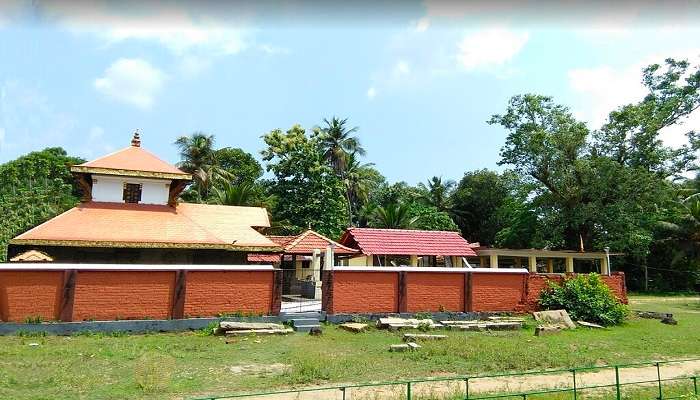
Experience Spiritual Calm At The Dakshinamurthy Temple
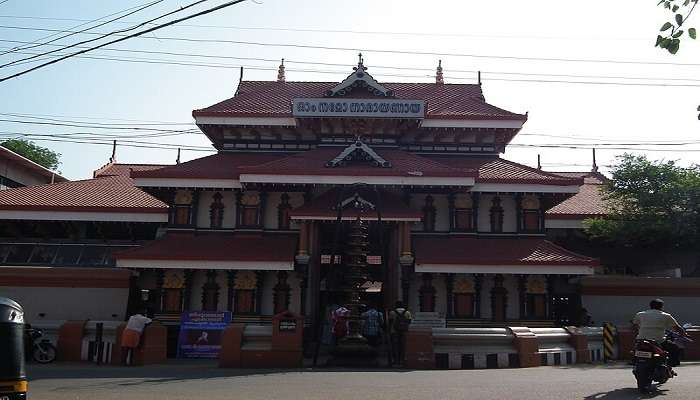
Thiruvambadi Temple: Everything You Need To Know About This Divine Gem
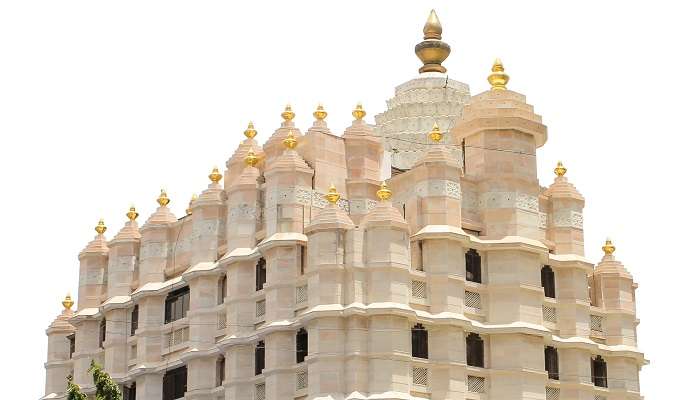
Discover The Ultimate Travel Guide To Siddhivinayak Mandir Mumbai!
Trending Blogs
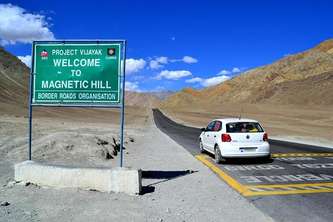
20 Mysterious Places In India To Visit In 2023 More Bizarre Than The Bermuda Triangle
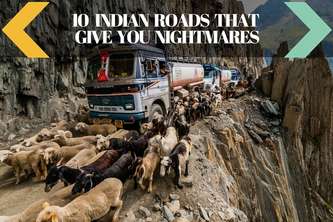
10 Scariest Roads In India That Are A Driver’s Nightmare
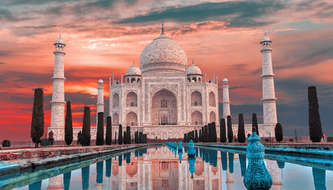
101 Places To Visit In India Before You Turn 30 in 2024

35 Exotic Places To Visit In December In India 2024 To Enjoy A Surreal Vacation

60 Best Honeymoon Destinations In India In 2024

95 Best Honeymoon Destinations In The World In 2023 For A Romantic Escape!
Best Places To Visit In India By Month
Best places to visit outside india by month.
- TravelTriangle
- International
- New Zealand »
- Tour Packages
- Honeymoon Packages
- Family Packages
- Budget Tour Packages
- Luxury Tour Packages
- Adventure Tour Packages
- Group Tour Packages
- Maldives Tour Packages
- Bali Tour Packages
- Dubai Tour Packages
- Singapore Tour Packages
- Thailand Tour Packages
- Europe Tour Packages
- Sri Lanka Tour Packages
- Tour Packages From Delhi
- Tour Packages From Mumbai
- Tour Packages From Bangalore
- Tour Packages From Chennai
- Tour Packages From Kolkata
- Tour Packages From Hyderabad
- Tour Packages From Ahmedabad
- Thailand Tourism
- Bali Tourism
- Singapore Tourism
- Maldives Tourism
- Mauritius Tourism
- Dubai Tourism
- Europe Tourism
- Hotels in Thailand
- Hotels in Maldives
- Hotels in Mauritius
- Hotels in Bali
- Hotels in Dubai
- Hotels in Singapore
- Hotels in Sri Lanka

10 Important New Zealand Travel Tips to Know Before You Go
N ew Zealand is epic, it’s beautiful, it’s exciting… and it’s a heck of a trip to plan on your own. You’re probably coming from the other side of the world and heading to a country that most people you know have never visited. That was certainly our experience.
We spent hours and hours researching everything we needed to know for our six week New Zealand trip (part of our family gap year) and mostly things went off without a hitch. But we certainly learned a lot along the way so I’ve put together these important New Zealand travel tips for you to read before you go to the Land of the Long White Cloud ( Aotearoa in Maori).
We’ll cover important topics like how to visit New Zealand on a budget, nuances of renting a car in New Zealand and driving in New Zealand, how to find the best places to stay in New Zealand and more. Ready to start planning?
First: some basic facts about New Zealand
- New Zealand is an island nation surrounded by the Pacific Ocean and the Tasman Sea, which separates it from Australia.
- It’s roughly the size of Colorado but with 15% fewer people.
- The local currency is the New Zealand Dollar, abbreviated NZD – check the current exchange rate .
- New Zealand uses the same three-prong outlet as Australia and China. For typical digital electronics, this dedicated New Zealand power adapter will work or you can buy a universal international power adapter . Leave the hair dryers at home though! They require a voltage step down so you might just want to borrow or buy one locally.
- Driving is on the left side of the road. The traffic in Auckland is horrendous and you’ll be jet lagged when you arrive, so take it slow!
- The Maori people have lived in New Zealand for about 700 years, while Captain James Cook arrived 250 years ago.
- Though the ratio isn’t as out-of-balance as it used to be, there are still roughly 6 sheep for every human resident of New Zealand.
No matter how much time you visit, it won’t be enough
Road to Mount Cook, New Zealand
We spent six weeks traveling around the North and South Islands of New Zealand and still feel like we missed so many amazing places!
One of the best things about visiting New Zealand is that there’s a huge range of activities to pursue – hiking to glaciers, relaxing on beaches, snorkeling with the world’s tiniest dolphins, visiting Hobbiton and so much more. But the reality is that unless you move to New Zealand or visit for many months, there’s no way you’ll be able to see it all… or even close.
How long should you stay in New Zealand? I’d say that two weeks is enough to explore one of the two main islands if you’re planning a New Zealand road trip. For visitors who are short on time, the one place I’d recommend shorting is Auckland – it’s a sprawling metropolis but not nearly as unique as basically everything else in New Zealand. It’s a good place to recover from your jet lag and spend one or two days.
Since the drive time from Auckland to Wellington is around 9 hours (in ideal conditions), you could probably get by with spending 10 days on the North Island if you blazed through… but where’s the fun in that? The South Island takes an absolute minimum of 12-13 hours to drive and has so many nooks and crannies that you won’t want to miss, which add to that drive time.
Check out some of these books to help you prioritize the best things to do in New Zealand:
- Lonely Planet New Zealand – a good general overview guidebook to help you plan your route and most important stops
- NZ Frenzy North Island and NZ Frenzy South Island – these are specialized New Zealand outdoor guides written by a local expert
- New Zealand: Travel for kids – if you’re visiting New Zealand with kids, this book provides a great introduction to the history, geography, culture and wildlife
Everything is farther apart than you think
Ok, so those drive times above? Those are the estimates from Google Maps. They assume that you aren’t traveling in New Zealand winter (northern hemisphere summer break), that you don’t need to stop for a herd of sheep, that no one is car sick going over the hill between Tasman and Nelson and that you don’t want to stop for the seventy third photo break.
Yes, there are even your garden variety slow traffic pockets if you’re visiting during peak season.
More importantly, once you get off the main highways there are plenty of spots where the roads are just slow. In some places they’re not as modern and kept up as you might hope. In other places, they’re narrow and windy and you’re just hoping not to drive off the side of a mountain.
Watch for one lane bridges, especially on the South Island! A sign with a blue outline means you have the right of way, a sign with a red outline means that oncoming cars have the right of way. No matter which sign you see, STOP and observe before you try to cross!
You may want to bring this durable map with you to help with navigation in case you end up in an area with spotty cell service – and there are many.
New Zealand and Australia are not that close to each other
How long is the flight from New Zealand to Australia? It’s about 4 hours from Auckland to Sydney. Compared to the 13 hour haul from the west coast of the US, that’s not too bad.
But when you account for arriving to the airport several hours early since it’s an international flight, dealing with traffic in Auckland or high winds in Queenstown and then the lengthy arrivals process in Sydney… it’s easy to see how you can lose an entire day of your trip.
And even more so than New Zealand, it’s extremely hard to do Australia justice in an abbreviated visit. We were there for almost two months and still had more to explore! If you think you’ll never make it back to the region and want to combine the two countries, start planning your Australia itinerary here .
We hear people say all the time that they’re planning a 10 day visit split between the two countries and all we can say is to please reconsider.
You need proof of onward travel
This was a new one for us. New Zealand requires proof of onward travel. That means you can’t enter the country as a tourist without demonstrating that you plan to leave within 90 days. If you’re a typical traveler on a round-trip ticket, you probably only need to complete an Electronic Travel Authority , which is done online and can be ready in a few minutes or a few days. (This only started in August 2019 so we haven’t done it ourselves.)
If you plan to leave New Zealand by way of another country, make sure you purchase that outbound ticket before you try to board your flight to New Zealand. Yay, we did that right!
Except that we kind of didn’t. If you’re going to Australia next, read this . Australia requires many visitors to apply for their Electronic Travel Authority in the Australian ETA app before they arrive – including Americans. I know, we’re spoiled and don’t usually have to worry about this stuff! Your onward ticket to Australia doesn’t count unless you have already applied for your ETA.
Lucky the ETA is fast – our approvals only took about 5 minutes. They cost $20 AUD per person as of this writing. But wow was it a stressful experience to deal with at the Internet cafe in the Buenos Aires airport when we arrived for our flight to Auckland. We didn’t plan to visit Australia until six weeks later so we hadn’t thought to get our ETA so early, but it is required.
If you’re going elsewhere on a one-way ticket after New Zealand, be sure to check that country’s visa requirements before you go to the airport heading for New Zealand.
They’re really serious about not bringing in certain foods
When you arrive at airports in New Zealand, there are numerous signs on the way to customs alerting you to which foods you can’t bring in with you . Agriculture is such an important part of the local economy that there’s genuine concern about pests or diseases from other countries sneaking in.
You can’t bring any produce, meat, fish or honey. It was the last one that nearly got us in major trouble. We’d had an amazing visit to the bee farm in Boquete, Panama and picked up some lovely (expensive) creamed honey while there. What we didn’t realize was that there was still one more neatly wrapped jar hanging out in the bottom of one of our huge travel backpacks underneath a bunch of other stuff.
Not remembering that we had it, we had not declared the honey on our entry card. As we went through one set of signs after another, we discarded anything we thought might be problematic. But at the last station before exiting the airport, the backpack was scanned and a serious agent asked what was in the jar. What jar???
Sadly, our delicious honey ended up in the bin. Fortunately, she took pity on us and didn’t fine us! But many visitors are fined every year for bringing illicit foods into New Zealand! The fines can be hundreds of dollars and that’s a really crummy way to start your vacation. Consider yourself warned.
It’s really expensive
New Zealand was the first place we ever felt “expensive fatigue”, and that’s saying a lot from people who lived in LA for decades. Food is expensive, gas is expensive, Airbnbs are expensive.
The ways we managed to save money during our time in New Zealand probably deserve an entire article of their own. For now, here are a few helpful ways to visit New Zealand on a budget:
- Buy your groceries at PAKn’SAVE. It’s more basic than some of the other options, but much cheaper. The produce in New Zealand is gorgeous , even at the least expensive grocery stores. The best thing we bought during our time in New Zealand was a hard-sided cooler and a set of ice packs. When you’re packing up and moving every 3-4 days, you don’t want to be throwing away those super expensive groceries you just bought!
- For non-grocery items, you can find reasonable prices at K-Mart and The Warehouse. Neither will be as cheap as buying things in the US, as Kiwis earn a higher minimum wage than Americans.
- Definitely take advantage of the best free things to do in New Zealand: beaches, hikes, scenic drives. Honestly these were many of our favorite experiences and they didn’t cost a penny. We always made sure to pack the cooler with a picnic lunch, snacks and plenty of extra water so that we didn’t have to eat out unexpectedly.
- Book your rental car early, and then check back to see if the price has gone down as your trip gets closer. I think I must have checked nearly every month! I did end up re-booking once when the price dropped. I love booking with RentalCars.com since they make it so easy to compare rental car companies – and to cancel when you find a better rate. Make sure to check if there’s a one-way fee on your car rental. It’s also worth checking Apex if you’re on a really tight budget, but know that the cars may be very old and have high mileage – we didn’t feel comfortable with those conditions for as much driving as we planned to do out in the countryside and over big mountains.
- If you plan to do a New Zealand road trip on both islands and then fly the return leg domestically, consider flipping the order and starting in Queenstown. You may find the rental car to be cheaper and staying flexible might give you better availability for accommodations in the busiest season.
You may have to get a new rental car when you switch islands
This one was a surprise to me! We got a great deal on our rental car with Avis through RentalCars.com and booked it for our full six week journey through both the North and South Islands. We planned to pick it up at the Auckland airport and drop it off at the Queenstown airport, taking the ferry in between.
When we picked up our car, weary and bleary-eyed after an overnight flight from Argentina (which skirted the edge of Antarctica!!!!) we were told that we could only take our car as far as the ferry terminal in Wellington. The good news is that it’s not a big deal as long as you know what to expect.
The ferry terminal is structured sort of like a tiny airport. There are rental car buildings adjacent to return your car. If you have a lot of luggage (or a heavy cooler full of food), you may want to drop if off directly at the ferry building with the rest of your party. It’s not a long walk, but can be annoying if you have lots to carry – like, let’s say, an entire family’s worth of stuff for a year plus a newly purchased cooler.
Once you get inside the ferry terminal you’ll check your luggage just like on a flight! This was a little surprising but worked well. The staff even taped our cooler shut to keep our pricey groceries safe. We each just brought a carry-on backpack with us to keep our valuables safe and handle our on-board needs.
The Interislander ferry ride itself is a fantastic experience and probably deserves its own article! Suffice it to say that the ride is pleasant, pretty and generally uneventful (though seas can be rough, so bring these if you get seasick). You’ll arrive in Picton about 3.5 hours later.
As with Wellington, the Picton ferry terminal resembles a small airport terminal. But it’s small and lots of people like you had to drop off their rental cars in Wellington! And that can mean only one thing: LONG LINES.
Take my advice: send the driver from your group to the rental car desk immediately to get in line for car pick up. Getting the new car wasn’t difficult but it took close to an hour in total. Everyone else can stay inside at baggage claim to collect your luggage and hang out. Why inside? Because Picton has a huge sand fly population! In two minutes flat my feet were absolutely covered in extremely itchy bites. They won’t kill you, but they’ll sure make you miserable.
The long and short is that swapping cars when you move islands is very common and not a terrible inconvenience. It just takes time, so plan accordingly. Be sure to check your car rental company’s policy on moving cars between the islands.
Some of the smaller local car rental companies like Apex do permit you to take your rental car across the Cook Strait. What’s the catch? Depending on the length of your car rental, you may need to food the bill for your car’s ticket on the ferry. That can add more than $200 to your costs in peak season, so be prepared and factor that into your price comparison. If you’re taking a very long car rental, your company may cover the cost of the ferry.
Book your accommodations early if you plan to visit during typical vacation periods
Guys, this is one that I can’t stress enough. New Zealand does not have an adequate supply of places to stay in the most popular areas during busy season. We visited for December and most of January – it’s the best time of year in terms of weather, but also school holidays in New Zealand and Australia.
We booked most of our accommodations in New Zealand in June and July, and we still struggled in some places! We’ve never booked anything that far in advance, but I’m glad I relented and let Ronnie lock things in well in advance. We traveled much of the country with another family we met on our first day in Auckland, but at a certain point they couldn’t visit areas they wanted to see for lack of hotel rooms or apartments at any sort of reasonable price.
What are the best places to book your stays in New Zealand? We stayed in twelve different places in New Zealand and I swear we booked them all on different websites! Here are the best options we found:
- BookABach – This is now part of the HomeAway family, but distinctively Kiwi. You’ll find everything from luxury condos to really simple cottages. Since many owners expect primarily domestic tourists, confirm that they’ll offer sheets and towels… because plenty of them expect you to bring your own.
- Booking – Just like anywhere else, Booking offers a great interface for scouting hotels, apartments, hostels and more. We love booking thanks to the generous cancellation policies, easy filtering and easy access to so many real-world reviews. We absolutely love this lodge but it books up extremely early. The rooms are simple but cozy and the common room is the perfect place to meet other travelers while you cook dinner and then enjoy some stargazing on a clear night!
- VRBO – Overall we had a good experience with vacation rentals in New Zealand. These were some of the best places we booked and there were often wonderful personal touches.
Use the interactive map to find vacation rentals and hotels in New Zealand
You can experience everything from rainforests to alpine zones
Tropical forest near Hahei, Coromandel Peninsula, New Zealand
Is New Zealand a good place to visit? I’d say so, because in many ways it’s an “everything destination”.
Many visitors choose New Zealand specifically for its stunning views. Of course the most iconic scenery is of the mountains on the west side of the South Island – Mount Cook, Fox Glacier, the shear cliffs along Milford Sound. But when you head to the country’s opposite corner you’ll find a lush subtropical rainforest!
It was a little surprising to wear both winter clothes and swimsuits on the same trip, but that’s what you get in New Zealand! Pack appropriately.
But also come prepared mentally that New Zealand is so much more than what you expect! Look beyond the mountain-filled post cards and recognize that each part of the country is special in different ways, even if they aren’t all as dramatic as what you expect.
New Zealand is getting much more diverse
In the 2001 census, 80% of New Zealand’s population was ethnically European ; by 2018, that had dropped to just 70%. That’s a staggering change in less than two decades. Most of that transition has been due to an influx of Asian immigrants.
But you might only notice that diversity in the greater Auckland area and, to a lesser degree, elsewhere on the North Island. The country’s 16% Maori population is almost entirely on the North Island (86%). The country’s Asian population is around 15% now, but almost entirely focused in greater Auckland.
What does the Auckland region look like? These days, it’s less than half European in origin. You’ll find fantastic food in Auckland as a result. Wellington, New Zealand’s capital city, is less ethnically diverse than Auckland but still about 1/4 of residents identify as non-European.
On the South Island… well, many areas are over 90% European . It’s not just an aesthetic difference, but you may notice resulting cultural differences too.
New Zealand has a lot more than two islands
One of the most interesting things to know about New Zealand, which most people don’t realize, is that it contains more than 600 islands! However, the vast majority of these are unpopulated. The North Island is home to over 75% of the country’s population.
There are numerous islands in the Hauraki Gulf including well-known Waiheke Island (population almost 10,000). Waiheke makes a wonderful day trip from Auckland and is known for its beautiful scenery and delicious wine.
New Zealand’s third largest island is Stewart Island off the southern tip of the South Island. 85% of Stewart Island is protected as a National Park, and exploring the bush is one of the main things to do on Stewart Island – after all, there are only 400 people living there!
Hopefully this guide has left you more excited and more prepared for your journey to New Zealand! Writing this has certainly made me hunger for a return visit to explore more of the amazing experiences New Zealand has to offer.
amzn_assoc_placement = "adunit0";
amzn_assoc_search_bar = "true";
amzn_assoc_tracking_id = "thefamilyvoya-20";
amzn_assoc_ad_mode = "manual";
amzn_assoc_ad_type = "smart";
amzn_assoc_marketplace = "amazon";
amzn_assoc_region = "US";
amzn_assoc_title = "Best New Zealand books to read before your trip";
amzn_assoc_linkid = "20084e55b0fabaf16749ec89af3a8c84";
amzn_assoc_asins = "1786570793,0473415003,1921336129,1465439625";
Still planning? Pin this article for later!
Planning your trip to New Zealand
Are you getting ready for an epic trip to New Zealand? Don’t miss these articles to help you plan:
- 2 Weeks in New Zealand Itinerary: 14 Days of Adventure, Scenery and Culture
- A Local’s Guide to 2 Days in Queenstown
- Bike the Otago Central Rail Trail
- The best things to do in Tasman, New Zealand for outdoor lovers
- Beautiful pictures of New Zealand’s North Island beaches
- Up close with Maori culture at Tamaki Maori Village
- Glass Bottom Boat Whitianga: Exploring the beauty of the Coromandel Peninsula, New Zealand
The post 10 Important New Zealand Travel Tips to Know Before You Go appeared first on The Family Voyage .
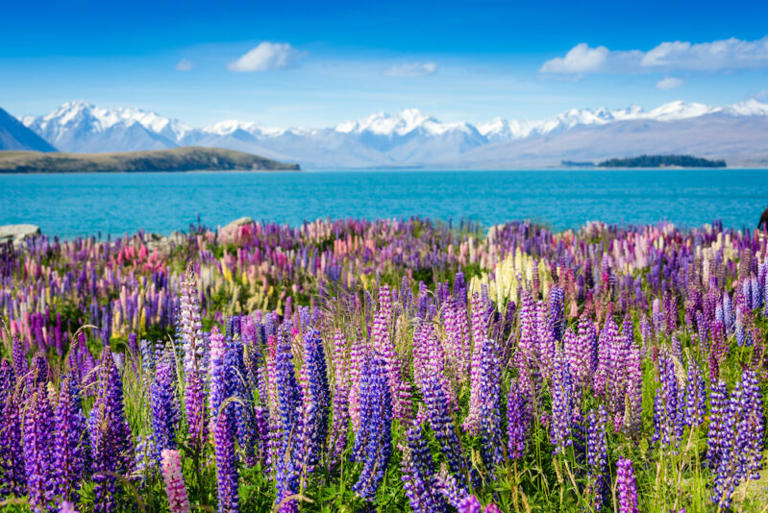

8 Best Places to Au Pair This Year

Hannah’s love for international travel began in college, when she studied abroad four times: in I...
- Travel Inspiration
- Top Destinations
- button]:border-none [&>button]:bg-white [&>button]:hover:cursor-pointer [&>button]:hover:text-cyan-400"> button]:hover:text-cyan-400 [&>button]:bg-white hover:cursor-pointer" height="1em" width="1em" xmlns="http://www.w3.org/2000/svg">
Want to get paid to live abroad? Becoming an au pair is the perfect way to experience life in another country, gain work experience, and have the adventure of a lifetime!
As an au pair, you’ll be more than just a tourist in your host country. You’ll have the opportunity to truly immerse yourself in the local culture and language and create bonds and memories to last a lifetime.
In this guide, we’ve put together a list of the best places to au pair this year. From France to China to the Land Down Under, there are exciting au pair opportunities worldwide. So, if you’re ready to begin your adventure abroad , read on to learn more about the best countries to au pair!
Do au pairs need a work visa?
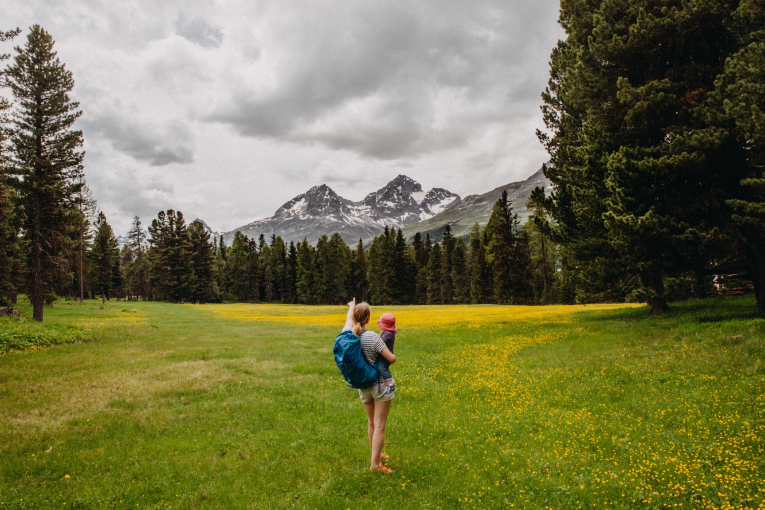
Work as an au pair and you’ll get to see the world while living like a local.
Before you start your au pair journey, one of the biggest questions you might have is, do au pairs need a work visa ? Most countries require a work visa for au pairs, but requirements will vary based on your nationality and the country you want to work in.
When applying for an au pair visa, you’ll need to supply a valid passport , an invitation letter from your host family or organization, a signed au pair contract, and a criminal background check. Exact requirements will vary by country and nationality, so be sure to research requirements once you decide where you’d like to au pair.
There’s even a chance you may not need a work visa at all. For example, if you’re an EU citizen, you can become an au pair anywhere in the EU without a work visa!
Get matched with 5 au pair gap year programs right now
8 best places to au pair.
Before you pack your bags , your first task is to decide where you want to au pair. With so many amazing opportunities worldwide, it can take time to decide. To make it easier, we’ve put together a list of some of the best places in the world to au pair!
Best countries to au pair in Europe
Europe is full of fantastic au pair opportunities. With cheap local flights and abundant rail options, the travel opportunities within Europe are endless, making it one of the best places in the world to au pair. As an au pair in Europe , you can spend your free time traveling, exploring, and making new memories!
France has so much to offer . From the bustling streets of Paris to the lavender fields of Provence and the beaches of the French Riviera, there are countless opportunities for exploration.
As an au pair in France, you’ll be immersed in the French language and culture and, of course, delicious French cuisine! How does enjoying a coffee and croissant at a Parisian café sound? Or a weekend wine tasting in Bordeaux?
Working as an au pair in France, you’ll be more than just a tourist. You’ll see France through the eyes of your host family and experience the country like a local.
- Recommended program: Au Pair France – Explore Europe as an Au Pair
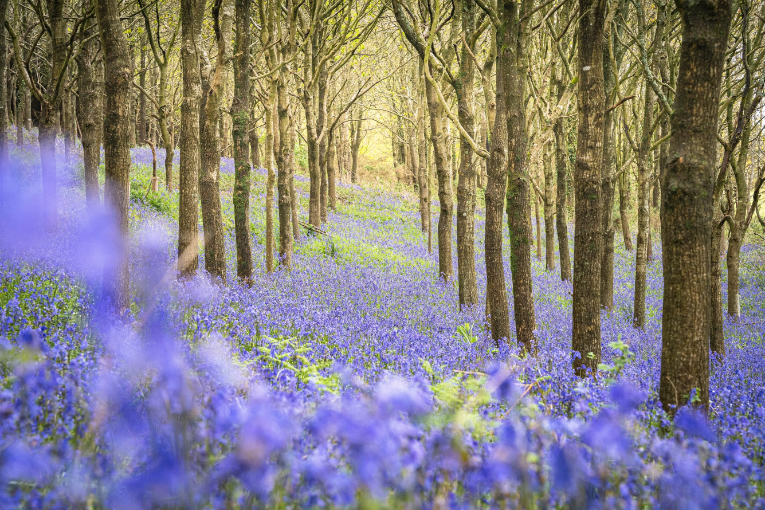
Looking for a gorgeous backdrop to your au pair gig? Look no further.
Becoming an au pair in England is the perfect option for anyone wanting to improve their English language skills. You’ll live with an English host family and be immersed in the English language.
Even if language learning is not your goal, England is an excellent choice for an au pair experience. Your host family will provide meals and accommodation , so you can spend your money traveling and exploring Europe. Becoming an au pair in England is an invaluable way to improve your English language, learn about English culture, and travel through Europe!
- Recommended program: Au Pair in the UK – Become Part of the Family!
Unsurprisingly, Italy is one of the world’s most popular travel destinations. The country is world-famous for its art, architecture, fashion, and of course its food !
As an au pair, you’ll have the opportunity to experience Italy like a local. And of course, you’ll improve your Italian language skills too.
Being able to explore Italy in your free time is the best part. Spend a weekend exploring Tuscany’s vineyards, the south’s beautiful beaches, or the historic streets of Rome. Choose Italy for your au pair experience and live la dolce vita !
- Recommended program: Au Pair Italy – Complete Italian Cultural Experience
Best countries to au pair in Asia
Becoming an au pair in Asia is the perfect way to experience a new culture, learn new language skills , and create memories to last a lifetime! Living and working in Asia will build your intercultural communication skills and look great on any resume , making it one of the best places to au pair.
1. South Korea
South Korea is an amazing blend of tradition and modernity. Home to K-pop and towering modern skyscrapers, the country is also famous for its traditional cuisine, jimjilbang (traditional bath houses), and beautiful Buddhist temples.
As an au pair in South Korea, you’ll experience everyday life with a Korean family. Practice your Korean language skills, experience local cuisine, and spend your free time traveling throughout this beautiful country . Becoming an au pair in South Korea is an excellent choice for anyone looking for a unique and adventurous place to live abroad!
- Recommended program: Gap Year Programs Around the World
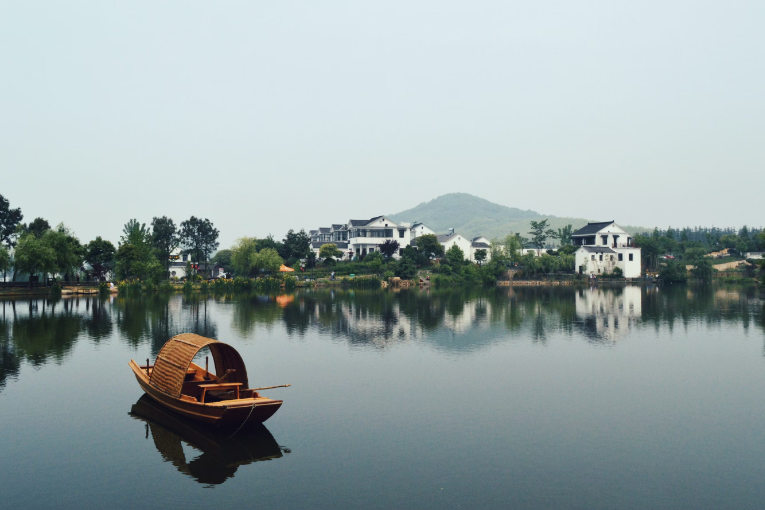
The cultural exchange makes China one of the best places to au pair.
English-speaking au pairs are highly sought after in China, so you’ll have no trouble finding the perfect placement. The country is home to everything from the skyscrapers of Shanghai to the ancient Terracotta Warriors of Xi’an and the stunning rice terraces of Yunnan Province, giving you countless places to explore in your free time.
As an au pair in China, you’ll be immersed in the Chinese language and culture, an experience that will look great on any resume . Practice your Chinese language, experience local cuisine, and spend your free time traveling and getting to know the Middle Kingdom!
- Recommended program: Wanderlust Culture Home-stay English Teaching Program
Best countries to au pair elsewhere
There are endless opportunities to work as an au pair all over the world. From North America to the Land Down Under, here are a few of the best countries to au pair outside Europe and Asia.
1. Australia
Australia is home to beautiful multicultural cities and incredibly diverse landscapes, from the arid Outback to the subtropical beaches of the Sunshine Coast. If you’re a native English speaker, working as an au pair in Australia will be a breeze!
Australia is a great choice if you’re looking to improve your English language skills, too. Working as an au pair in Australia will allow you to experience total English-language immersion, offering an invaluable language-learning environment. If you’re ready for the au pair experience of a lifetime, the home of koala bears, kangaroos, and Vegemite awaits you!
- Recommended program: Melbourne Gap Year: Paid Work Opportunities in Australia
Canada is a safe and friendly country , making it one of the best countries to au pair. Canada is a bilingual country, so depending on where in the country you work, you’ll have great opportunities to practice your English or French.
There’s also so much for outdoor enthusiasts to do. Ski resorts abound, and destinations like Banff National Park in Alberta draw visitors from all over the world.
If cities are more your thing, diverse international cities like Montreal, Toronto, or Vancouver are exciting places to live or visit. From the wilderness to the big cities, Canada has something for everyone !
- Recommended program: Working Holiday in Canada | The Ultimate Gap Year
3. New Zealand
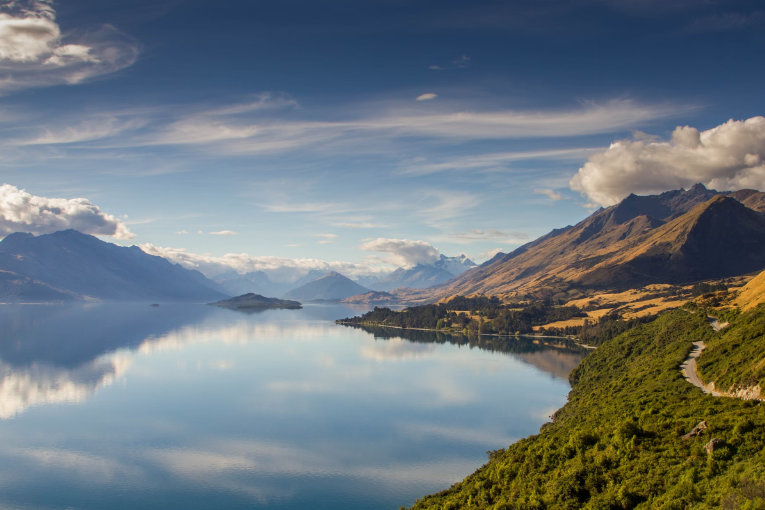
If you love the outdoors, you can’t beat New Zealand as an au pair destination.
With its stunning landscapes, New Zealand is a wonderland for any outdoor enthusiast. Snow-capped mountains, lush forests, bubbling geothermal pools, and glassy fjords are just a few examples of what makes New Zealand one of the most beautiful countries to work as an au pair.
New Zealand is also the perfect place to build your English language skills as you immerse yourself in everyday life with native English speakers. In your free time, explore the great outdoors, learn about traditional Māori culture, or explore a vibrant city like Auckland. Its diverse landscapes and unique culture make the Land of the Long White Cloud, as it is known in the Māori language, one of the best places in the world to au pair.
- Recommended program: Working Holiday in New Zealand – Your New Home in the South
Explore ALL au pair programs on GoAbroad
Make money and explore the world in a meaningful way as an au pair.

You’re in for a meaningful adventure when you work as an au pair abroad.
Now, you’re ready to start your adventure abroad as an au pair. By becoming an au pair , you can experience another culture , master a new language , and make lasting connections while living abroad. All that’s left to do is decide where you want to go , apply for your au pair visa, and get ready for the experience of a lifetime!
Compare Au Pair Programs Side-by-Side with MyGoAbroad

Explore Gap Year Programs on GoAbroad.com
Related Articles
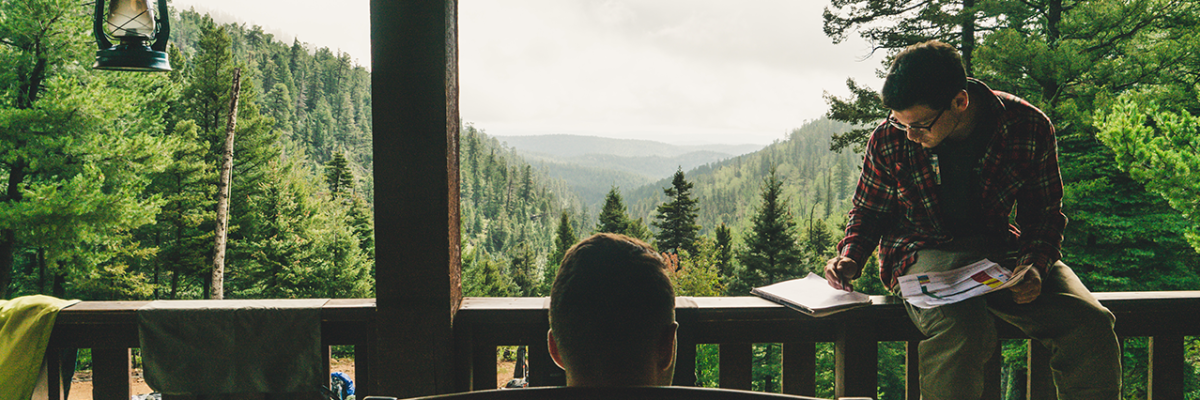
By Erin Hultgren | 1 hour ago
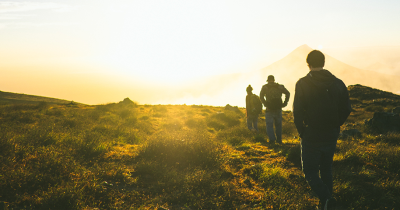
By Mariel Tavakoli | 2 hours ago

By Kendall Dick | 22 hours ago

By Katherine Gu | October 19, 2023
Popular Searches
Recommended programs.

Wanderlust Exchange

LoPair Culture Exchange

Star Exchange
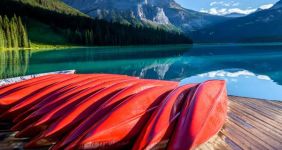
Global Work & Travel
Top Gap Year Providers
Popular opportunities to check out
World’s #1 Volunteer Programs. 40+ Countries from $20/day!
Seamester study abroad and gap year voyages, semester at sea study abroad to morocco & 9 more countries, take a gap year in south africa. reserve your place now, dream destinations infused with vibrant culture & untamed nature, #1 gap year in 2024 - over 100 animal welfare programs worldwide, welcome to the african impact family., get tefl certified & explore the world as a paid english teacher, join our impactful gap year programs in africa, costa rica & more, hawaii / nz / australia semesters + internships in 22 countries, customized gap year programs in costa rica, guatemala, peru, for travelers, travel resources, for partners.

© Copyright 1998 - 2024 GoAbroad.com ®
- Study Abroad
- Volunteer Abroad
- Intern Abroad
- Teach Abroad
- TEFL Courses
- Degrees Abroad
- High School Abroad
- Language Schools
- Adventure Travel
- Jobs Abroad
- Online Study Abroad
- Online Volunteer Programs
- Online Internships
- Online Language Courses
- Online Teaching Jobs
- Online Jobs
- Online TEFL Courses
- Online Degree Programs
Money blog: A third of people make this mistake when booking their holiday - and how to avoid it
A third of travellers are making the same mistake when going on holiday, figures show. Read about this and all the latest consumer and personal finance news in the Money blog - and leave a comment or your money problem in the box below.
Thursday 16 May 2024 10:30, UK
- Almost a third of travellers make this insurance mistake - here's what you need to know
- How much the price of packed lunches has soared - and the cheapest supermarkets to buy a healthy one
- Major firms release financial updates
- UK economy in safe hands 'whoever wins' election, top bank chief tells Sky News
Essential reads
- How much do buskers actually make - and what's it like?
- The best bank accounts for your kids
- Basically... What is PIP - and what could government changes mean?
- How to make sure your car passes its MOT
- Cheap Eats: Michelin-star chef reveals his top steals in London - including an unbeatable sub sandwich
- Money Problem: My workplace wants to pay us by the minute - what can I do?
- Best of the Money blog - an archive
Ask a question or make a comment
Tesco has recalled its sandwich pickle over fears it may contain glass.
The supermarket has pulled its 295g jars of Tesco Sandwich Pickle with the batch code 3254 and best before date of 11 September 2025 due to the concerns of glass traces.
The Food Standards Agency has said on its website: "This product may contain pieces of glass which makes it unsafe to eat."
Last year, the supermarket chain had to recall pastry products, including sausage rolls and steak and ale pies, over fears they contained pieces of metal and plastic.
A Tesco spokesperson told Sky News: "We've been made aware that a specific date/batch code of Tesco Sandwich Pickle may contain small pieces of glass. Therefore, this product could pose a safety risk if consumed.
"Please do not consume this product and instead return any affected product to store where a full refund will be given. No receipt is required.
"Tesco apologises to our customers for any inconvenience caused."
By Ed Clowes, news reporter
The FTSE 100 has remained stable out of the gate this morning after hitting a record high on Wednesday as better-than-expected inflation data in the US raised hopes of an interest rate cut in September.
It's been a busy start to the day with financial updates from BT Group, Premier Foods, Sage Group, and easyJet.
We'll start with easyJet, after the airline announced that its chief executive officer, Johan Lundgren, would step down in January 2025.
Mr Lundgren, who has served as CEO since 2017, will be replaced by the carrier's finance boss Kenton Jarvis.
In a financial update on its performance throughout the first half of the year, easyJet reported slightly higher revenues than anticipated, while cutting its losses compared to the same period last year.
The airline's share price fell by 6% in early trading this morning.
Elsewhere, telecoms giant BT said it had completed a £3bn cost-cutting programme ahead of schedule, and announced a further £3bn in planned savings by 2029.
The company told Sky News that the planned reductions in spending would not lead to more job losses, after BT announced last year that it would eliminate 55,000 roles.
Incoming boss Allison Kirkby said she wanted the business to prioritise the UK, with some analysts expecting BT to look at the futures of its Italian, Irish, and American divisions.
And last but not least, one of Europe's largest sellers of Rolex watches has said that sales in the UK are still down because some tourists don't want to buy here "due to the lack of VAT free shopping".
Nice for some.
The price of a healthy packed lunch has soared by around 45%, according to new research.
A lunch of wholemeal bread and fruit is more expensive for parents to put together than less nutritious versions with chocolate spread and crisps, The Food Foundation charity has found.
Unhealthy lunches for the research were made up of white bread with chocolate spread instead of wholemeal with cheese, flavoured yoghurt rather than a plain, unsweetened version and snacks such as crisps as opposed to the four portions of fruit and vegetables incorporated into the healthy lunch.
And when it came to the cheapest supermarket to buy a healthy packed lunch, Tesco topped the list with a weekly cost of £8.56 as of this month.
Morrisons was the most expensive retailer, with the price of a healthy packed lunch per week coming in at £11.72, although this was down slightly from £11.80 in October.
The equivalent cost at Sainsbury's was £10.47, Aldi was £10.08 and Asda was £9.18.
Research also showed the largest price rise in recent months was at Sainsbury's, where customers have to spend 9% more than they did at the start of the academic year in September (£9.61) for the same packed lunch.
Shona Goudie, policy and advocacy manager at The Food Foundation, said, the government's stringent eligibility criteria to qualify for free school meals was "leaving hundreds of thousands of children" who are living in poverty "at risk of malnutrition".
"No one should be priced out of being able to provide healthy food for their children and retailers need to do more to support families to afford the food they need," she said.
By Bhvishya Patel , Money team
We spoke to three buskers to find out what it's like performing on the street in the UK.
Amir, 29, came to UK from Pakistan with passion for music
Amir Hashmi moved to the UK in 2022 to study, said he began busking in central London 10 months ago because "music was his passion".
"In Pakistan there are many problems so I decided to leave and move to London. I feel I can do better in London than my country," he said.
He said busking was now his primary income but at times he did jobs at warehouses to get by.
"I never started this for money, I started because it is my passion but now this is my main job as well," he said.
Amir, who often performs in the capital's Piccadilly Circus or along Oxford Street, said often he returned home with just £10-15 in his pocket after a day's busking.
He said: "Many times I sleep without food and sometimes I sleep on the floor of the road when I have no shelter.
"I don't have my own place to live but I have friends who often let me stay with them. They don't charge me any rent - they look after me.
"Sometimes I do private shows for income but it's very hard because the cost of living is increasing. If I go somewhere then most of the time I prefer to walk. I walk with my speakers and carry my gear."
Despite his financial struggles, Amir said he wanted to continue performing on the street as his "goal was to make people happy".
He said: "With busking, there is no stage and you can just start performing. Whenever I am performing, I connect with the people who have come to listen. If I feel people are not enjoying it, I change the song and try and make them happy."
Earlier this year, Amir recorded a song with Neha Nazneen Shakil, a Malayalam actress from India, who approached the singer three months ago in Oxford Street.
"I wrote that song 12 years ago and after all these years my song has been recorded now in London," he added.
Jade, 24, quit retail to busk
Jade Thornton, from Amersham, started busking in 2017 with a friend after leaving college at the age of 17 and quickly realised it was something she enjoyed doing and could make a living from.
She began doing it full-time at the end of 2018 but when the pandemic hit she described becoming "unemployed overnight" and having to take up retail jobs to support herself.
"I chose not to go to university - I just thought it wasn't for me so I went straight into some part-time retail jobs," she said.
"I take my cap off to anyone who does retail - it is one of the most gruelling jobs. People who do retail don't get nearly as much respect as they deserve.
"Some of the customers I was facing were not that kind and I thought this is making me miserable, so I just thought 'if I don't leave now then when?'"
As the global economy slowly began to recover, she decided to leave retail and pursue music full-time in 2022.
"It is hard to switch off - I do busking but I am constantly messaging clients, writing set lists and learning songs," she said.
When it came to finances, Jade said there was no average to how much she could earn but it could fluctuate from £15-100 day-to-day depending on a number of factors.
"It relies on the time of month, whether the sun is out, if people have been paid, if Christmas is on the way or if Christmas has just passed," she explained.
The musician said she did struggle initially when she began busking but her parents were always supportive.
She said: "You obviously get a few questions from people asking 'are you sure you want to quit your job and sing on the street?'
"I lived at home for a long time and I'm grateful my parents could support me in that way because I know not everyone has that opportunity."
While performing outdoors is now Jade's full-time job, she said some months were more difficult to make money than others.
"If I'm being brutally honest in months like January and February it would be super difficult. This year I had enough gigs in December to cover me for January," she said.
"Last year from June-July and December I did not have to go busking because I got so many gigs through busking. I'm part of a lot of online agencies and I also do lots of pub gigs, weddings, birthdays and other events."
Jade noted though that the cost of living crisis had made things harder.
She said: "A few pub gigs I've had have been cancelled because they've had to rethink their strategies but if somebody cancels then I can just go out busking. There has been a slight dent when it comes to finances but that's from COVID as well - with COVID I was unemployed overnight."
The young musician went on to say she was "very grateful" when somebody did tip her and even small gestures like sitting, listening or just a smile were "currencies in themselves".
"It's escapism for me as a singer and then it's escapism for the audience as well," she added.
"Children also have such a great time listening to buskers and some may not have an opportunity for many reasons to go and see live music so if they can come across it in the street and that can spark something that's a wonderful thing to think I'm a little part of that."
Charlotte, 34, long-time busker
Charlotte Campbell, 34, who usually busks along the Southbank or in the London Underground, said she started busking during the 2012 London Olympics and while "busking used to be enough", more recently she has had to take on more gigs in the evening.
"A typical day is usually busking until around 6pm and then a gig in the evening - 8pm onwards," she said.
"I could still probably make a living from busking but I've taken on more paid gigs since the pandemic because everything became so uncertain. I think that uncertainty has just carried through now - that seems to be the way of life now."
The musician said tips for her CDs, which she puts on display during her performances, ranged between £5-10 and in the current cashless climate a card reader was "essential".
She said she pre-sets her card reader to £3 when playing on the Southbank and £2 when busking inside the London Underground "because people are rushing".
While she described her earnings as a "trade secret", she said the busker income had "definitely gone down" but this was due to a few factors - the pandemic, people carrying less cash and the cost of living crisis.
"Also, a lots of pitches have closed which means there are a lot more buskers trying to compete for one spot so all of those things have impacted my living as a busker," she said.
"I would say even though my income is primarily from busking I have had to subsidise it with more paid gigs than before. I just haven't felt as secure in my living from busking in the last couple of years.
"Most of the gigs I have are booked by people who have seen me busking so indirectly busking is my entire career- if I don't busk I wouldn't get the gigs I play in the evening. So directly and indirectly busking is my entire income."
In spite of uncertainty, she said it was freeing to be able to go out and perform for people in an intimate way.
"You are not up on a stage and there is no separation between you and them. It's a really great connection you can make - I want to be able to hold onto that," she added.
Every Thursday Savings Champion founder Anna Bowes gives us an insight into the savings market and how to make the most of your money. Today she's focusing on children's accounts...
While the rates on adult savings accounts have risen and fallen over the course of 2024, the top rates on accounts for children have remained stable - but are pretty competitive once again, as other account rates have started to fall.
And there are plenty of different types of savings accounts to choose from, from the tax free Junior ISA, to children's regular savings accounts, fixed term bonds and easy access accounts.
Those who are able to start saving for their children early, could significantly improve their financial health in the future – especially when taking compounding interest into consideration.
If you were to save £50 a month from birth, you could give them a gift of more than £17,250 at age 18, assuming a tax-free interest rate of 4.95% - which is currently the top Junior ISA rate available.
If you, your friends and family were able to gift a total of £9,000 a year to a child (the current Junior ISA allowance), at the same rate, you could give them almost £265,000 when they reach 18.
Now that's a gift worth having!
Children have their own personal allowance, so for the majority there will be no tax to pay on their savings interest.
However, parents should be aware that there may be a tax liability to themselves on the interest earned on any money they gift to their children, until they reach the age of 18.
If the gross interest earned is less than £100 for each parent's gift, it will be treated as the child’s under a 'de minimis' rule.
This means that provided the interest earned does not make the child a taxpayer, they will be able to offset this against their personal tax allowance, so it will often be free of tax.
But if the interest is more than £100 for each parent's gift, then it will be treated as that parent’s interest for tax purposes and therefore they may need to pay tax at their marginal rate - if it takes them above their Personal Allowance and/or Personal Savings Allowance.
Gifts from any other family members or friends will not be viewed in the same way. Instead, any interest earned will be treated as belonging to the child themselves and therefore can be earned tax free if they are non-taxpayers.
The exception to this rule is on funds deposited into a JISA, Child Trust Fund or NS&I Premium Bonds. The returns from these are tax free for all.
Almost a third of people are making the mistake of buying their travel insurance on the day of their trip, data from Go Compare has shown.
The figures found that just 17% of people took out their policy within six months of their holiday.
While you can buy travel insurance right up until the moment you leave the UK, doing so risks some key areas being missed off your cover.
Go Compare's Rhys Jones says it can result in cancellation cover not being included, and this is one of the main reasons people claim on their insurance policy.
Pre-existing conditions might be missed off as well.
"If you have a pre-existing condition that could flare up and cause complications, a last-minute travel insurance policy may not cover it," he said.
"So while you can buy insurance right up until the moment you travel, it's often best to get it earlier so that you have more options and more cover available."
If you are looking to buy travel insurance while you're already abroad, you may have to purchase a specialist post-departure travel insurance policy instead.
This type of cover is only available from a few companies, so there are fewer options available, and they are generally more expensive.
It's also worth noting that if you do buy this policy, you may have to wait 24, 48 or 72 hours before it begins.
Rhys recommends organising your insurance as soon as you have booked your trip, saying it "could save you considerable money and stress".
A record 3.1 million emergency food parcels have been handed out in just a year, according to a charity.
The Trussell Trust says 3,121,404 were distributed by its network of 1,300 food banks in the year to the end of March.
Some 1,144,096 were for children and nearly two million for adults. The total is nearly double that of five years ago.
The number of parcels given out during the 12 months to March 2023 was just under three million.
You can read more here...
Nearly 40% of money laundering around the world is flowing through London, overseas territories and crown dependencies, the deputy foreign minister has said.
In a speech at the Bright Blue thinktank, Andrew Mitchell said the dirty money was passing through the capital and that "crown dependencies and the overseas territories have not yet done as much as they must do", The Guardian reports.
"If these overseas territories and crown dependencies want to have our king and our flag, then they must also accept our values, which is why we are so intent on ensuring dirty money cannot flow in and from there," he said.
The comments come a month after Mr Mitchell promised to work with the international community to tackle illicit flows of money "through increased transparency of company ownership".
Feel like you've been on hold to the taxman for hours? You're not alone.
Customers spent around seven million hours collectively waiting to speak to HMRC in 2022/23, the spending watchdog has revealed.
That's more than double the time spent waiting in 2019/20, which was around 3.2 million hours.
It's the equivalent of 798 years.
Once answered, calls more than doubled to over 23 minutes in 20022/23, up from just over 11 minutes.
Advisers also answered 22% fewer calls.
HMRC's strategy is to encourage customers to turn to its digital services first - but it is not clear how far and fast digital services will reduce demand for telephone and correspondence services, the National Audit Office said.
And the move to digital services has not eased pressure on traditional services as much as HMRC expected.
Gareth Davies, head of the NAO, said: "HMRC's telephone and correspondence services have been below its target service levels for too long.
"While many of its digital services work well, they have not made enough of a difference to customers, some of whom have been caught in a declining spiral of service pressures and cuts. HMRC has also not achieved planned efficiencies.
"HMRC must allow more time for these services to bed in and understand the difference they make before adjusting staffing levels."
New York has topped the list when it comes to the world's wealthiest cities, with 349,500 millionaires and 60 billionaires.
In its latest report, Henley & Partners found the Big Apple's millionaire population has surged by 48% in the past decade.
And San Francisco came in second place, with 305,700 millionaires and 68 billionaires.
Meanwhile, Tokyo has seen its millionaire population declining by 5% to 298,300 people.
Be the first to get Breaking News
Install the Sky News app for free

- Skip to main content
- Keyboard shortcuts for audio player
The huge solar storm is keeping power grid and satellite operators on edge

Geoff Brumfiel
Willem Marx

NASA's Solar Dynamics Observatory captured this image of solar flares early Saturday afternoon. The National Oceanic and Atmospheric Administration says there have been measurable effects and impacts from the geomagnetic storm. Solar Dynamics Observatory hide caption
NASA's Solar Dynamics Observatory captured this image of solar flares early Saturday afternoon. The National Oceanic and Atmospheric Administration says there have been measurable effects and impacts from the geomagnetic storm.
Planet Earth is getting rocked by the biggest solar storm in decades – and the potential effects have those people in charge of power grids, communications systems and satellites on edge.
The National Oceanic and Atmospheric Administration says there have been measurable effects and impacts from the geomagnetic storm that has been visible as aurora across vast swathes of the Northern Hemisphere. So far though, NOAA has seen no reports of major damage.

The Picture Show
Photos: see the northern lights from rare, solar storm.
There has been some degradation and loss to communication systems that rely on high-frequency radio waves, NOAA told NPR, as well as some preliminary indications of irregularities in power systems.
"Simply put, the power grid operators have been busy since yesterday working to keep proper, regulated current flowing without disruption," said Shawn Dahl, service coordinator for the Boulder, Co.-based Space Weather Prediction Center at NOAA.
NOAA Issues First Severe Geomagnetic Storm Watch Since 2005

- LISTEN & FOLLOW
- Apple Podcasts
- Google Podcasts
- Amazon Music
- Amazon Alexa
Your support helps make our show possible and unlocks access to our sponsor-free feed.
"Satellite operators are also busy monitoring spacecraft health due to the S1-S2 storm taking place along with the severe-extreme geomagnetic storm that continues even now," Dahl added, saying some GPS systems have struggled to lock locations and offered incorrect positions.
NOAA's GOES-16 satellite captured a flare erupting occurred around 2 p.m. EDT on May 9, 2024.
As NOAA had warned late Friday, the Earth has been experiencing a G5, or "Extreme," geomagnetic storm . It's the first G5 storm to hit the planet since 2003, when a similar event temporarily knocked out power in part of Sweden and damaged electrical transformers in South Africa.
The NOAA center predicted that this current storm could induce auroras visible as far south as Northern California and Alabama.
Extreme (G5) geomagnetic conditions have been observed! pic.twitter.com/qLsC8GbWus — NOAA Space Weather Prediction Center (@NWSSWPC) May 10, 2024
Around the world on social media, posters put up photos of bright auroras visible in Russia , Scandinavia , the United Kingdom and continental Europe . Some reported seeing the aurora as far south as Mallorca, Spain .
The source of the solar storm is a cluster of sunspots on the sun's surface that is 17 times the diameter of the Earth. The spots are filled with tangled magnetic fields that can act as slingshots, throwing huge quantities of charged particles towards our planet. These events, known as coronal mass ejections, become more common during the peak of the Sun's 11-year solar cycle.
A powerful solar storm is bringing northern lights to unusual places
Usually, they miss the Earth, but this time, NOAA says several have headed directly toward our planet, and the agency predicted that several waves of flares will continue to slam into the Earth over the next few days.
While the storm has proven to be large, predicting the effects from such incidents can be difficult, Dahl said.
Shocking problems
The most disruptive solar storm ever recorded came in 1859. Known as the "Carrington Event," it generated shimmering auroras that were visible as far south as Mexico and Hawaii. It also fried telegraph systems throughout Europe and North America.

Stronger activity on the sun could bring more displays of the northern lights in 2024
While this geomagnetic storm will not be as strong, the world has grown more reliant on electronics and electrical systems. Depending on the orientation of the storm's magnetic field, it could induce unexpected electrical currents in long-distance power lines — those currents could cause safety systems to flip, triggering temporary power outages in some areas.
my cat just experienced the aurora borealis, one of the world's most radiant natural phenomena... and she doesn't care pic.twitter.com/Ee74FpWHFm — PJ (@kickthepj) May 10, 2024
The storm is also likely to disrupt the ionosphere, a section of Earth's atmosphere filled with charged particles. Some long-distance radio transmissions use the ionosphere to "bounce" signals around the globe, and those signals will likely be disrupted. The particles may also refract and otherwise scramble signals from the global positioning system, according to Rob Steenburgh, a space scientist with NOAA. Those effects can linger for a few days after the storm.
Like Dahl, Steenburgh said it's unclear just how bad the disruptions will be. While we are more dependent than ever on GPS, there are also more satellites in orbit. Moreover, the anomalies from the storm are constantly shifting through the ionosphere like ripples in a pool. "Outages, with any luck, should not be prolonged," Steenburgh said.

What Causes The Northern Lights? Scientists Finally Know For Sure
The radiation from the storm could have other undesirable effects. At high altitudes, it could damage satellites, while at low altitudes, it's likely to increase atmospheric drag, causing some satellites to sink toward the Earth.
The changes to orbits wreak havoc, warns Tuija Pulkkinen, chair of the department of climate and space sciences at the University of Michigan. Since the last solar maximum, companies such as SpaceX have launched thousands of satellites into low Earth orbit. Those satellites will now see their orbits unexpectedly changed.
"There's a lot of companies that haven't seen these kind of space weather effects before," she says.
The International Space Station lies within Earth's magnetosphere, so its astronauts should be mostly protected, Steenburgh says.
In a statement, NASA said that astronauts would not take additional measures to protect themselves. "NASA completed a thorough analysis of recent space weather activity and determined it posed no risk to the crew aboard the International Space Station and no additional precautionary measures are needed," the agency said late Friday.

People visit St Mary's lighthouse in Whitley Bay to see the aurora borealis on Friday in Whitley Bay, England. Ian Forsyth/Getty Images hide caption
People visit St Mary's lighthouse in Whitley Bay to see the aurora borealis on Friday in Whitley Bay, England.
While this storm will undoubtedly keep satellite operators and utilities busy over the next few days, individuals don't really need to do much to get ready.
"As far as what the general public should be doing, hopefully they're not having to do anything," Dahl said. "Weather permitting, they may be visible again tonight." He advised that the largest problem could be a brief blackout, so keeping some flashlights and a radio handy might prove helpful.
I took these photos near Ranfurly in Central Otago, New Zealand. Anyone can use them please spread far and wide. :-) https://t.co/NUWpLiqY2S — Dr Andrew Dickson reform/ACC (@AndrewDickson13) May 10, 2024
And don't forget to go outside and look up, adds Steenburgh. This event's aurora is visible much further south than usual.
A faint aurora can be detected by a modern cell phone camera, he adds, so even if you can't see it with your eyes, try taking a photo of the sky.
The aurora "is really the gift from space weather," he says.
- space weather
- solar flares
- solar storm

COMMENTS
Included in the au pair package for Global Work and Travel is first aid training, sightseeing tours, plus 2 weeks of paid vacation every six months. You can expect to work 20 - 40 hours a week and walk away with $200 - $365 per week, with a $1040 bonus at the end of a successful placement.
Speight's Beer is a New Zealand staple, so if you are in wonderful Dunedin, I would highly recommend stopping by. 3. Seek Out the Blue Glacier Waters. Make sure you get a chance to see the blue water in New Zealand. This may seem like a weird and non-descriptive thing to look for, but it is well worth it.
Greenheart Travel's program is ideal if you: Are between the ages of 18-30 and want to live abroad in a country known for its outdoor activities. Looking for an adventure, and are open to working a variety of jobs. Ready to meet people from all over the world who are Work and Traveling in New Zealand at the same time! Program at a Glance:
First Thing's First…. Travel video blogs don't come more epic than "New Zealand's Biggest Gap Year" where Robin and Laura from our very own NZPocketGuide.com hit the road for 365 days doing 365 activities in New Zealand! Subscribe to their adventures on YouTube and watch the trailer below! 1. Petra - The Global Couple.
New Zealand Working Holiday Visa Program. The working holiday visa program in New Zealand allows you to work and travel throughout New Zealand for up to 12 months or 23 months if you're from the UK or Canada! You must be between the ages of 18 and 30 or 18 and 35 depending on the country you're from. You can find the full list of countries ...
Population: 392k. Ōtautahi is a pretty, thriving city located on the east coast of the South Island, surrounded by stunning natural landscapes. Settled by English immigrants in the 1850s, the city has a distinctively English feel to it, shown through the architecture and beautiful gardens.
About the Working Holiday Visa (WHV) New Zealand has a working holiday scheme agreement with many countries around the world. Aimed at young people, this visa allows you to travel and work in New Zealand for up to 12 months, or 23 months if you are from the UK or Canada.
New Zealand - a place which, for a lot of people, will bring up images of lush green rolling hills, Hobbits and sheep. While you will find these, it is also easy to find snow capped mountains, interesting Maori/Pacific Islander culture, beautiful deserted beaches, geysers, dolphins, fjords, a laid back island lifestyle, rare Kiwi birds, volcanoes, and a surprising amount of cows.
Ever since a "choose a country to research" project in the 4th grade, I've had a fascination with New Zealand. Being such a naturally beautiful country, having English as the primary language, and being able to travel far away from home physically (laying on the beach during Christmas is an amazing experience!) were all factors that played into choosing New Zealand as a working holiday ...
Here are the basic eligibility requirements of New Zealand's working holiday visa: First, you must be a 'young person.'. This is defined as between 18 and 30, or 35 for some countries. (You can be up to 35 if you're from Argentina, Canada, Chile, Czech Republic, Finland, Hungary, Slovakia, and Uruguay).
Working holiday visa. A Working Holiday Visa allows you to enter, travel around and work in New Zealand for up to a year (people from the UK and Canada can travel for up to 23 months), and lets you train of study for up to 6 months in total, but this doesn't come without a few restrictions. To be eligable for a New Zealand Working Holiday ...
What To Expect. Language: New Zealand has three official languages: English, Maori, and New Zealand Sign Language.. Currency: The currency in New Zealand is called the New Zealand Dollar. 1 USD is equivalent to about 1,46 New Zealand Dollars.. Credit Cards and ATMs: You won't have a problem using your credit or debit card in New Zealand.As long as it's a Visa, MasterCard, or Maestro you ...
A working holiday visa is a special visa for young people from 45 different countries (to date) to travel and work in New Zealand for a year (or two for the UK and Canada). The primary purpose of your trip must be to travel, so you can only get a temporary job. New Zealand immigration lists the countries that have a working holiday visa ...
Aimed at young people, this visa allows you to travel and work in New Zealand for up to 12 months, or 23 months if you are from the UK or Canada. Who can apply? People aged 18 to 30 (or up to 35 years old for some countries) whose main intention is to travel or holiday in New Zealand, with work or a short amount of study as secondary intentions.
Applying for a Working Holiday Visa. Eligibility for a Working Holiday Visa varies depending on where you are from. Generally, it is open to people aged 18-30 years old (but up to 35 years old from some countries) and is valid for up to 12 months (or up to 3 years if you are from the UK and 23 months if you are from Canada).
Working holiday visa New Zealand age limit. In order to work and travel New Zealand on their special WHV, you must be between 18 and 30 years old, though some nationalities can apply until 35 years. While the application process is fairly straightforward, it does require time, effort, and a lot of paperwork.
New Zealand Electronic Travel Authority (NZeTA): cost $9 NZD on the official app or $12 NZD on a browser. International Visitor Conservation and Tourism Levy (IVL): Costs $35 NZD for each person entering New Zealand. The fees will be put toward conservation of New Zealand's land and nature as well as tourism infrastructure.
In your first few days, enjoy one of two epic activity packages jam-packed with the best local experiences. Option 1: Thrill Seeker - Get your adrenaline pumping on a bungy jump and visit to Rangitoto Island.Option 2: Explorer - If you love adventure, the Auckland Bridge climb, Waiheke Island Wine Tour and hop-on-hop-off island bus tour is for you.
New Zealand Travel Blog. Welcome to our New Zealand Travel Blog DownsideUP. This blog is dedicated to inform and inspire you on all things to do with New Zealand.. Actually we write posts on anything that's of interest in the South Pacific (our home) DownsideUP was started in 2008, to help people just like you, with planning the perfect NZ ...
But don't let that stop you - it is still totally possible to explore New Zealand on a budget. If you are on a tight budget and watch your spending closely, you could get by with a daily budget of $60 - $90 per person. If you want a few splurges and to stay in nicer accommodation, plan to budget $100 - $150.
I have listed below the 8 steps that I think are essential for the good preparation of your future WHV in New Zealand. Table of contents hide. 1. Check the eligibility requirements for WHV New Zealand. 2. Apply for the visa. 3. Subscribe travel insurance specialized in Working Holiday. 4.
The admission ticket: The Working Holiday Visa. So a country cannot be more inviting. With the Working Holiday Visa, which is easy to apply for online, you can travel and work in New Zealand for up to 12 months. New Zealand has an agreement for this visa with 49 countries and is therefore much more inviting than Australia.
Working holiday visas are available to young people, usually aged 18 to 30, but 18 to 35 in a select few countries. They let you travel and work in New Zealand for up to 12 months. If you are from Canada they let you travel and work for up to 23 months, and for up to 36 months if you are from the United Kingdom.
Join an enthralling journey to the "Land of Long White Clouds". 1. Larnach Castle, Dunedin, South Island. Image Source: Shutterstock. Interestingly, there is just one castle in New Zealand. It sits in the lap of the Otago Peninsula, amidst a stretch of mountainous land running parallel to the mainland.
The ten New Zealand travel tips you NEED to read before you plan your trip - how much time to spend, driving peculiarities, saving money + more.
3. Italy. Unsurprisingly, Italy is one of the world's most popular travel destinations. The country is world-famous for its art, architecture, fashion, and of course its food! As an au pair, you'll have the opportunity to experience Italy like a local. And of course, you'll improve your Italian language skills too.
Some employers love it. Others have issued 'return-to-work' mandates, forcing employees back into the office. Finding a balance is key, experts say - and flexibility isn't without its ...
A third of travellers are making the same mistake when going on holiday, figure show. Read about this and all the latest consumer and personal finance news in the Money blog - and leave a comment ...
The huge solar storm is keeping power grid and satellite operators on edge. NASA's Solar Dynamics Observatory captured this image of solar flares early Saturday afternoon. The National Oceanic and ...